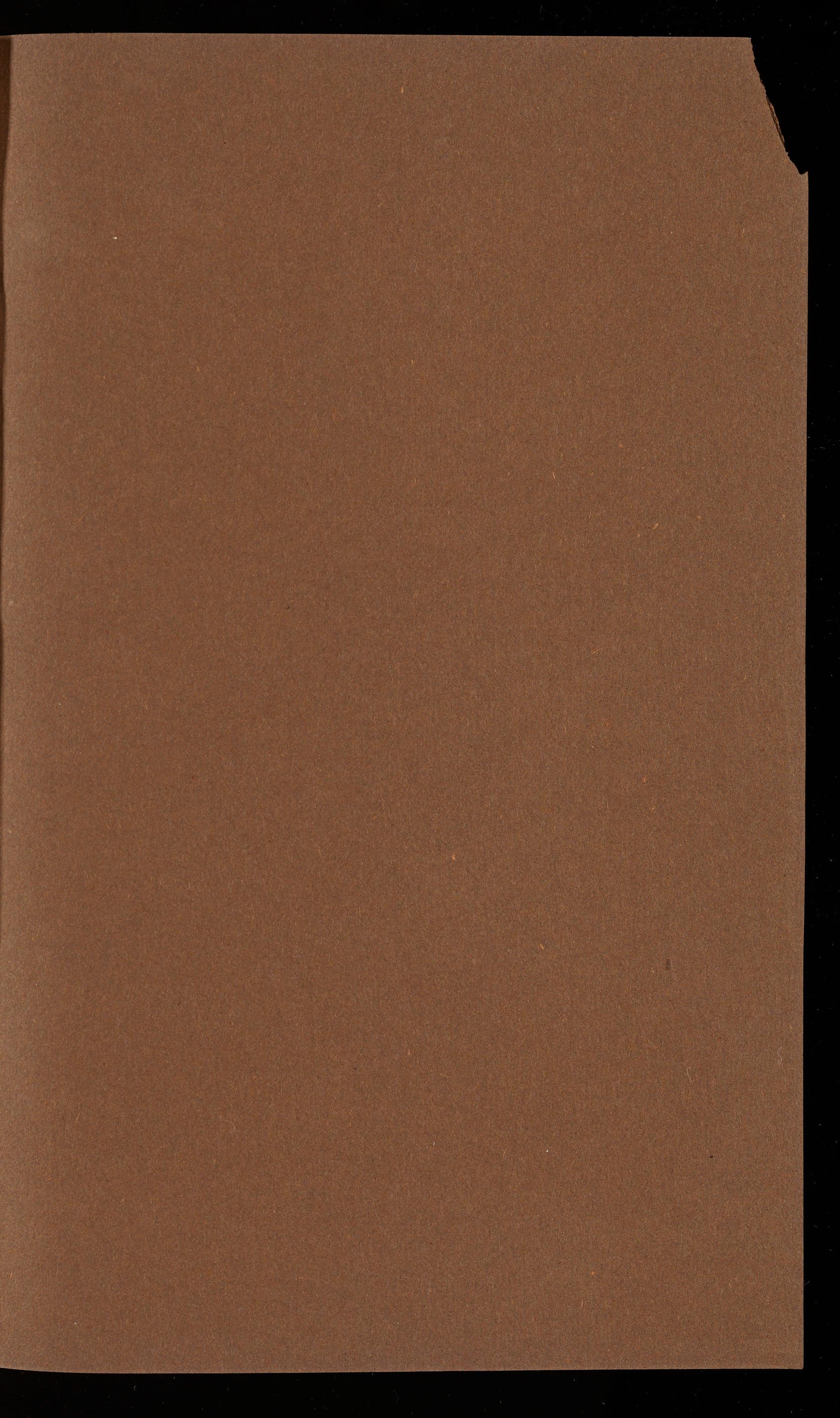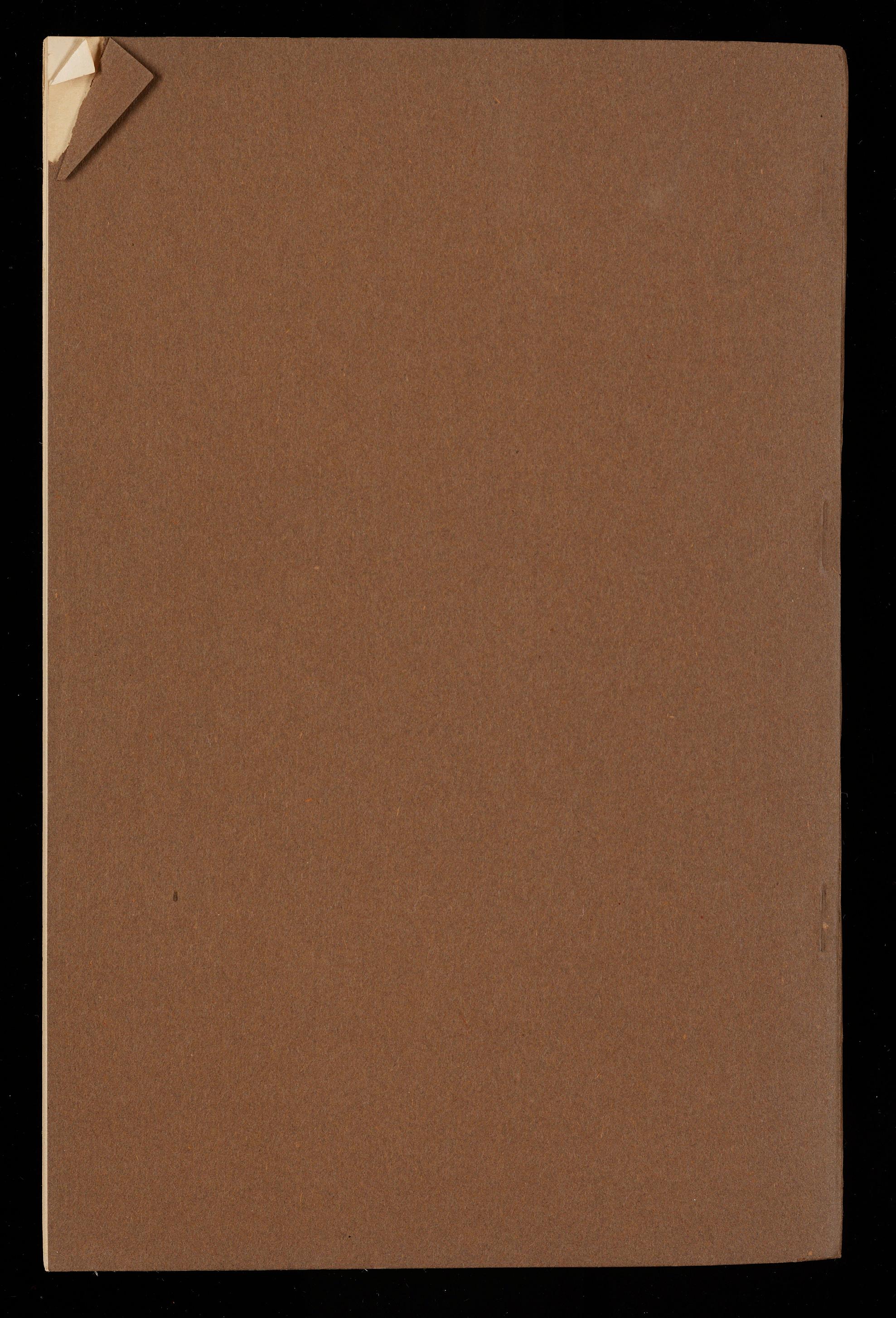Richmond College Bulletin
CA TA LOGUE NUMBER
VOL. XI. .JULY, 1909 NO. 1

l'HHl,ISHEI> QUARTRRI,Y
BNTEREJ) AT THE POST-OFFICE AT RICHMOND, VA , AS SECOND-CLASS MAIL MATTER
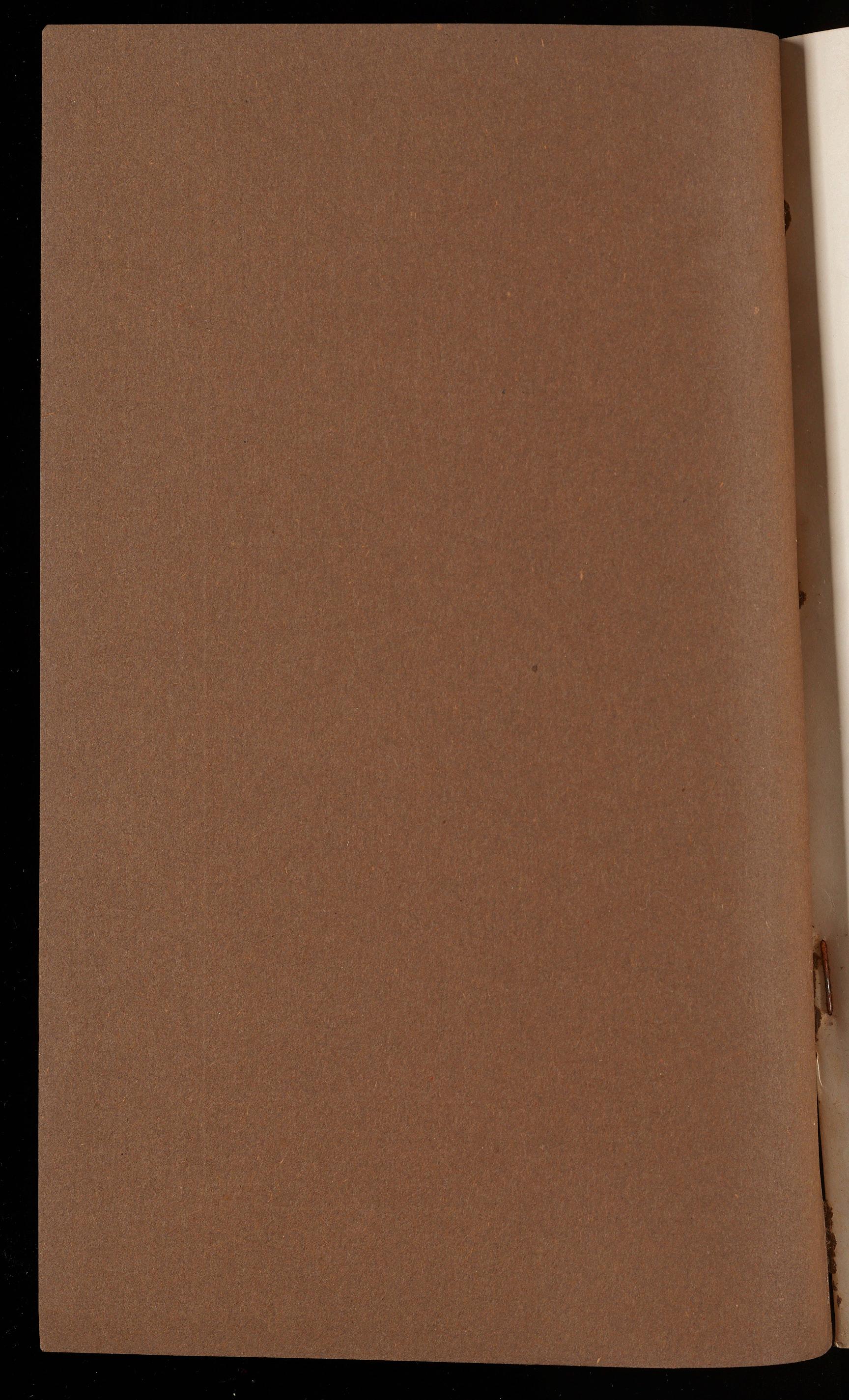
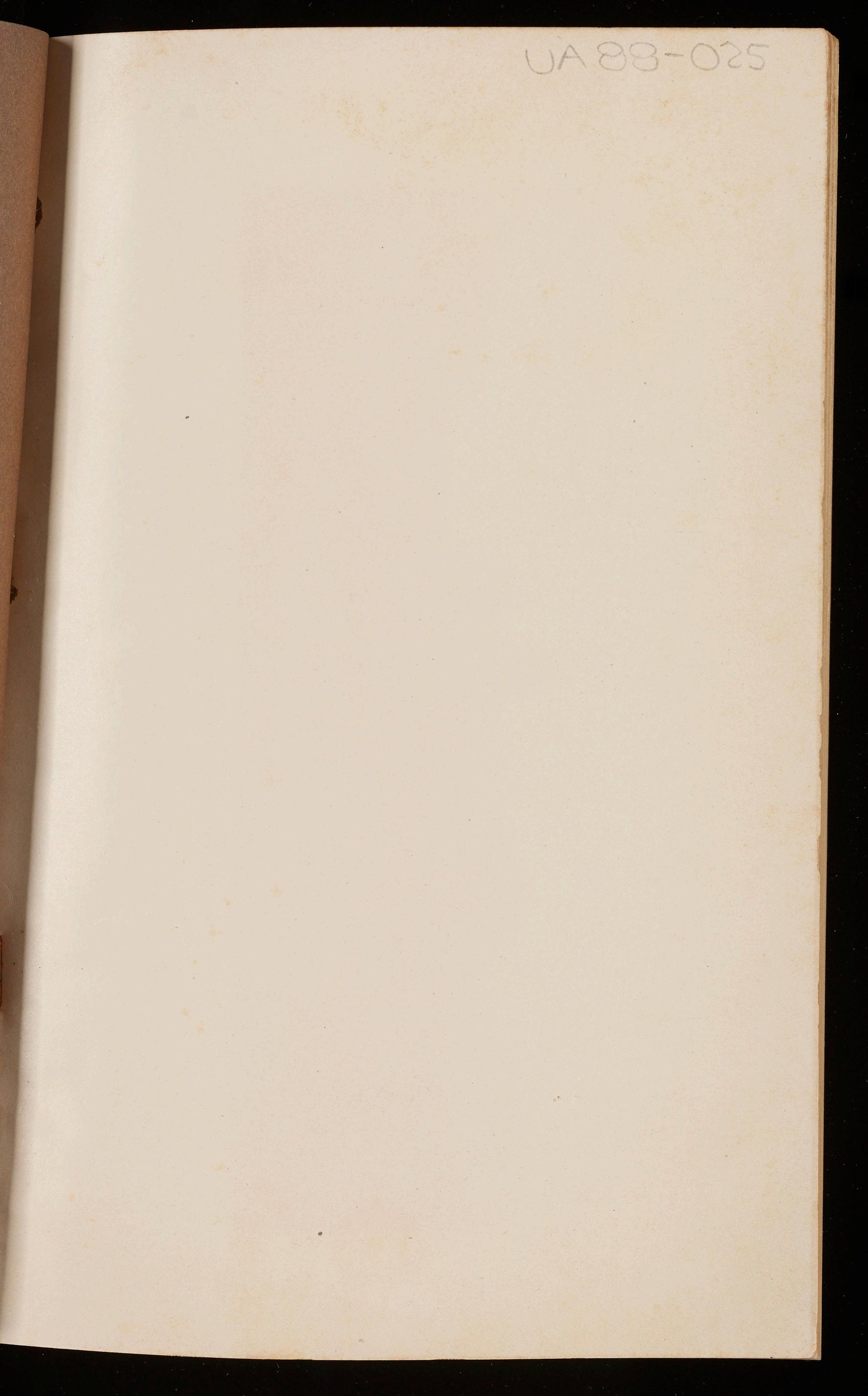
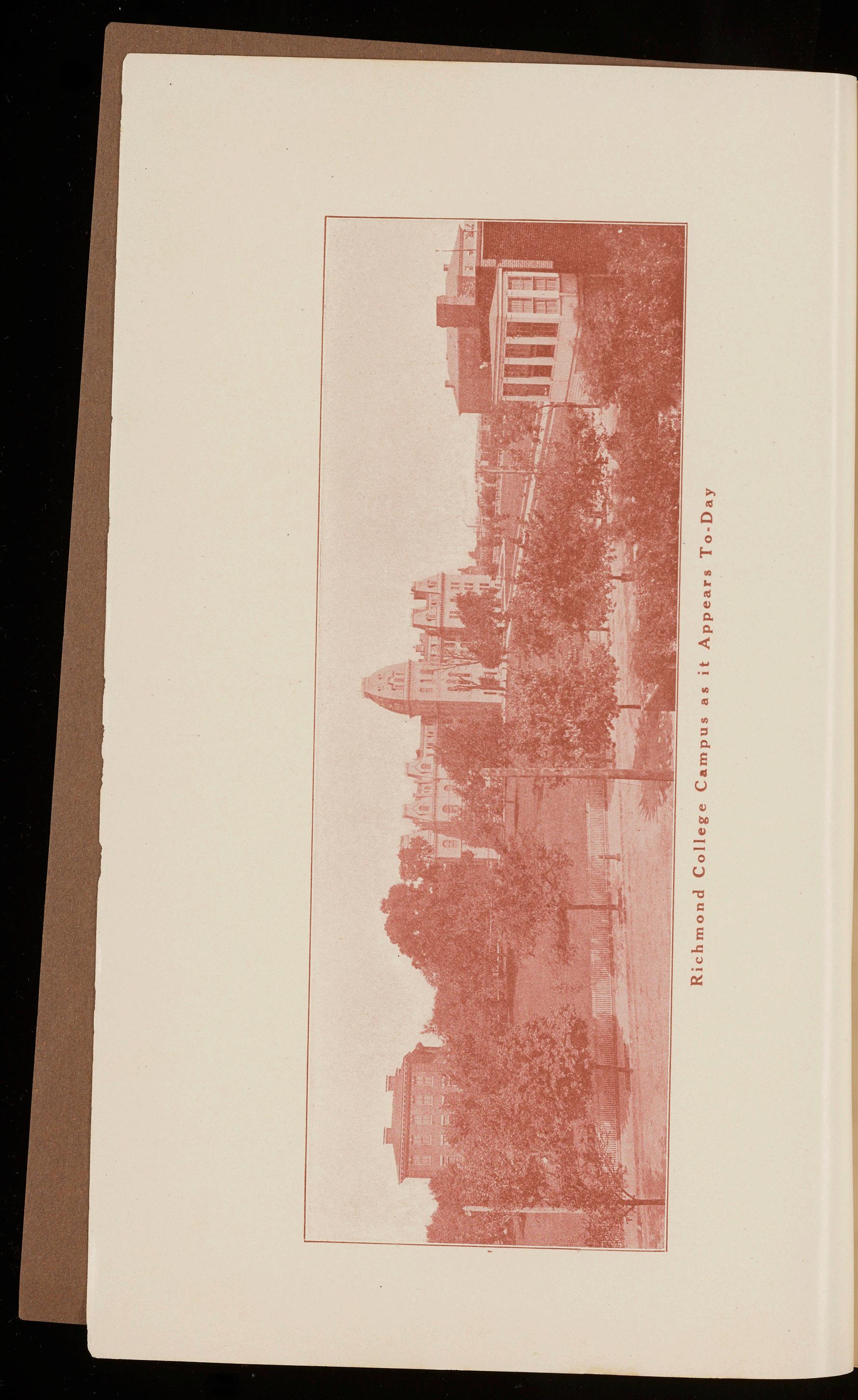

CA TA LOGUE NUMBER
VOL. XI. .JULY, 1909 NO. 1

l'HHl,ISHEI> QUARTRRI,Y
BNTEREJ) AT THE POST-OFFICE AT RICHMOND, VA , AS SECOND-CLASS MAIL MATTER



SESSION 1908-1909
n,,'th ./lnnouncemen/3 /or SESSION 1909-19 10

R ICHMOND, VA.
RICH MOND PRESS, Inc , PRINTERS 1909


1909-10.
1909-Thu rsday, September 23d.-Op ening of the session. Thu rsday, December 23rd.- Close of Fall Term.
1910.-M onday, January 3d-B eginning of Winter Term.
Sat urday, March 26th.-CJo se , of Winter Term.
Mo nday, March 28th.-B eginning of Spring Term.
Sun day, June 12th,- Commencement Sermon.
Mo nday, June 13th -Ex ercises of Graduating Class.
Tu esday, June 14th.-Annu al Meeting of Trustees.
We dnesday, June 15.- C lo sing Exercises.
'l'he Annual Sermon was preached Sunday, June 13th, by Rev. Cornelius Woelfkin, D. D., of Rochester, New York. Monday was Cla ss Day , The Class Orators were: W. R. D. Moncure an d J. B. Terrell; the Historians, D. N. Davidson and C. T. Morris . A. J. Chewning, Jr., presented to the College on beha lf of the Class of 1909, a handsome picture. The Annual Dinner of the Society of Alumni was held at Murphy's Hotel with the larg est attendance in the history of the Society. At the Reunion held at the College Tuesday evening, D. Wm. Gwin, A. B., D. D., LL. D., of Nashville, Tenn., spoke for th e Class of 1859; A. B. Rudd, M. A., D. D., of Porto Rico, for the Class of 1884; Rev. F. W. Moore, M. A., of Petersburg, Va., for the Class of 1899; and Douglas Freeman, B . A., Ph. D ., for the Class of 1904. On behalf of the family of Dr. Jones, Dr. Livius Lankford presented to the College an oil painting
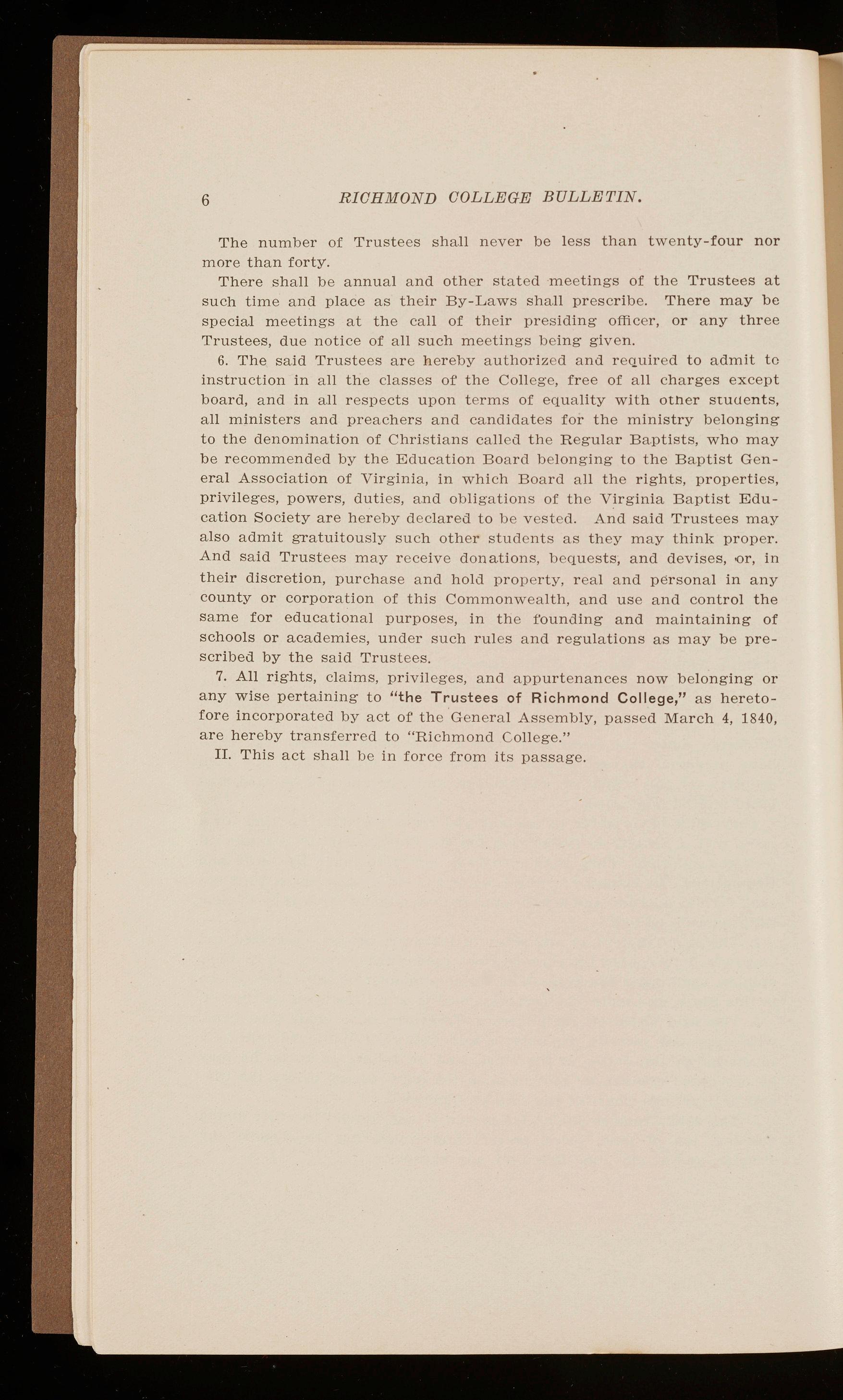
The number of Trustees sha.11 never be l ess than twenty-four nor more than forty.
Th e re shall be annual and other stated meetings of the Trustees at such time and place as their By-Laws shall prescribe. There may be special meetings at the call of their presiding officer, or any three Trustees, due notice of all such meetings being given.
6. The said Trustees are hereby authorized and required to admit tc instruction in all the classes of the College, free of a ll charges except board, and in a.11 respects upon terms of equality with other stuuents, all ministers and preachers and candidates for the ministry belonging to the denomination of Christians called the Regular Ba ptists, who may be recommended by the Education Board belonging to the Baptist General Association of Virginia, in which Board all the rights, properties, privileges, powers, duties, a.nd obligations of the Virginia Baptist Education Society are hereby declared to be vested. And said Trustees may also admit gratuitously such other students as they may think proper. And said Trustees may receive donations, bequests, and devises, ,or, in their discretion, purchase and hold property, real and personal in any county or corporation of this Commonwealth, and use and cont rol the same for educational purposes, in the founding and maintaining of schools or academies, under such rules and regulations as may be prescribed by the said Trustees.
7. All rights, cl aims, privileges, and appurtenances now belonging or any wise perta.ining to "the Trustees of Richmond College," as heretofore incorporat ed by act of the General Assembly, passed March 4, 1840, are her eby transferred to "Richmond Co ll ege ."
II. This act shall be in force from its passage.

During the session just closed Richmond College, co-operating wit h the Virginia Baptist Education Commission, completed a subscription of $350,000 to meet a conditional subscription of $150,000 from the General Education Board of New York. These subscriptions are payab l e in five equal annual installments, and the first $100,000 has been paid in cash. Of the total sum, $400.000 is to be used for the permanent endowment of the colleges for men and for women, and $100.000 is to be spent on bu il dings for the new vVoman's Co ll ege. The value of t h e property and endowment of Richmond College already exc~eded a m illion dollars, and this new endowment will enable the greater college to do a far wider worl, in the field of Christian education. More than ten thousand persons contributed to the new fund.
No one should suppose that the successful completion of the Woman's College and Endowmenl Fund satisfies the needs of Richmond Co ll ege and the new Woman's College. A very large proportion of the new fund must be used for the "\Voman's College, which is to be placea on an equal footing with the college for men. Among the needs that are urgent are endowments for a professorship of Biology, a chair of HisLory, a professorship of Education, and a professorship of Political Science and Economics Each of these four professorships should have an endowment of $50,000. Among buildings that are needed are a gymnasium to cost $40,000, and a Y. M. C. A. building, at $25,000. A home for the religious, social, activities of the students is urgently needed.
It should never be forgotten that a growing institution is a lways in need of money tor endowment, for buildings and equipment, and for student aid funds. These necessities of growth provide the opportunity for those unsP. l fish friends of Christian education who can not make large donations duFing their lifetime. They can not talrn the ir capita l from their business without crippling their living. At the same time their hearts burn with large desires and they cherish the thought that as they come to the end of life they will devote tlrnir substance entirely, or in part, to Ch ristian education. There are many names which the friends of Richmond Co ll ege a l ways utter with gratitude and affectionthose who in dyirig remembered the College and gave of the ir for tu ne for its upbuilding. The i r names are forever identified with the Co ll ege, and will not be forgotten. Let not the trustees of God's gifts forget to handle them carefu ll y for the good of humanity and for the glory of Goel.
"I give and dev i se to Richmond College, l ocated at Richmo n d, Va., the fo ll owing real estate-to-wit (here describe the said rea l estate as to kind, quantity, and situation).
"I a l so give and bequeath to the said College the sum of .......... •. dollars ($-----), and the following bonds (or stocks)-to - w it (he r e desc r ibe t he bonds or stocks), all of which are to be used for the following purposes-to-wit (here describe the purpose for which it shall be applied)."
LIEUTENANT-GOVERNOR J. TAYLOR ELLYSON, President.
A. W. PATTERSON, Esq., Vice-President.
Recording Secretary, Financial Secretary and Treasurer.
Major A. R. Courtney Ri c hmond
W. E. Hatcher, LL. D., For!, Union
C. H. Ryland, D. D Richmond
H. Wythe Davis, M. D Ri chmond
I. B. Lake, D. D Upp e rvill e
Geo. B. Steel, D. D. S , Richmond
Judge W. R. Barksdal .e .. Hou s ton
T. S. Dunaway, D D., Fr e d e r'ksb ' g
Mr. C. V. Meredith ..... . Ri c hmond
Prof. George Swann . Dan v ill e
Mr. Conway R. Sands Richmond
John R. Bagby, D. D.... . Ba.lls v ille
John M. Pilcher, D. D Burk e vill e ,
Mr J. J. Montague Ri c hmond
Mr. T. C. Williams, Jr., Richmond
Mr. T. H. Ellett Richmond
Mr. John T. Griffin Portsmouth
Mr. J. T. Ellyson Richmond
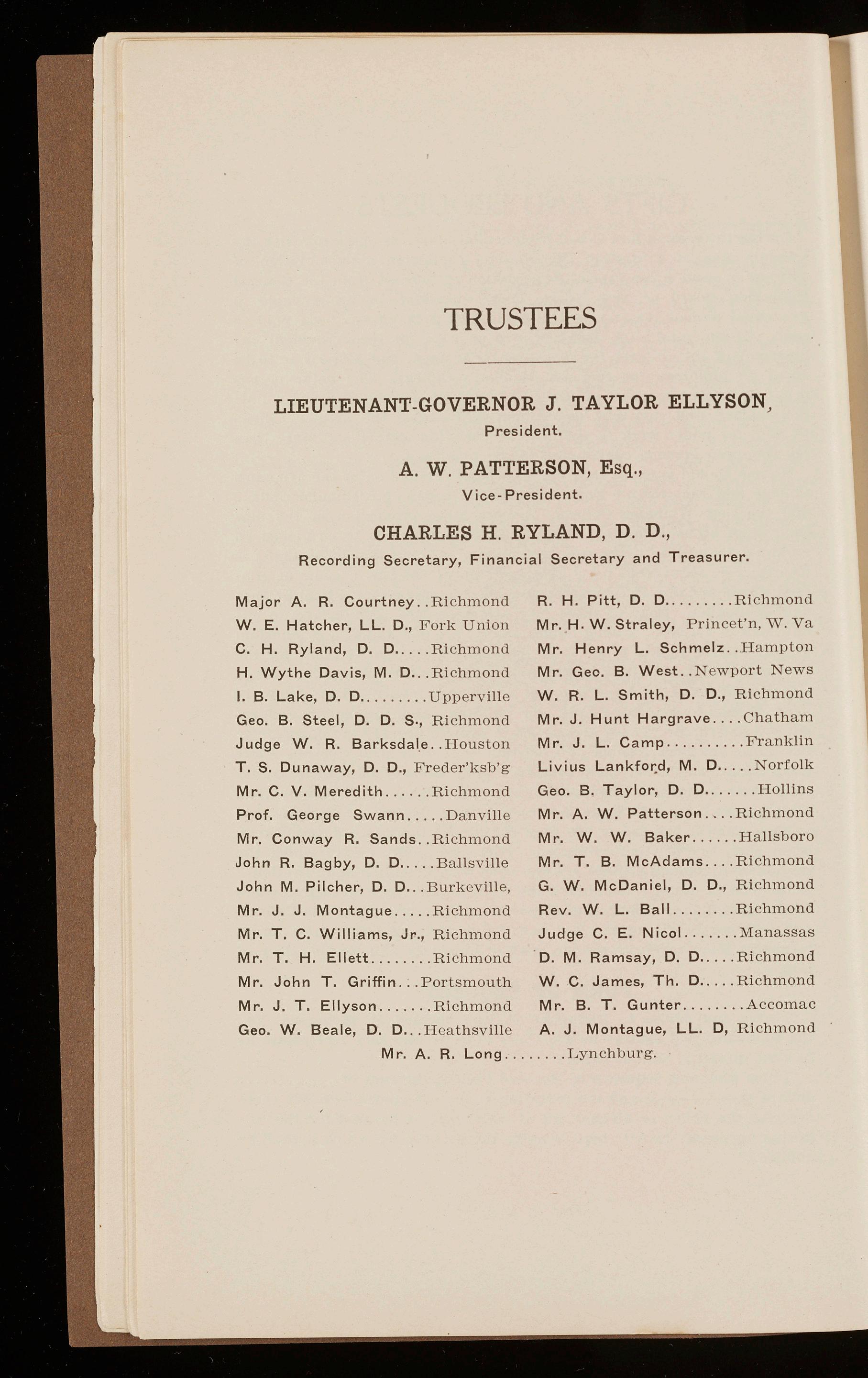
R. H. Pitt, D D.. Ri c hmond
Mr. H. W. Straley, Princ e t ' n , W. V a
Mr. Henry L. Schmelz H a mpton
Mr. Geo. B. West. N e wport News
W. R. L. Smith, D. D., Richmond
Mr. J. Hunt Hargrave Ch a th a m
Mr. J. L. Camp Fr a nklin
Livius Lankfor;d, M. D Norfolk
Geo. B, Taylor, D. D .. . .. .. Hollins
Mr. A. W. Patterson " Richmond
Mr. W. W. Baker Hallsboro
Mr. T. 8. McAdams .. Richmond
G. W. McDaniel, D. D., Richmond
Rev. W. L. Ball. Richmond
Judge C. E. Nicol Manassa s D. M. Ramsay, D. D .. .. . Richmond
W. C. James, Th. D..... Richmond
Mr. B. T. Gunter Accomac
Geo. W. Beale, D. D H e athsville A. J. Montague, LL. D, Richmond
Mr. A. R. Long . L y nchburg.

lnstructi on.- G. \V. l\1cDaniPI, J.M. Pilcher, 'iV. L. Ball, D. M. R amsay, "\V. R. L. Smith.
Law School.- A. "\V. Patterson, 'l'. C. "\\' illia.ms, Jr., C. V. Meredith, B. T. Gunter, A. R. Long.
Library.-,v. R. L. Smith, D. M. Ramsay, George B. Steel, Professors Metcalf and Bingham.
Fi nance.-T. C. Williams, Jr ., T. I-I. Ellett, A. VV. Patterson, 'l'. n. McAdams, I-I L. Schmelz, J. 'l'. Griffin, J. L. Camp.
Gr ounds and Buildings . - J J. Montague, 'iV. ,V. Baker, "\V. C. James, "\V. L. Ball, A . J. Montague.
Aid Funds - (Scholarships and Donations) -vV. E. I-Ia"tcher, R. H. Pitt, J. M. Pilcher, G. "\V. McDaniel, A. R. Long.
Endow ment.- I-I. "\V. Straley, G B. ,V est, "\V. ,V. Baker, J. I-I. Hargrave, J. T. Griffin.
Academies.-W. R. Barksdale, C. E. Nicol, Geo. Swann, Livius Lankford, Geo. Braxton Taylor
Nomination of New Trustees.- W. C. James, A. "\V. Patterson, T. S. Dunaway, J. H. Hargrave, H. "\V. Davis.
Nominations for Honorary Degrees.- G. "\V. Beale, I. B. Lake, A. J. Montague, R. E. Gaines.
New Site . - G. ,V. McDaniel, T. B. McAdams, J. J. Montague, A. vV. Patterson, T. H. Ellett, R. I-I. Pitt, Henry Schmelz, C. E. Nicol.
The By-Laws provide that the President of th e Truste es and the Financial Secretary shall be members of a ll the above committees, and have equal privileges with other members; and that the President of the College shall be ex-officio a member or all excep t Nomination of New Trustees.
Richmond Academy - R. II. Pitt, T. B. McAdams, J. J. Montague, T. H . Ellett, F. W Boatwright.
Newport News Academy.- Gcorge B. ,V est, Henry L. Schmelz, Maryus Jone s, W. E. Barrett, T. J. Simms, VV. M. Parker, F. vV. Boatwright.
Campaign for Woman's College and Endowment Fund.- F. ,V. Boatwright, J. 'l'aylor Ellyson, C H. Ryland, A . ,v. Patterson, Vv. W. Baker, W. E. Hatcher,-W. C. Jam es.

FREDERICK WILLIAM BOATWRIGHT, President
CHARLES HENRY WINSTON, M. A., LL. D., Emeritus Professor of Phy s ics and Professor of Astronomy .
A. B. Hampd"n-Sidnoy, 1854; M.A. University of Virginia, 1 857; LL. D. Hampden-Sidney, 1883; Assistant Professor, Hampden-Sidney, 1854-'55; Professor Trans y l vania University, 1857-'58; President Richmond Fema l e In stitute, 1859-'73; Professor of Physics, 1873-1908; Prof esso r of As tron omy since 1873.
FREDERICK WILLIAM BOATWRIGHT, M. A. , LL. D., Professor of French and German.
M A. Richmond Co ll ege, 1888; LL. D. Mercer U ni ve r s it y, 1 895; Assistant in Gree!,, Richmond College, 1887-'89; Stud e nt University of Halle and the Sorbonne, 1889-'90; Professor of French a nd German since 1890; Stud e nt University of Leipsig, 1 892; President since 1 894 .
ROBERT EDWIN GAINES, M. A., Litt. D., Professor of Mathematics.
M. A. Furman University; Litt. D. Furman University, 190 8; Instru c tor in Furman University, 1886-'87; Student Johns Hopkins University, 1887-'88; Instructor in Wright's Univenity School, Baltimo re, 1888-'9; Harvard University, 1899 -1900 ; Professor of Mat h ema ti cs since 1 89 0
WILLIAM ASBURY HARRIS , M. A. Ph. D., Professor of Greek La_nguage and Literature.
M A. Richmond College, 1886; Ph. D. Johns Hopkins University, 1892; Prof esso r of Greek, Baylor University, 1893-1901; Professor of Greek since 1901.
WILLIAM HETH WHITSITT, M. A., D. D. , LL. D., Professor of James Thomas, Jr. , Sch -ool of Philosophy.
M A. Union University, 1 861; Professor Sou th e rn Baptist Theological Seminary , 1 872 -'9 5; President of same, 1 895-'99; Professor of Philosoph y on the J a m es Thomas Jr . Foundation since 1901.

RICHMOND COLLEGE BULLETIN. 11
JOHN CALVIN METCALF, M. A., Professor of English Language and Literature.
M .A. Georgetown College, 1888; M.A. Harvard University, 1905; Professor of Latin and Eng li sh, Soule College, 1889-'94; Professor of Modern Languages, Mercer University, 1894-'95; Professor of Latin, Georgetown Co ll ege, 1895-'98, and of English in same 1898-1904; Instructor in Un iversity of C hi cago, 1897; Professor of English Language and Literature since 1904.
ERNEST MAYO LONG, LL. B. , Associate Professor of Law.
B. L. Richmond College, 1894; LL. B. Yale University, 1896; Associate Professor of Law since 1898.
WAL'I'ER SCOTT McNEILL, B. A., Ph.D., LL. B., Professor of Law.
B. A. Richmond College, 1899; Ph. D. University of' Berlin, 1902; LL. B. Harvard University, 1905; Associate Professor of Law, 1905-1909. Professor of Law since 1909.
ROBERT A. STEWART, M. A., Ph. D., Associate Professor of Modern Languages.
M. A. University of Virginia, 1899; Ph. D. University of Virginia, 1901 ; Professor of Modern Languages, ·wofford College, 1899-1900; Instructor 'l'eutonic Languages, University of Virginia, 1900-'01; Assistant Prof'essor of Modern Languages, '.ru l ane University, 1901' 02; Associate Professor since 1903.
CHRISTOPHER B. GARNETT, M. A., B. L,, Associate Professor of Law
B. A. and M. A. University of Virginia, 1898; Teacher Bellevue High School, 1898-1900; Dean of Woman's College of Richmond a nd Professor of History, 1902-'06; Assoc i ate Editor Virginia Law Register and Joint-Editor of vVaddey's Gu id e to Magistrates; Associate Professor of Law since 1906.
EUGENE COOK BINGHAM, Ph. D., Professor of Chemistry and Geology.
A. B. Middlebury College, 1900; Ph. D. Johns Hopkins University, 1905; Student of Universities of Leipsig and Ber lin , 1906; Professor of Chemistry a.nd Geology since 1906.
ROBERT EDWARD LOVING, M. A., Ph. D., Professor of Physics.
M. A Richmond College, 1898; Ph. D. Johns Hopkins University, 1904 ; Professor of Physics and Chemistry, B la ckburn Co ll ege, 1904-'06; Professor of Physics, Cornell College, 1906-'07; Associate in Physics, University of Missouri, 1907-'08; Prof'essor of Physics since 1908.
12
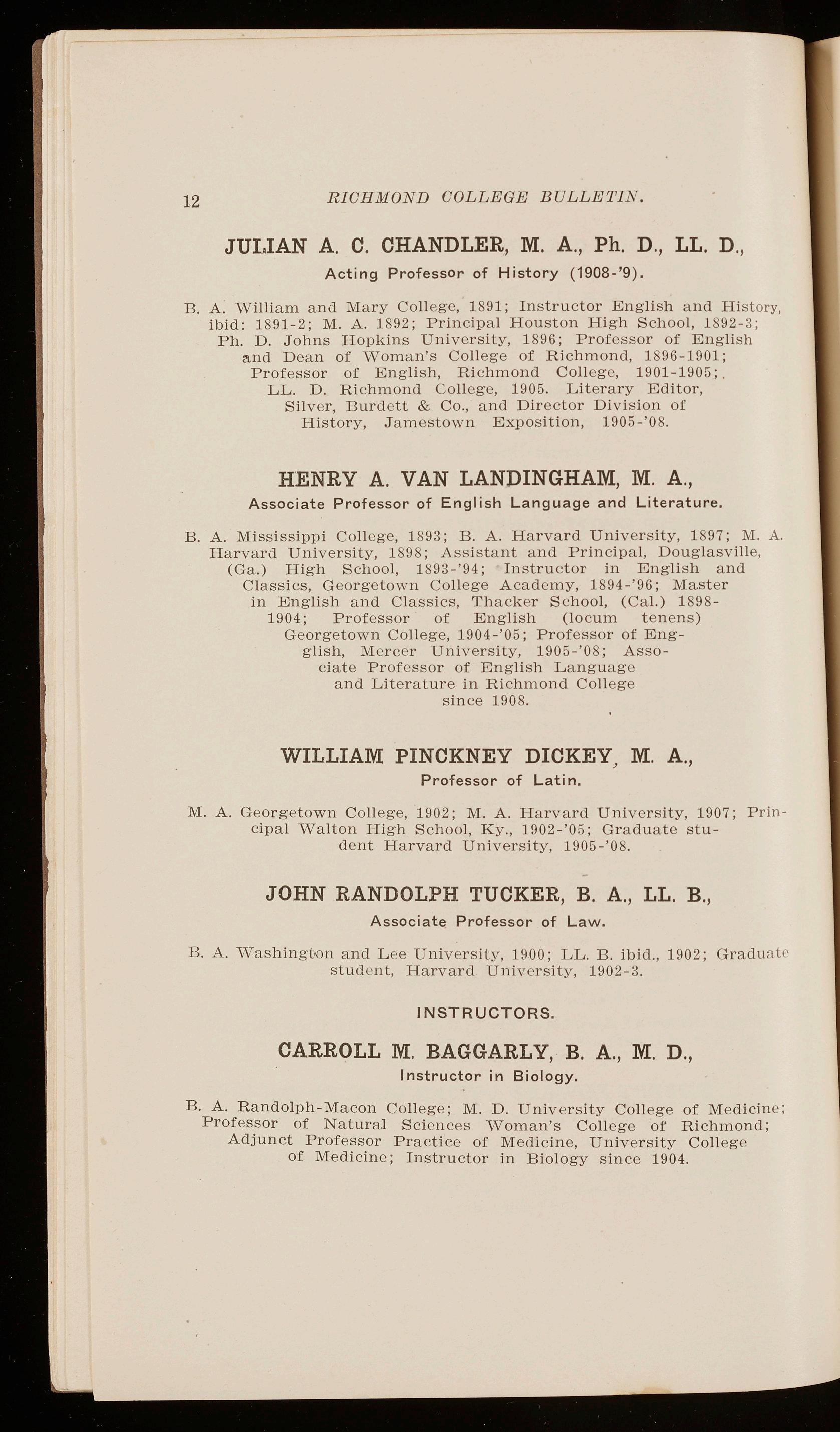
RICHMOND COLLEGE BULLE'l'IN.
JULIAN A. 0. CHANDLER, M. A ., Ph. D., LL. D. , Acting Professor of History (1908-'9).
B. A. William and Mar y College, 189 1; Instructor English and Hist ory , ibid: 1891-2; M. A 1892 ; Princip a l Houston High Schoo l , 1892-3; Ph. D. Johns Hopkins University, 1 896 ; Professor of English and Dean of woman 's Co ll ege of Richmond, 1896 - 1901; Professor of English, Richmond Coll ege, 1901-1905; LL. D. Richmond College, 1905. Literary Ed it or, Silver, Burdett & Co., and Dire c tor Division of History, J amestown Exposition, 1905-'0 8.
HENRY A. VAN LANDINGHAM, M. A., Associate Professor of English Language and Literature.
B. A Mississipp i Co ll ege, 1893; B. A. Harvard University, 1897; M A. Harvard University, 1 898; Assistant and Principa l , Doug l asville , (Ga.) High School, 1893-'9 4; Instructor in English and C lassics, George to wn College Academy, 1894-'96; Mas t e r in E n glish and C lassics, Th ac k er School, (Cal.) 189 81904; Professor of Eng li sh (lo cum tenens) Georgetown College, 1904- ' 05; Prof esso r of Engglish, Mercer University, 1905-'08; Associate Prof esso r of Engl i s h Languag e and Literatu r e in Ri c hmond College s in ce 1908.
WILLIAM PINCKNEY DICKEY , M. A., Professor of Latin.
M. A. Georgetow n Colleg e, 1902; M A. Harva rd Univ e rsity , 1907; Principa l Walton H igh Schoo l , Ky., 1902- ' 05; Graduate student Harvard Un iversi t y, 1905-'08
JOHN RANDOLPH TUCKER, B. A., LL. B., Associate Professor of Law
B. A. , Vashingt,on and Lee University, 1900; LL. B. ib id. , 1902; Graduat e s tud e nt , Harvard University, 1902 -3.
CARROLL M. BAGGARLY, B. A., M. D., Instructor in Biology.
B. A. Randolph-Macon Co ll ege; M. D. Un i vers it y College of Medicin e; Professor of Na tur a l Sc i e nces vVoman's College of Richmond; Adjunct Professor Practice of Medicine, U ni ve r sity College of Medicine; Instructor in B iol ogy s in ce 1904.

RICHMOND COLLEGE BULLETIN. 13
FRANK Z. BROWN, S. B. E. E., Instructor in Drawing.
B. S. V ir g inia Military Institute, 1900; S. B. E. E. Massachusetts Institute of Tec hnology, 1903; Instructor in Physics and Electricity Virgin ia Me c hanics Institute since 1903; Instructor i n Drawing sinc e 1904.
ELVIN S. LIGON, M. A., Instructor in Mathematics, 1908-'09.
M A. R i c hmond Coll e ge-, 1 8 99; Gradu a te stud e nt Univ e rsity of Chicago; Pri n c ip a l N e wport New,:; Academy, 1902-'07; •reacher of Mathematics Richmond Acad e my since 1907.
ROBERT C. ANCARROW, Laboratory Assistant in Chemistry.
THE LIBRARY AND MUSEUM.
CHARLES HILL RYLAND, D. D., Librarian and Curator.
ATHLETICS.
EDWARD A. DUNLOP, B. A., LL. B., Director of Athletics.
THOMAS W. OZLIN, B. A., LL. B., Instructor in the Gymnasium, 1908-'09.
J.B. SMITH, Superintendent of Grounds · and Buildings.
.
Courses and Degrees.-Prof essors Gaines, M e tcalf and Loving. Athletics. - Prof e ssors Dickey, Harris, and McNe il!. Fraterni ties . - Professors Stew a rt, Loving and Bingham. Public Lectures.-P rofessors Whit s itt, vVinston and Bingham. Student Life.-Pr of e ssors MetcaH, VanLand in gham and Harris. Studen t Pub Iications.-Pro f e ssors VanLandingham, Diclrny and St e wart. Student Appoi ntments.-Pr otessors Harris, Gaines and Garnett. T h e President is ex-officio member of all committees.
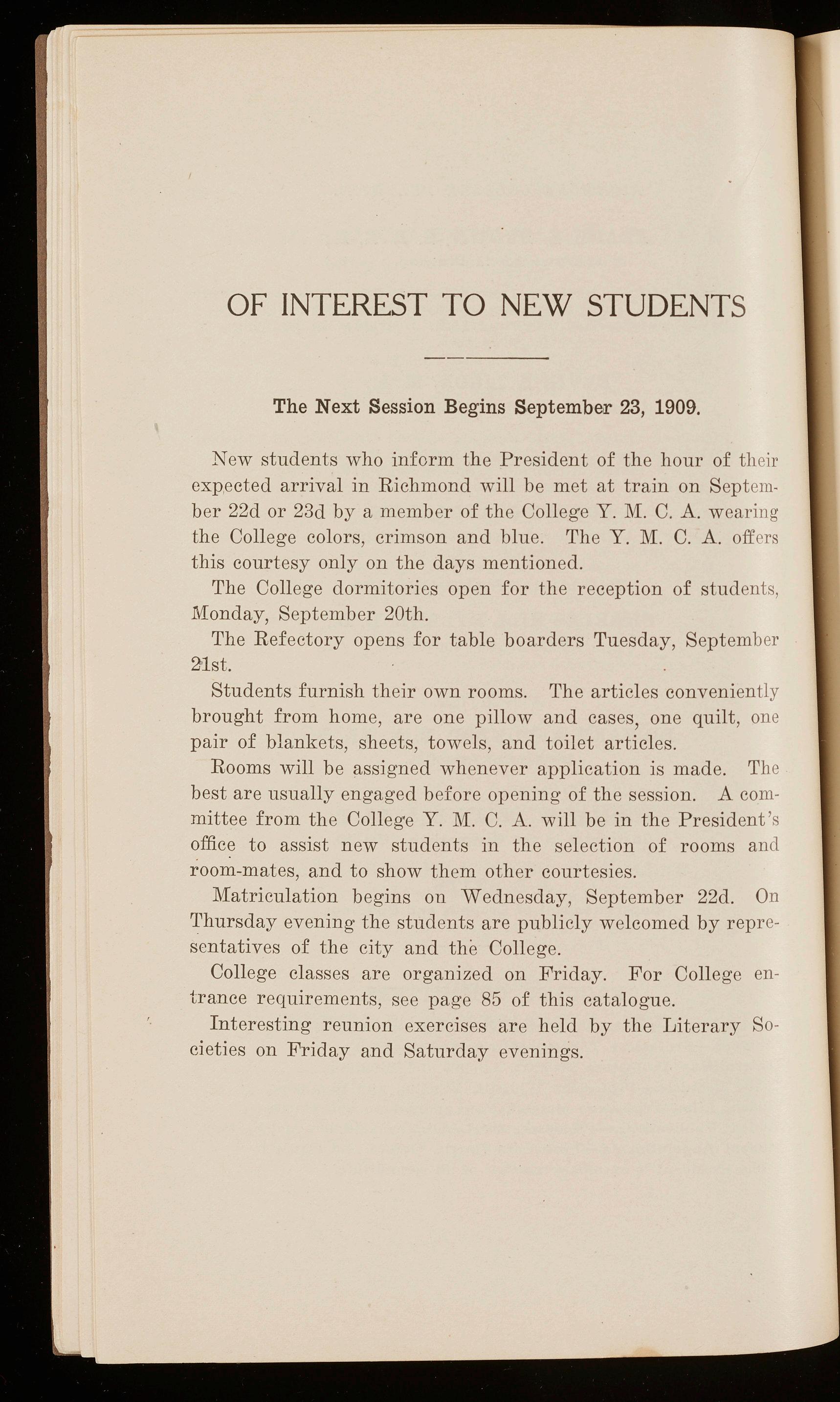
The Next Session Begins September 23, 1909.
New students who inform the President of the hour of th eir expected arrival in Richmond will be met at train on Sept ember 22d or 23d by a member of the College Y. M. C. A. wear ing the College colors , crimson and blue. The Y. M. C. A. offers this courtesy only on the days mentioned.
The Coll ege dormitories open for the r eception of stud ents , Monday, Septemb er 20th.
The Refectory opens for table boarders Tuesday, Sept ember ~1st.
Students furnish th eir own rooms. The articl es convenien tly brought from hom e, are one pillow and cas es, one quilt , one pair of blankets , sheets, towels, and toilet articles.
Rooms will be assigned whenever application is made. The best are usually engaged b efore opening of the session. A committee from th e College Y. M. C. A. will be in the Presiden t's office to assist new stud ents in the sel ection of rooms and room-mates, and to show th em oth er courtesies.
Matriculation begins on Wedn esday , S ept ember 22d. On 'l'hursday evening the students are publi cly welcomed by rep resentatives of the city and the College.
College classes are organized on Friday. For College entrance requirements, see page 85 of this catalogue.
Interesting reunion exercises are held by the Literary Societies on Friday and Saturday evenings.

CLASS OF 1909.
AREN DALL, CHARLES BAKER .......... Richmond, Va.
BROWN , MATTIE LOUISE ............... ......... Richmond, Va
CLARK, KENLEY JESSE ...... ......... Chest e rfi e ld County, Va.
DAVID SON, DA YID NA THANIEL ... .. Appomattox County, Va.
HAND Y , HENRY BRANTLY . Maryland.
HARR IS , FRANCIS LINWOOD . ............... N e w Kent County, Va.
HARR ISON, JULIA PEACHY ........... Richmond, Va.
HILL, JOHN BUNYAN .............. .. ... . ... . ... Halifax County, Va.
LEWI S, PEYTON STARK .... Richmond, Va.
McBA I N, WILLARD PAYSON Richmond, Va.
MONCU RE, WALTER RALEIGH DA N IEL Richmond, Va.
OZLIN , THOMAS WILLIAM .................. Lunenburg County, Va.
PETE RS, JOHN BRANDON .......... - · Petersburg, Va.
PETE RS, THOMPSON EDWARD West Virginia.
RHO DES, BEECHER LEE ............. .... Isle of Wight County, Va.
RYDE R, OSCAR BAXTER ............... Richmond, Va.
SMIT H, WILLIAM ROBERT LEE, JR Richmond, Va.
SNE~ D , HARRY LAMONT .......... Fluvanna County, Va
SPEN CER, ROSCOE ....... King William County, Va.
STIN SON, JOHN TAYLOR ... Cumberland County, Va.
STR I N GFELLOW, JAMES LA WREN CE ....... Culpeper County, Va.
TRE VVETT, LILY FRANCES Henrico County, Va.
WIL LIS, ROBERT GRANT ........... Richmond, Va.
YEUN G, AH FONG China
C L ASS OF 1910.
ACK ISS , ERNEST LEE ............. Princess Anne County, Va. AN CARROW, ROBERT CLAIBORNE ..... Richmond, Va.
BAN NER, ROY ROSCOE Wise County, Va.
BA RBE, JOHN GLENN Washington County, Va.
BEA ZLEY, JAMES HENRY ...... ...... Caroline County, Va. BE VERLY, WILLIAM ROBERT Richmond, va:
BLA CK, WILLIAM MADISON Rocl,bridge County, Va.
BO WLING, ROBERT Nelson County, Va.
BRO CK, ROBERT ALONZO, JR .• Richmond, Va.
COF FEE, FRANCES FOLSOME .. . , . , , ... Richmond, V:.i.
16

RICHMOND COLLEGE BULL,ETIN.
COLE, CLAY SPURGEON ......................... Sm y th County, Va
COLE, WILLIAM BENJAMIN FRANKLIN ........ Fredericksburg, Va.
ELLYSON, STILES HUOT Richmond, Va
FROST, VIRGINIUS CARLYLE Tenn essee. GARLAND, GREGORY GRAY Richmond, Va.
GARY, CLARA MILES ............... Richmond, Va. GILL, SPENCER GLAS ............. Petersburg, Va. GULICK, JOSEPH FRANKLIN Prince William Co unty, Va. HAISLIP, WALTER BROADDUS, JR Patrick County, Va.
HUBBARD, NOLAND .................................... Danville, Va. JENNINGS, HENRY BEASLEY, JR .......... Appomattox County, Va. LOUTHAN, FRANK GARRETT .................. Clarke County, Va. MOFFETT, DANIEL BRUCE ............................ Roanolrn, Va. MONTAGUE, MARY WORTLEY Richmond, Va. PANKEY, GEORGE ROBERT . ....... Appomattox County, Va. POWELL, "WILLIAM HENRY Accomac Count y, Va RAAB, MERRIILL ,E MANUE)L Richmond , V a.
RANSONE, ALBERT THOMAS, JR ....... Hampton, V a.
RICHARDS, GERTRUDE ................. . ............. Norfolk, Va.
ROGERS, WILLIAM HOWARD .............. Pittsylvania County, V a.
SADLER, GEORGE WASHINGTON ................ Essex County, Va. SINTON, ARTHUR CLAYTON, JR RichmonJ, Va.
TERRY, JAMES HENRY Appomattox County, V a.
WARE, VIRGINIA IRVING Richmond, V a.
CLAS S OF 1911.
BAILEY, HERMAN ........ Campbell County, V a. BASS, ARCHER BRYAN Campbell County, V a. BELFORT, EDMUNDO Brazi l. BEVERLY, WALTER ,Vise County, Va
BOYLE, MARSHALL LEVIS, JR ........ . ........... ... Richmond, Va .
CALDWELL, STEPHEN ADOLPHUS ...................... Louisian a. CAMDEN, AUBREY HEYDEN .. . Bedford County, Va. CAMPBELL, VIRGINIA EPPES ............... ....... Richmond, Va
COCHRAN, THOMAS EVERETTE Kentucky CROXTON, THOMAS WADE .. .... Essex County, Va CRUMP, EDMUND MICHAUX ........................ Richmond, Va. DURRUM, TERRY COLLEY ... Appomattox County, Va
EDMONDS, ALFRED BENJAMIN GUNTER ...... Accomac County, Va. FLEET, ROBERT HILL .King and Queen County, V a.
GILLIAM, LEONARD STATHAM .... Appomattox County, Va HALL, LUCIEN TALMAGE ....... Newport News, Va. HUBBELL, PAUL EDGAR ......... Charlotte County, Va
JENKINS, WILLIAM HERNDON .............. . . Loudoun County, Va .
JJ;NKINS, MARY EMILY ............... . Hanover County, Va. KING, JOHN ELWOOD .... , Henrico County, Va
LANKFORD, ARTHUR , . , Norfolk, Va
RICHMOND COLLEGE BULLETIN. 17
LODGE , SYDNEY JOHNSON Maryland. LODGE, WELLING MON'.rAGUE ........... South Caroli n a.
LYK CH, ARUNAH OTTO .........

Norfoll, County, Va.
ThIEADE, MARSHALL '.rI-IOMAS Dickenson County, Va.
ORCHA RD, PAUL WHITESTINE Richmond, Va.
OUTLAN D , GROVER CLEVELAND Isle of" Wight County, Va.
PE ARCE, PAULINE .................... .............. Richmond, Va.
PHI LLIP S, CHARLES .... · · .............. ............ Richmond, Va.
POR TER, LEWIS GORDON ... • .. Richmond, Va.
ROBERT SON, ELISHA "WARREN .. .. ...... . ... Albemarle County, Va.
ROWE, JASON ELI ...... Southampton County, Va.
ROWLAN D, SAMUEL JEFFERSON .. ............... Richmond, Va.
SAVILLE, ROBERT LAMB ... .............. Richmond, Va. SCALES, NELLIE NOEL ............ Richmond, Va
SHUMA TE, ANDREW LINTSFIELD ................ Giles County, Va. SMI'rH, RUSSELL GORDON ................. Richmond, Va.
STR OTH ER, JAMES FRENCH Henrico County, Va.
SYDNOR , ELMER WILLIAMS ..... ...... Prince George County, Va.
SYDNO R , WILBURN BURTON .............. Richmond, Va.
TH OMA SSON. RUTH McGRUDER Richmond, Va.
U NDER WOOD, OSCAR WILDER, JR .. . .. . .. . ............... Alabama. VADEN, GILES HENRY, JR ............. Pittsylvania County, Va.
WI LKIN S, HENRY WILLIAM Pennsylvania.
W OODW ARD, PHIL TAYLOR Hampton, Va.
ANCAR ROW, EDWARD GRANGER .... •..... Richmond, Va.
ANDRE WS, MARCUS BOYLES ......... ; North Carolina.
ANKE RS, MALCOLM AUSTIN .................. Loudoun County, Va.
BAREF ORD, JOHN BUTTLER .. ........... Essex County, Va.
BENTO N, FRANK MA y ....... .............. Loudoun County, Va.
BLUM E, GEORGE WASHINGTON JONES, Pr i nce ·wmiam County, Va.
BR ADF ORD, GEORGE WASHINGTON .......... Fairfax County, Va. COOK , STERLING SMITH . Mecldenburg County, Va. COX, ELL KANIE Henry County, Va. DANN ER, HARRY TALBIRD, JR ................ . ..... South Carolina . DAVIS, WILLIAM HERSEY ........ ............. Norfolk County, Va.
DI ET Z, OWEN OSBURN .......................... West Virginia
ELLIS, PIERCE SARTONIUS ........ . ....... . ............. Maryland .
EZ EK IEL, EDWIN N Richmond, Va.
ES TE S, JOHN ROBERT Prine~ Edward County, Va
E UBAN K, CYRUS LEE ........................ Botetourt County, Va.
GARY , JULIAN VAUGHAN ............................ Richmond, Va.
GILLS , ROBERT TERRILL ......... Appomattox County, Va.
GRE E N , CLAUDE BELL ...... TennessPe.
GW A THMEY, EDWIN MOSELEY ....... Richmond, Va

18 RICHMOND COLLEGE BULLETIN.
HALL, WILLIAM THOMAS . ..... Danville, Va. HART, ALAN LINDSAY ................... , Richmond, Va.
HARWOOD, JOHN MAYNARD ...................... P e tersburg, Va. HAWKINS, ALLAN REESE .............. ........ South Carolin a. HURDLE, PAUL CHENY ....... ............ Norfollc County, Va.
JOHNSON, CORDIE NORFLEET .......... Southampton County, Va. JOHNSON, JOHN WALTER C .................... Louis a County, Va. JOHNSTON, JESSE W AL'l'ER ..... . ·.· ................. Tenn essee.
KILGORE, WILLARD STRATTON" \Yise County, Va. LA \'iTSON, CHARLES ICHOLAS Lancast e r County, V a. LECKY, WILLIAM PRESCOTT ...................... Richmond, V a. LOVELACE, JAMES PETER Franklin County, V a.
MILLHISER, EMANUEL ROSS ...... ...... Richmond, V a.
MONTGOMERY, ALFRED BAXTER .................... RichmonJ, V a. NORMENT, WILLIAM MEREDITH Richmond, Va. O'FLAHERTY, WILMER LOY .......... Shenandoah County, V a. O'NEILL, CHARLES THOMAS ................ Albemar l e County, V a.
PARKER, JOHN EDWARD Kanscmond County, V a. POWERS, THOMAS BROUN ........................... Richmond, V a. RICHARDS, MILTON VERNE N"orthampton County, Va. RYDER, OLLIE ALLISON ................... Richmond, Va. RYLAND, JOHN MUSCOE GARNETT Richmond, V a.
SAUNDERS, ALONZO WALTER .. .. ........ Southampton County, Va. SIMPSON, WILLIAM ALEXANDER ................... Richmond, Va. SMITH, GEORGE ELIJAH ............................ South Carolina. SNEAD, ELLIS POLLARD .................... Fluvanna County, Va. SNEAD, PAUL WINN .......................... Fluvanna County, Va. TAYLOR, HENRY MAGRUDER .... Henrico County, Va. TAYLOR, HENRY MARBURY ......................... Richmond, Va. THOMAS, ADRIAN .................................... Richmond, Va. TOWNSEND, WORTLEY W ARRE~ l\Iiddlesex County, Va. VANLANDINGHAM, HARRY SYLYANUS ................. Mississippi. WALTON, GEORGE CAMERON .................. Henrico County, Va. WARINNER, JUNIUS ERNEST, JR ........ .. Henrico County, Va. WEINSTEIN, ESTHER BERTHE Richmond, Va. WELFLEY, CONRAD ..................... Prince William County, Va. WELSH, JAMES ELWOOD ............................ Pennsylvania. WHITE, FRANK POINDEXTER ................ Augusta County, Va. WILKINSON, \VILLIAM MACK .............. Ches t erfie lJ County, Va. WILLIAMS, IRVINE ALEXANDER .................. Richmond, Va. WILSON, AUBREY BENNETT Lunenburg County, Va. WRIGHT, WESLEY, JR .......................... Caroline County, Va. YEAMAN, WILLIAM JOSEPH .................. Charlotte County, Va. YEUNG, AH PING ............................................ China. YOWELL, ALBON WAVER Rappahannock County, Va.

RIOHMOND COLLEGE BULLETIN. 19
UNCLASSIFIED STUDENTS.
ABBOT T, HASKELL THOM AS South Carolina.
ADA MSON, THOMAS DARNLEY Chesterfield County, Va.
AD LASKI, JAKE ... Richmond, Va.
ANG EL, ELLEN ALYAS ................ Manchester, Va.
BOL LING, THOMAS WINSTON ....................... Richmond, Va.
BOW IE, WILLING ................ . ............. Caroline County, Va.
BRI STOW, JOSHUA HUDSON .... South Carolina.
BRO OKS, CHARLES FAIR ........................... Richmond, Va.
BU RNETTE, ROBERT RUSSELL .......... . ..... Bedford County, Va.
CHA MBERS, MERRITT ALLEN, JR .................... Richmond, Va.
CH EWNING, CHARLES WEBB ................ Campbell County, Va.
CLA RKE, GEORGE STANLEY Richmond, Va.
COLE, CLAUDE MORRISS ............... ·: . Smyth County, Va.
COLE, JULIAN QUINCEY ............................. Richmond, Va.
CORLEY, FRANK WINSTON ............. ....... Richmond, Va.
COTT RELL, SAMUEL SMITH ........ Richmond, Va.
CRA FT, RYLAND GLENMORE Scott County, Va.
CRO SWELL, WILLIAM HATCHER, JR ............... Gloucester, Va.
DA LTON, HERBERT StCLAIR, JR ..................... Richmond, Va.
DA VIDSON, BROADUS MONROE .................... South Carolina.
DAV IS, HARRY HOLLAND ........................ Henry County, Va.
ELMO RE, JOHN MILTON ............................. Richmond, Va.
EUBA NK, MYRTLE L ................. Richmond, Va.
EZE KIEL, GUST A VUS ................................ Richmond, Va .
FER RELL, GEORGE WOODSON ....... . ........ Bedford County, Va.
GILL, RAYMOND WILLIS Petersburg, Va.
GREGORY, HELEN GRAY ..... ..... . . Richmond, Va.
HEM MING, HARRY HERBERT ............ Northampton County, Va. HES TER, MARGARET WILLIAMS Richmond, Va.
HOL T, EDITH LOUISE .............................. Manchester, Va. HOW ARD, RICHARD JAMES Albemarle County, Va. HUG HES, MARTI-IA DREWRY .................. Hanover County, Va. JONES, FREDERICK WILLIAM ............... Gloucester County, Va JONES, JAMES SAUNDERS .................... Campbell County, Va. KIRSH, ALFRED JOSEPH ........... Richmond, Va. KN IGHT, IRA D. S ....... ...... ... Pennsylvania. LEF EW, WILLIAM VALENTINE Richmond, Va. LI TTRELL, ARTHUR WADE ................... Roanoke County, Va. LU DWIG, CHARLES RALPH Richmond, Va. MA Y, IRVING ........................................ Richmond, Va. MATTHEWS, WILLIAM EMMET'r South Carolina. McMA NAWAY, GRAHAM VOLNEY Petersburg, Va. MCPHAIL, JAMES ..................... Henrico County, Va. MEEK, WILSON ....... Maryland. MILES, J. CLARENCE Tennessee.
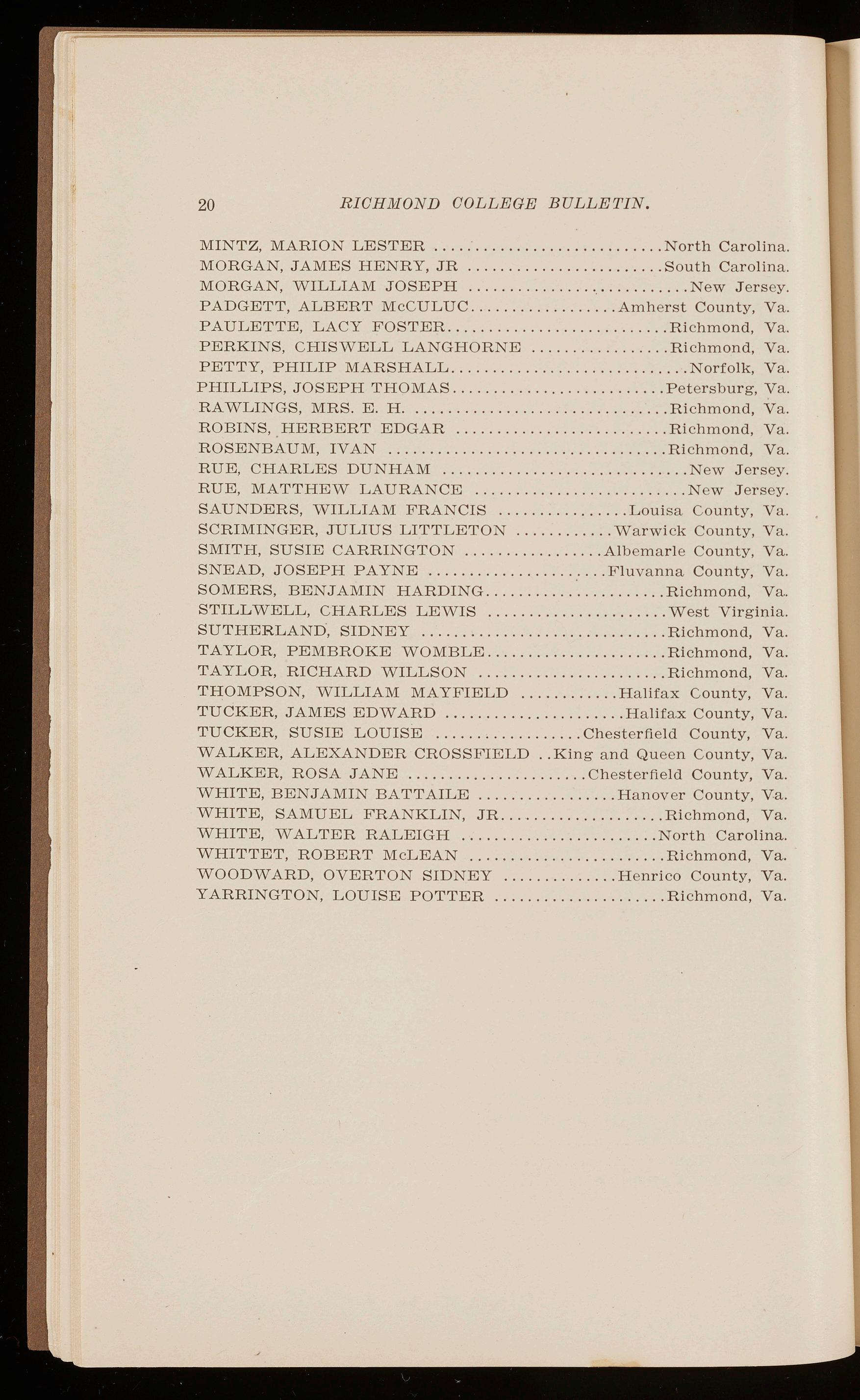
20 RJCHJyJQND COLLEGE BULLETIN.
MINTZ, MARION LESTER ............................ North Carolina . MORGAN, JAMES HENRY, JR South Carolina. MORGAN, WILLIAM JOSEPH . . ......... . ....... . . .. .... New Jersey.
PADGETT, ALBERT McCULUC ........ ......... Amherst County, Va. PAULETTE, LACY FOSTER .................... .. ..... Richmond, Va. PERKINS, CRISWELL LANGHORNE ........... . Richmond, Va. PETTY, PHILIP MARSHALL ...... . ......... .. .. .. ....... Norfolk, Va. PHILLIPS, JOSEPH THOMAS Petersburg, Va.
RAWLINGS, MRS. E. H .................. Richmond, Va. ROBINS, HERBERT EDGAR ......................... Richmond, Va. ROSENBAUM, IVAN Richmond, Va. RUE, CHARLES DUNHAM ............. New J ersey. RUE, MATTHEW LAURANCE ............... New J e r sey. SAUNDERS, "WILLIAM FRANCIS Louisa Cou nt y, Va. SCRIMINGER, JULIUS LITTLETON .... Warwicl, County, Va. SMITH, SUSIE CARRINGTON Albemarle County, Va. SNEAD, JOSEPH PAYNE ........ . ......... : .. . Fluvanna County, Va. SOMERS, BENJAMIN HARDING .................. Richmond, Va. STILLWELL, CHARLES LEWIS ...................... West Virginia. SUTHERLAND, SIDNEY .............................. Richmond, Va. TAYLOR, PEMBROKE WOMBLE ...... Richmond, Va. TAYLOR, RICHARD WILLSON ....................... Richmond, Va. THOMPSON, WILLIAM MAYFIELD ...... ..... Halifax Co unty, Va. TUCKER, JAMES EDWARD Halifax County, Va. TUCKER, SUSIE LOUISE Chesterfield County, Va. WALKER, ALEXANDER CROSSFIELD .. King and Queen County, Va WALKER, ROSA JANE ...................... Chesterfield County, Va. WHITE, BENJAMIN BATTAILE ... .............. Hanover County, Va. WHITE, SAMUEL FRANKLIN, JR Richmond, Va. WHITE, "\VAL'l'ER RALEIGH ........................ No rth Carolina . WHITTET, ROBERT McLEAN .. Richmond, Va. WOODWARD, OVERTON SIDNEY Henrico County, Va. YARRINGTON, LOUISE POTTER ..................... Richmond, Va.
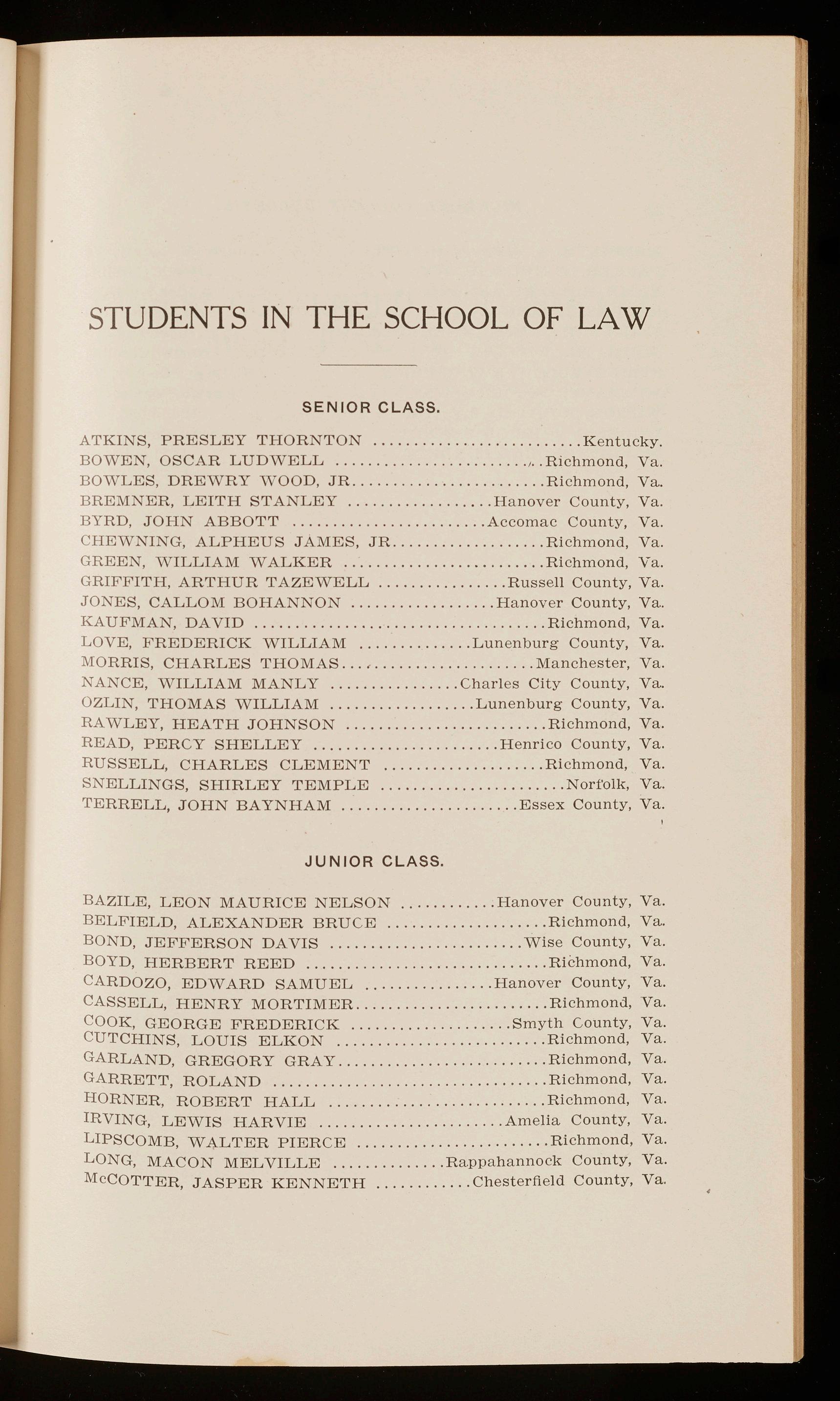
ATKINS, PRESLEY THORNTON Kentucky. BOW EN, OSCAR LUDWELL ............. . .......... ,.. Richmond, Va. BOW LES, DREWRY WOOD, JR ........................ Richmond, Va.
BREMNER, LEITH STANLEY .......... . ....... Hanover County, Va. BYRD, JOHN ABBOTT ......... ............ Accomac County, Va. CHEW NING, ALPHEUS JAMES, JR ................... Richmond, Va. GREEN, WILLIAM WALKER Richmond, Va.
GRIFF ITH, ARTHUR TAZEvVELL Russell County, Va. JONES, CALLOM BOHANNON .................. Hanover County, Va. KAUF MAN, DAVID .................................... Richmond, Va. LOV E, FREDERICK 'iVILLIAM .............. Lunenburg County, Va. MORRIS, CHARLES THOMAS ... , Manchester, Va. NANC E, WILLIAM MANLY ................ Charles City County, Va. OZL IN, THOMAS WILLIAM .................. Lunenburg County, Va. RAWLEY, HEATH JOHNSON ......................... Richmond, Va. READ, PERCY SHELLEY ....................... Henrico County, Va. RUSSELL, CHARLES CLEMENT .................... Richmond, Va. SNELLINGS, SHIRLEY TEMPLE ....................... Nort"olk, Va. TERRELL, JOHN BAYNHAM Essex County, Va.
BAZILE, LEON MAURICE NELSON ............ Hanover County, Va. BELFIELD, ALEXANDER BRUCE .................... Richmond, Va. BOND, JEFFERSON DA VIS .................... . ... Wise County, Va. BOYD, HERBERT REED Richmond, Va. CARDOZO, EDWARD SAMUEL ......... . ...... Hanover County, Va. CASSELL, HENRY MORTIMER ........................ Richmond, Va. COOK, GEORGE FREDERICK .................... Smyth County, Va. CU TCHINS, LOUIS ELKON .............. ....... Richmond, Va. GARLAND, GREGORY GRAY .......................... Richmond, Va. GARRETT, ROLAND .................................. Richmond, Va. HORNER, ROBERT HALL Richmond, Va. IRVING, LEW I S HARVIE ....................... Amelia County, Va. LIPSCOMB, WALTER PIERCE Richmond, Va. LONG, MACON MELVILLE .............. Rappahannock County, Va. McCOTTER, JASPER KENNETH ............ Chesterfield Co u nty, Va.
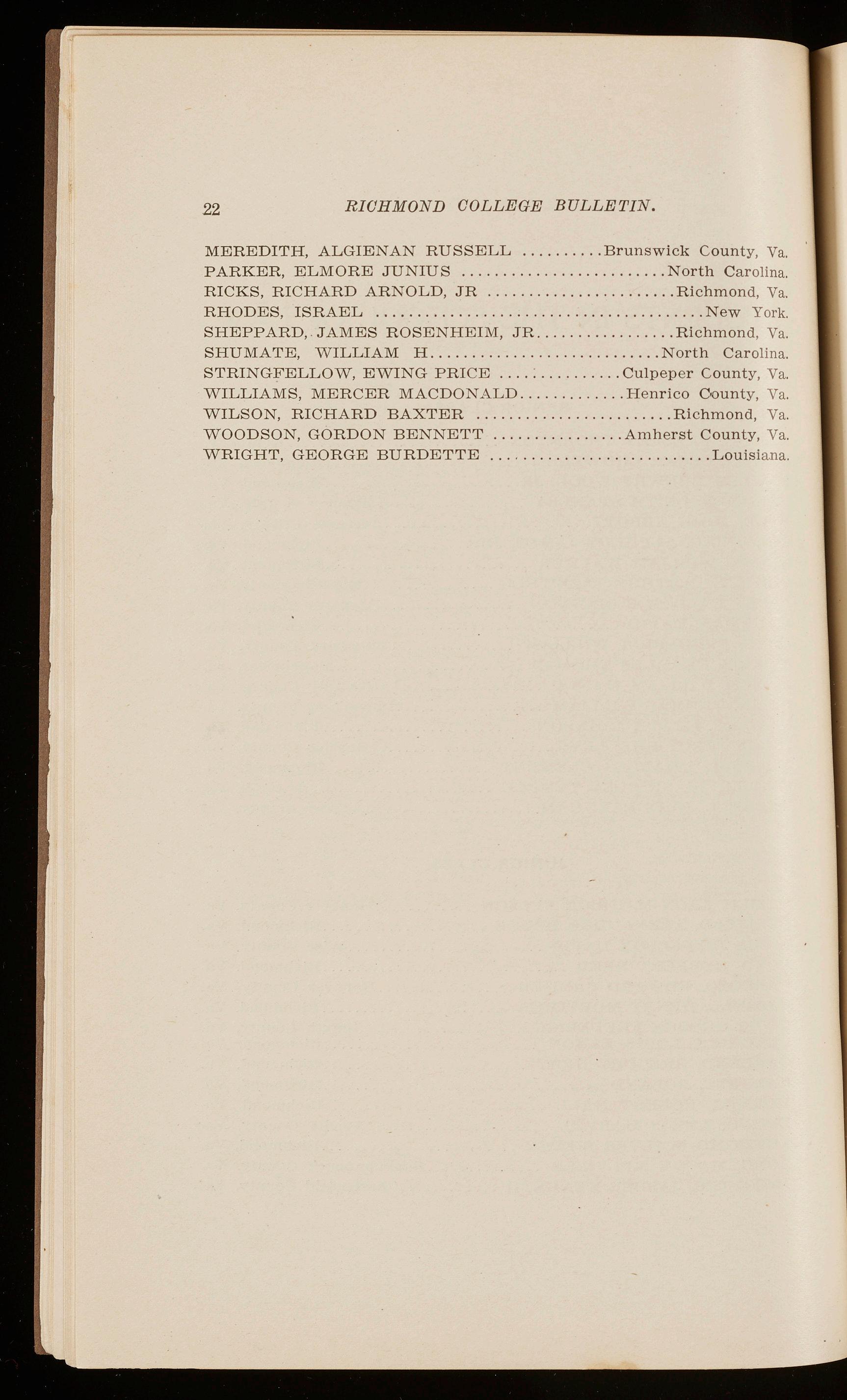
22 RICHMOND COLLEGE BULLETIN.
MEREDITH, ALGIE N AN RUSSELL Brun s wick Count y, Va. PARKER, ELMORE JUNIUS ..... ..... . .... . . . . . . . . .. North C a r olina. RICKS, RICHARD AR N OLD , JR .. Richmo nd, Va RHODES , ISRAEL . New York. SHEPPARD ,. JAMES ROSENHEIM, JR ... Richmon d, Va. SHUMATE, WILLIAM H North Ca rolina. STRINGFELLOW, EWING PRI C E ... . : Culpep e r Count y, Va. WILLIAMS , MERCER MACDONALD ..... H e nrico Count y, Va. WILSON , RICHARD BAXTER Ri c hmond , Va. 'WOODSON, GORDON BEN N ETT ........ ..... Amh e rst Count y, Va. WRIGHT, GEORGE BURDETTE . . . . .... . ............ . ..... Loui siana.

DOCTORS OF LAWS .
P. S. HENSON, D. D ..................................... Boston, Mass.
H . B. FRISSELL, D. D ... .............. Hampton, Va.
DOCTORS OF DIVINITY.
REV. F. B. BEALE . Indian Neck, Va
REV. W. S. DORSET ................ . .. . Richmond, Va.
R EV. J. J. GRAVATT .................................. Richmond, Va.
REY. J E HICKS, M. A .................................. Danville, Va
REV. A. B. RUDD, M A ............. ...... Ponce, Porto Rico.
REV. T. C. SKINNER Roanoke, Va .
MASTERS OF ARTS.
HEN RY BRANTLEY HANDY, B. A ....... Pocomoke City, Md. T h e sis: "The Influence of Industrialism upon Eng li sh Literature of t h e Later Georgian Period."
OSCA R BAXTER RYDER, B. A Richmond, Va. Thesis: "Secess i on Sentim e nt in Virginia to the Missouri Compromise."
BACHELORS OF ARTS .
MAT TIE LOUISE BROvVN Richmond, Va.
KEN LEY JESSE CLA,RK . . . ..... Chester, Va.
DAV ID NATHAN I EL DAVIDSON ......... Vera, Va.
J OHN BUNYAN H I LL Republica n Grove, Va.
PEY TON STARK LEW I S Richmond, Va.
WIL LARD PAYSON McBAIN Richmond, Va.
WA LTER R.ALEIGH DANIEL MONCURE .... .. R i ch mond, Va
THO MAS WILLIAM OZLIN .................. Eanes Cross Roads, Va.
JOHN BRANDON PETERS ... ..... . ............ Petersburg, Va.
THO MPSON EDWARD PETERS Beckley, W. Va.
BEEC HER LEE RHODES .......... . . Windsor, Va
WI LLIAM ROBER T LEE SM I TH, JR ........... Richmond, Va.
HA RRY LAMONT SNEAD ............. . Fork Union, Va.
*N ote.-The hono r ary degrees were voteJ by the Trustees, Ju ne, 1908, and public ly confer r ed Ju ne, 1909.
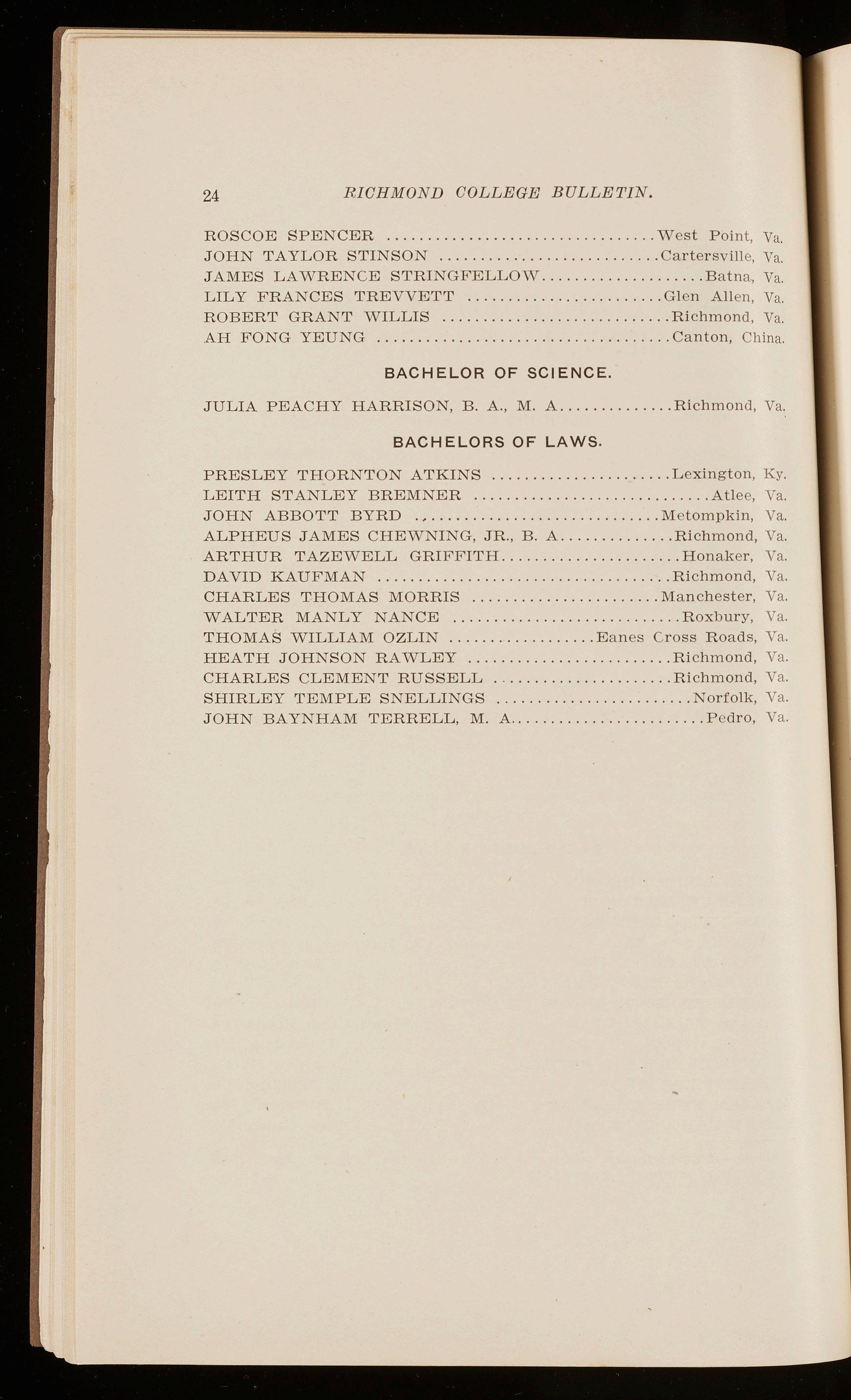
24 RICHMOND COLLEGE BULLETIN.
ROSCOE SPENCER ............................... west Point, Va.
JOHN TAYLOR STINSON .......... Cartersville, Va.
JAMES LAWRENCE STRINGFELLO-VV ............ . .... Batna , Va.
LILY FRANCES TREVVETT Glen All en, Va.
ROBERT GRAN'.r WILLIS ............ .......... Richmond , Va.
AH FONG YEUNG ........ Canton, China.
BACHELOR OF SCIENCE .
JULIA PEACHY HARRISON, B. A., M. A .............. Richmond , Va.
BACHELORS OF LAWS
PRESLEY THORNTON ATKINS ...... .... Lexington , Ky
LEITH STANLEY BREMNER ..... .............. Atlee, Va
JOHN ABBOTT BYRD . , ........ Mctompkin, Va.
ALPHEUS JAMES CHEWNING, JR., B. A Richmond, Va.
ARTHUR TAZE,VELL GRIFFITH .. ................... Hona ker, Va
DAVID KAUFMAN ........ Richmond, Va.
CHARLES THOMAS MORRIS ............. . ......... Manchester, Va.
WALTER MANLY NANCE .. Roxbury , Va.
THOMAS WILLIAM OZLIN .................. Ean es Cross Roads, Va.
HEATH JOHNSON RA,VLEY Richmond, Va.
CHARLES CLEMENT RUSSELL . .. ... ...... .. Richmond, Va.
SHIRLEY TEMPLE SNELLINGS ..... Norfo lk , Va.
JOHN BAYNHAM TERRELL, M. A ......... . P e dro, Va.

ICirl\IOND COLLEGE undertakes to provide instruction as broad and thorough as can be had in any pur ely secular college, and, in addition, to surround the student with influences most conducive to the deve l opment of Christian character. \Wf\\Vl'W' Its tests of scholarship arc rigid , and the standard of grndnation is nnnsu a lly high, whil e the physi cal. social and religious W('l fare of its students is regard ed as no ]pss important.
'l'he founders of the College showed rare wisdom and foresight in selecting· a l ocation for their institution. Richmond is not only the capital of Virginia , but it is the best known city in 111eSout h , and one of the historic cities of the world. EndnriEg memorials of American hero es constantly teach lessons of patrio tism and inspire the young with noble ideals. The busy city, with its varied manufactories and exte nsive commerce, reminds the student that th e mod ern scholar must be practical as well as learned
Richmond is also a city of r eligious influences, and its able and eloqu ent pulpit is an effici ent aid to culture. Th e tempta1ions to young men away from home are but little greater than in a village, and are counteracted by better police r()gulations and by the wholesome moral tone of an exceptionally religious city Life on the campus is rcnrn 1·lcably free from temptation. In no other community of similar size , except at some other Christian colleges, will there be found so large a proportion of act ive Christians, or such strong- and pervasive moral and religions influences.
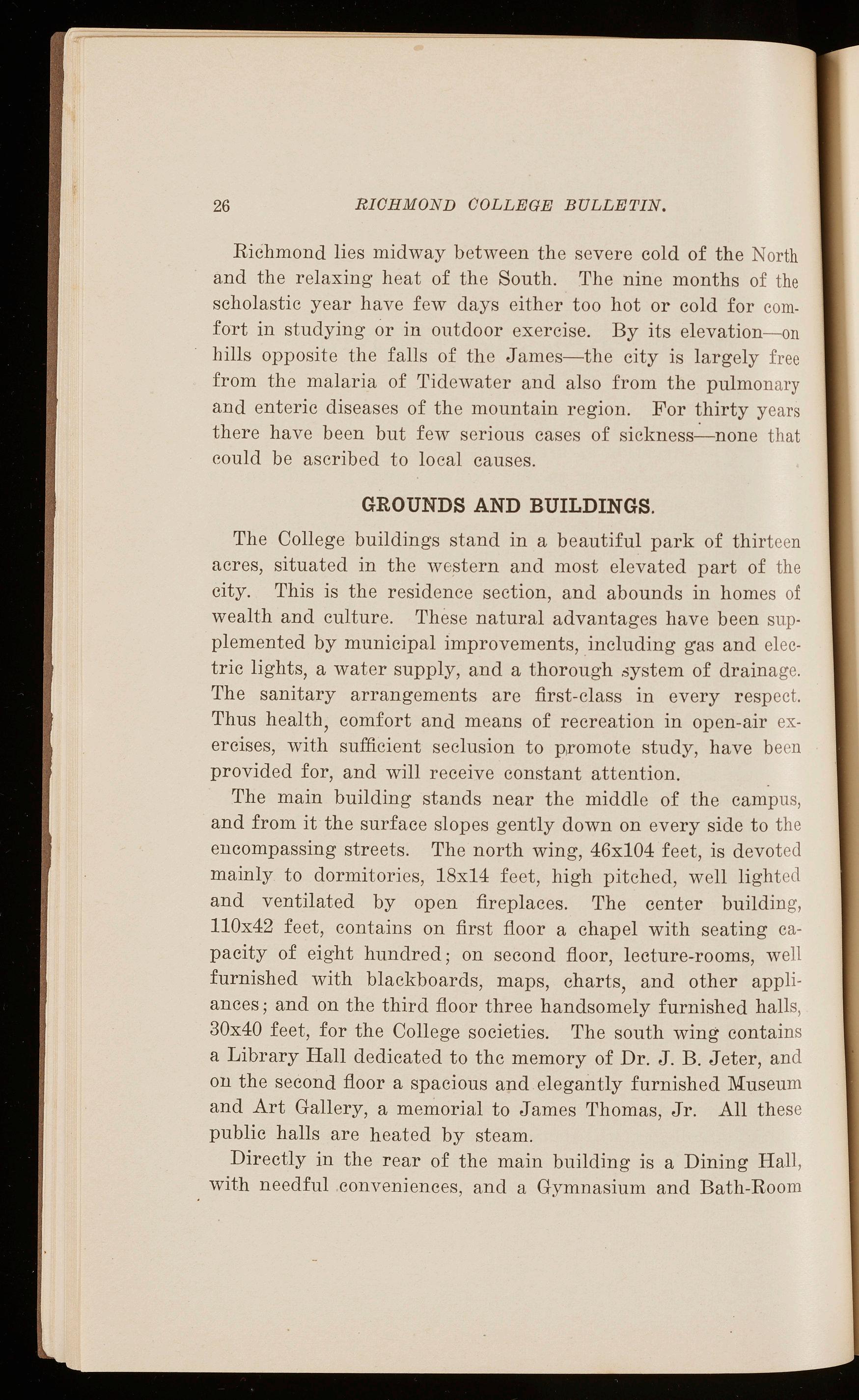
RICHMOND COLLEGE BULLETIN.
Richmond lies midway between the severe cold of the North and the relaxing heat of the South. The nine months of the scholastic year have few days either too hot or cold for comfort in studying or in outdoor exercise By its el evation - on hills opposite the falls of the James-the city is largely fre e from the malaria of 'l'idewater and also from the pulmo nary and enteric diseases of the mountain region. For thirty y ears there have been but few serious cases of siclmess__:___none t hat could be ascribed to local causes.
The College buildings stand in a beautiful park of thirt een acres, situated in the w estern and most elevated part of the city. This is the residence section, and abounds in homes of wealth and culture. These natural advantages have been supplemented by municipal improvements, including gas and electric lights, a water supply, and a thorough system of draina ge. The sanitary arrangements are first-class in every resp ect. Thus health, comfort and means of recreation in open-air exercises, with sufficient seclusion to p,romote study, have b een provided for, and will receive constant attention.
The main building stands near the middle of the camp us, and from it the surface slopes gently down on every side to t he encompassing streets. The north wing, 46x104 feet, is devot ed mainly to dormitories, 18x14 feet, high pitched, well light ed and ventilated by open fireplaces. The center buildin g, 110x42 feet, contains on first floor a chapel with seating capacity of eight hundred; on second floor, lecture-rooms, well furnished with blackboards, maps, charts, and other appl iances; and on the third floor three handsomely furnished hall s, 30x40 feet, for the College societies. The south wing contain s a Library Hall dedicated to the memory of Dr. J. B. Jeter, an d on the second floor a spacious and elegantly furnished Museum and Art Gallery, a memorial to James Thomas, Jr. All thes e public halls are heated by steam.
Directly in the rear of the main building is a Dining Hall , with needful conveniences, and a Gymnasium and Bath-Room

under the same roof. On one side of this, and in the same line, making a row parallel to Lombardy street, is a cottage for students, with rooms arranged in pairs, study and chamber, each 9x14; also two residences of professors. On the other side are three such residences. Thus the students are brought all the time ·within the personal influence of at least five professors and their fa milies, and the social, religious, and literary life of the College is very greatly promoted.
Science Hall , erected in 1899, measures 120x51 feet, and is three stor i es above a basem ent. The well-lighted basement contains boilers for h ea ting three buildings with steam, and also sh ops and apparatus rooms. The twenty-seven rooms above the basement are all devoted to instruction in the natural sciences. On the first floor are three laboratories for chemistr y, a lecture hall, a library-room, a balance room, professor's office,and two supply rooms for chemicals and apparatus. The first-year laboratory accommodates fifty students at one time. 'I'he sec ond-year laboratory has d esks for twenty-four. The lecture -room has terraced seats arranged in semi-circles, with places for one hundred and twenty-five students.
The arrangements in the d epartment of physics are similar to tho se made for chemistry, each school occupying an entire floor. The third floor contains laboratories for instruction in biology, psychology, and drawing. All lecture-rooms and labora tories are ventilated by the most improved system. The entire building is supplied in every part with water, gas, and electr icity. No trouble has been spared to make this hall one of t he best of modern buildings for the purpose of teaching laborato ry sciences.
Memorial Hall, built in 1899, was intended to furnish lodging for students and also to commemorate the lives and deeds of Virg inia Baptists who have worthily contended for the principles of the denomination. Besides rooms named for individuals, both men and women the Hall contains a spacious ' fire-proof room with memorial windows, in special remembra nce of those heroic preachers who suffered during the

str u ggle for religious liberty in Virginia. The room has been placed in charge of the Virgin ia Baptist Historica l Soci et y. The building contains lodgings for seventy students. It is heated by steam and furnished with tub and shower baths
The College is composed of nine academic schools , or d ep artments, and the professional school of Law. Instruction is also given in Biology, Mechanica l and Freehand Drawing , Bibl ical Literature and Physical Culture·. Th e Faculty consists of the president and professors, each professor being responsibl e for the efficient conduct of his own school. The pr esident has general oversight and direction of the discipline of the Coll ege, tut may refer to the Faculty cases calling for serious penalty
The deportm ent of a Christian gentleman is the standard to which every student is expected to conform All appropr iate means are used to develop and confirm a sense of personal ho nor and sacred regard for truth , as upon these rests the best reliance for good conduct. A fe,v p l ain and reasonab l e rules are prescribed, and each matricu l ate m u st pledge himself to obey them. The following regulations are now in force:
I. Each student shall attend punctual ly: every lecture, r ecitation and examination held in the classes of which he is a member, and shall furnish at the specified times the written ex ercises appointed for such classes. If a student is absent or tardy, he shall, at the first opportunity thereafter, offer expl anation of such absence or tardiness to the professor in charg e. If absent or unprepared as many as three times in any mont h, he must stand a special written examination to make good th e deficiency.
II. The President will assign students to rooms. Occupant s will be held responsible for the good order of tlieir rooms, as we ll as for any damage or defacement they may sustain. N o person, other than an officer of the College, has any right t o enter a lodging except upon invitat ion of the occupants Ch anges from one room to another may be all owed by th e

Pr esident , but must not be made without his previous consent . .All students occupying· rooms on the campus are required to att end the conference of professors and students, held every WPdnesday morning throughout the session, 8 :-:10to 9 A. l\I. .All st nd euts arc required to attend a general college conference hrld onc e a month throughout the session.
I II. A resident student desiring to leave the premises during the h ours when, by the Schedule of Recitations, he should be in l1is classPs, shall get permission from the President. Any student d esiring io be absent from College shall get the President's permit in writing and exhibit it to each of his Professors.
IV. Students shall at all times carefully abstain from unn ecessary noise, particularly in the College buildings , and from everything likely to prevent study on the part of others. Loafing in the rooms of other students during the hours appropriate d to study is especially forbidden. Games and all forms of pl aying on the College campus arc forbidden except from 2 P. l\I. to 8 P. 1\1., and on Saturdays from 12 l\I. to 8 P. 1\1.
Y. The Faculty regarch hazing as a serious offence against Coll ege order. All forms of hazing arc strictly forbidden.
VI. If a student destroy, deface, or in any way damage College property, or aid and abet others in so doing, he shall, within t w enty-four hours, report the fact to the President in writiJJg, and pay (to the Treasurer) the necessary cost of repairs. Stu d ents will be charged pro rata for all damages not individ ually accounted for. Playing ball in the buildings and tl1rowing water from the windows or porches are strictly prohibi t ed.
VII. ro student shall bring upon the pl'emises or keep in his possession any playing cards, intoxicating liquors, clogs, or deadly weapons.
VIII. No Clubs or Societies shall be formed unless the Facult y , on application made , approve the design of such Associati on , the rules by which it proposes to be governed, and the h ours of meeting.
IX. Resident students desiring to board elsewhere than on th e College premises must first obtain the approval of the President.
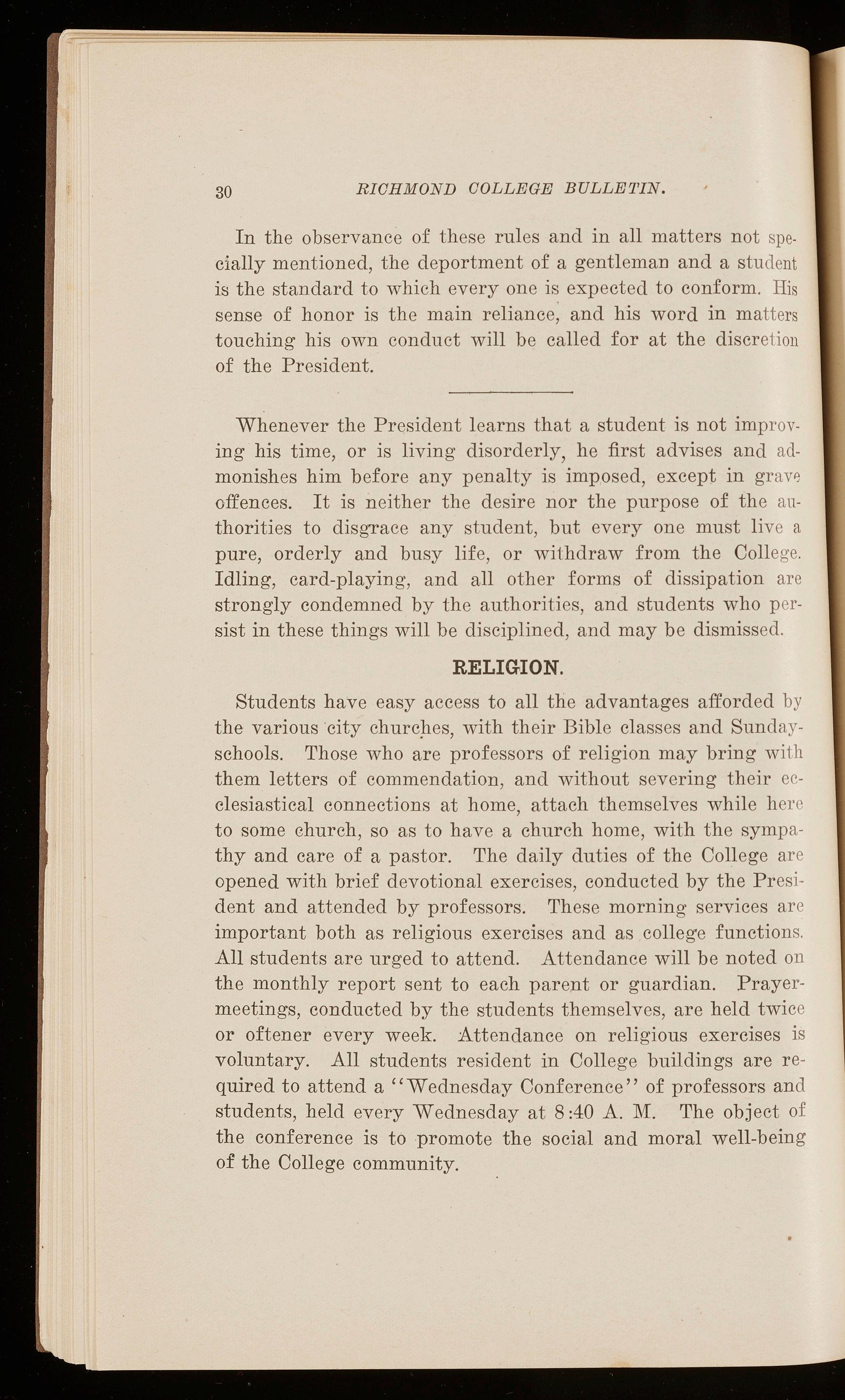
In the observance of these rules and in all matters not specially mentioned, the deportment of a gentleman and a stu dent is the standard to which every one is expected to conform . His sense of honor is the main reliance; and his word in m atters touching his own conduct will be called for at the discr etion of the President.
Whenever the President learns that a student is not imp roving his time, or is living disorderly, he first advises and admonishes him before any penalty is imposed, except in gr av8 offences. It is neither the desire nor the purpose of th e authorities to disgTace any student, but every one must li ve a pure, orderly and busy lif e, or withdraw from the Coll ege. Idling, card-playing , and all other forms of dissipation arc strongly condemned by the authorities, and students who p ersist in these things will be disciplined, and may be dismiss ed.
Students have easy access to all the advantages afforded by the various •city churcp.es, with their Bible classes and Suncl ayschools. Those who are professors of religion may bring wi th them letters of commendation, and without severing their ecclesiastical connections at home, attach themselves while h ere to some church, so as to have a church home, with the symp athy and care of a pastor. The daily duties of the College ar e opened with brief devotional exercises, conducted by the Pr esident and attended by professors. These morning services ar e important both as religious exercises and as colleg·e function s. All students are urged to attend. Attendance will be noted on the monthly report sent to each parent or guardian. Praye rmeetings, conducted by the students themselves, are held twi ce or oftener every week. Attendance on religious exercises is voluntary. All students resident in College buildings are r equired to attend a "Wednesday Conference" of professors an d students, held every Wednesday at 8 :40 A. l\lL The object of the conference is to promote the social and moral well-bein g of the College community.

PROFESSOR DICKEY.
Stu dents entering the school will be classed according to th eir preparation. rrhose who expect to enter any one of the classes will find profit in reviewing carefully in the summer leisure the forms as found in any Latin grammar.
In all classes written recitations are given from time to time, for which there may not necessarily be previous notice. In all classes parallel work will be assigned for private reading·, and as occasion arises, topics on kindred literary and liIJguistic subjects will be given for investigation and presentat ion.
The importance of the study of Greek is emphasized for all who wish to get the full cultural value of the course in Latin. The study of French and other romance languages is highly e:ulightening to the student of Latin.
Th ree units of the standard entrance requirements as published in the catalogue are required for entrance to this course:
1. Reading.-Cicero (Manilian Law and Select Letters; Vergi l (Aeneid i-iv); Ovid (Selections).
The reading of this course will be supplemented by occasional lectures on such general subjects as Roman Oratory, the rise and development of the Roman Epic in its relation to the Greek, the lives of the authors studied, &c.
32

RICHMOND COLLEGE BULLETIN.
2. Prose Composition.-Written ex ercis es , based on model passag es of Cicero , onc e a w eek throughout the session . This work will n ecessit a t e a constant study of Latin Gramma r.
3. Latin Literature. - An introdu ctory cours e on th e h istory of Latin Lit er a tur e. Th e t ext-book work will be supplem ent ed by l ectur es.- Spring Term.
1. Reading. - Livy (Book I) ; Catullus (S el e ctions) ; H orace ' (Odes and Epodes); Plautus (Captivi ) ; Terenc e (Phormi o) .
Appropriate lectures will b e giv en on Roman Historiogra phy, th e history of Roman L y ric Po etry, Roman Comedy , &c
2. Prose Composition.- "\V'eekly ex ercis e, bas ed on Livy and Cic ero; occasional original compositions.
3. Roman Private Life.-T ext-book work , a cc ompani ed by l ectur es , on Roman Private Life as illustratecl by Ro man literature and ar ch ae ology.
1. Reading.-Tacitus ( S el ections from the Annals i-vi); Pliny (S el ect L ett ers ); Su etonius ( S el ec tions ) ; Juvenal , an d Horace (S el ect Satir es ) ; l\1artial (S el ect Epigrams); Cicero (Tusculan Disputations , Book I ) .
The reading will b e supplem ented by lectur es on Roman H istoriography durin g th e classical period of the Empire, Rom an Epistolography, Bio graphy, the rise and dev elopment of Rom an Satire , th e Epigram , the history of Roman Philosophy, &c.
2. Prose Composition.- The work will consist of original composition, and tho translation into idiomatic Latin of typical pa ssages of English lit erature , representing different subjects and llifferent styl es. Prom time to time th e instructor will m eet each stud ent separat ely to criticis e his work.
3. Latin Literature.-A general surv ey of th e classical lit er ature of the Romans. The study of a t ext-book will be supplemented by appropriate lectures.

. (To be given 1910-11.)
1. Readi ng .~Tacitus (Diologus de Oratoribus); Cicero (~rulns); Horace and Juvenal (Select Satires); Horace (Ars Poetica); Quintilian Book x.)
'I'h e reading will be snpplemented by lectures on Roman Orato ry, Satire, and Literary Criticism.
2. Prose Composition .-The co:i;nposition of this course w ill be give n on the same plan as that of Course C. 'I'he exercises will b e adapted to the advancement of the individual students.
3. Special reports on assigned topics dealing with Roman life and literature.
PROFESSOR HARRIS.
The aim of this school is to give the student an appreciat i ve acquaintance with the best Greek authors and to inspfre a l ove for Hellenic studies. From the beginning of the course exactness will be insisted upon. In all cl asses reading at sight w ill be p racticed, and English will be put into Greek, either as a set exercise or at dictation. At suitab l e times there w ill be conferences on Greek life, myt h ol ogy, history, literature an d art, and at all times an effort will be made to lead the stude n t into a lreener appreciation of the genius of t h e Greeks, and to cult ivate a sense for their literary standards.
The work of this school is embraced in the following courses:
Intr oduc t ory Class . - This class begins wit h the alp h abet, an d is occupied in securing a thorough knowledge of forms, a working vocabu l ary, and the fundamental points of syntax. In the spring, the Anabasis will be taken up, and two or more books will be read. Five hours a week throug h out the year. To enter this course some knowledge of Latin is prerequisite.
34

RICHMOND COLLEGE BULLETIN.
Course A.-This class will complete four books of the Ana. basis and then take up L,ysias, or some author to be sele cted. Especial attention will be paid to forms and inflections. W eekly exercises in composition; translation at sight; gram mar. Five hours a week throughout the year.
Course B.-This class will be subject to change as the n eeds of the students may dictate. The work will center around Pl at o and Homer. Weekly exercises in composition; brief lect ures on Greek philosophy, the Drama, Homer, and their relat ions to Greek life. Work will be assigned for private readin g, on which the student will be examined.
Course C.-In this class the work will center around Thu cydides and Demosthenes and the Drama. Work will also be assigned for private reading in Herodotus and the Attic Orat ors. 'l'he course will be made as general as is consistent with _ th oroughness. Lectures on Literature, Grammar and Rhetori c.
Greek Tes.tament .,-If there is sufficient demand, provi sion will be made for a study of the New Testament in Gre ek. This class is not given College credit, but finds in itself its own reward. The work will be made as practi'cal as possible.
lntroductory.-Benner & Smyth's Beginn e r's µreek Book; Goodell' s Greek Grammar; Harper & WaJlace's, Goodwin's or Smith's Anabasi s.
Course A.-Xenophon's Anabasis and Grammar as above. Wait 's Orations or' Lysias; Pearson's Greek Prose Composition.
Course B.-Benner's Homer's Iliad; Plato's Euthyphro (Heidel ); Plato's Apology and Crito (Dyer); Euripides' Iphigenia (Flagg ); Spieker's Composition; Goodwin's Grammar; parallel to be assigned
Course C.-Thucydides, Books II. and III. (Lamberton); Demosth enes' De Corona (D'Ooge); Sophocles' Antigone (D'Ooge), or Aristophanes' Clouds (Humphreys; parallel wqrk to be assigned.
Greek Testament.-Westcott & Hort's Greek New Testament .
Through the College Library the student has access to all necessary works of reference.
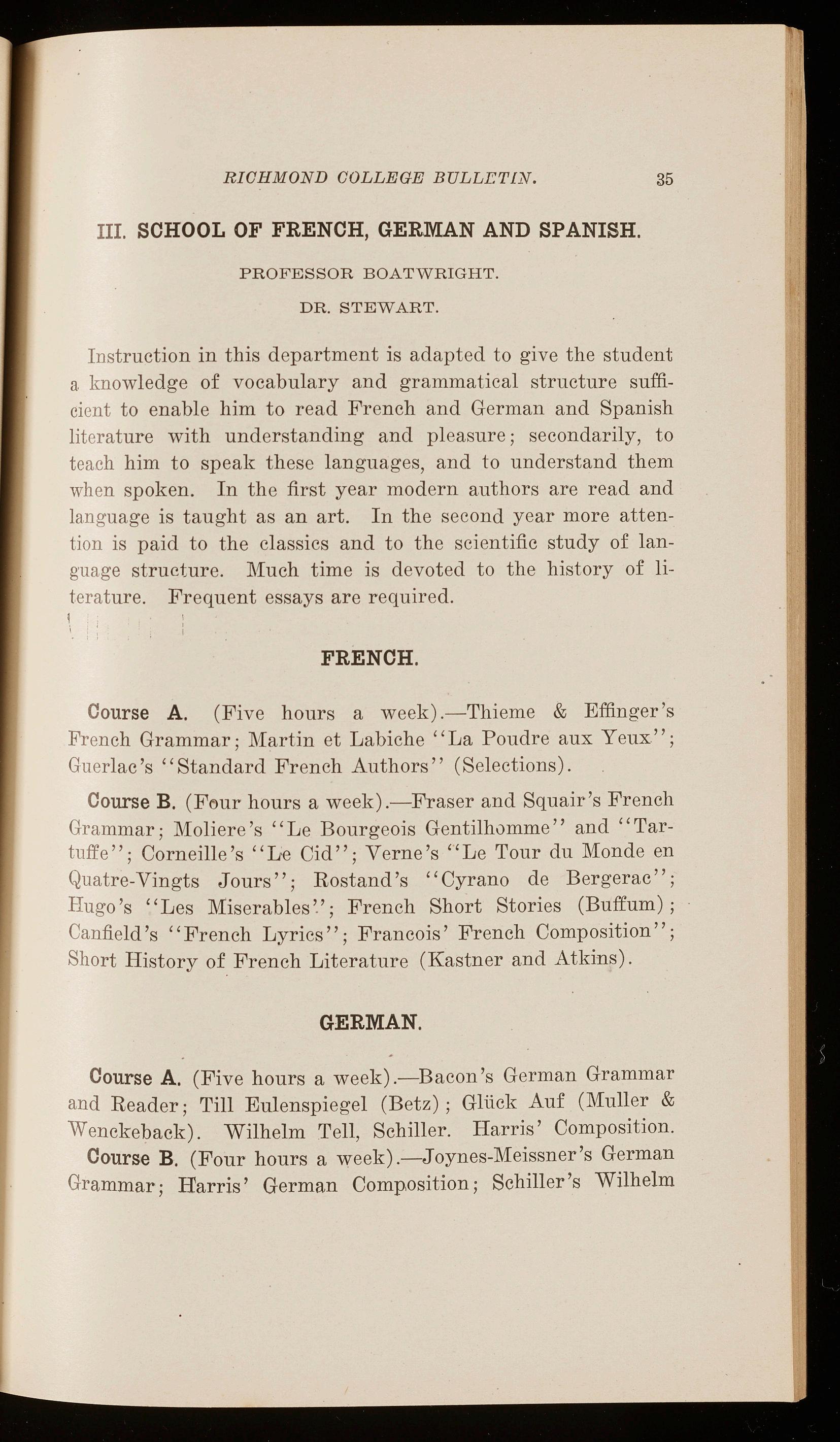
PROFESSOR BOATWRIGHT.
DR. STEWART.
Ins truction in this department is adapted to give the student a kn owledge of vocabu l ary and grammatical structure sufficient to enable him to read French and German and Spanish litera ture with understanding and pleasure; secondarily, to t each him to speak these languages, and to understand them when spoken. In the first year modern authors are read and language is taught as an art. In the second year more attent ion is paid to the classics and to the scientific study of l anguag e structure. Much time is devoted to the history of lit erat ure. Frequent essays are required.
Course A . (Five hours a week).-Thieme & Effinger's Fre nch Grammar; Martin et Labiche '' La Poudre aux Yeux''; Guerlac 's "Standa r d French Authors" (Selections).
Course B. (Ftmr ho u rs a week).-Fraser and Squair's French Grammar; Moliere's "Le Bourgeois Gentilhomme" and "Tartuffe ''; Corneille's '' Le Cid''; Verne's '' Le Tour du Mon de en Quatre -Vingts J ou rs''; Rostand's '' Cyrano de Bergerac''; Hug o's '' Les :M i sera bl es'.'; F r ench Short Stories (Buffum) ; Canfield 's "French Lyrics"; Francois' French Composition"; Short History of French Literature (Kastner and Atkins).
Course A. (Five hours a week) .-Bacon's German Grammar an d Reader; Till Eu l enspiegel (Betz) ; Gluck Au£ (Muller & W enckeback). W ilh el m Tell, Schiller. Harris' Composition.
Course B , (Four h ours a week).-Joynes-Me issner's German Grammar; Harris' German Composition; Schiller's Wil h elm
36

T ell ; Lessing's "lVIinna von Barn h elm"; Heine's Prose (Faust's edition) ; "Aus dem deutschen Dichterwa l d" (Di ll ard ) ; Goethe's "lVIeisterwerke" (Bernhardt) ; lVIoore's German Litera. ture.
Course A. (Five hours a week) .-Hill and Ford's Sp anish Grammar; Bransby's Spanish Reader; Padre Is l a 's "Gil Blas."
Course B. (FoUl' hours a we ek).-Cervantes' "Don Quij ote" (Ford's Selections) ; Alarcon 's '' Sombrero de tres Pi cos ''; Galdos' "lVIaria n el a"; Lope de Vega y Cal deron de l a Barca; Obras Maestras; Va l des "Jose"; E ch egaray "0 Locura o Santi dad"; Ford's Spanish Exercis es; Fitzmaurice -Ke ll y's '' Spanish L"iterature.
Applicants for admission to advanced classes are expected to h ave complete d t h e full equiva l ent of the l ower courses. Kn owledge of grammatical forms and familiarity with irr eg ul ar verbs wi ll be requ ired. Previous dri ll in conversation is also vrry desirab l e.
RE.
PROFESSOR METCALF.
ASSOCIATE PROFESSOR VAN LANDINGHAM.
A -1. English Literature, General View. - First Term: Fr om th e beginnings to Milto n , Second Term: Milton to W or clswo r t h . Third Term, "\Vor d sworth to Tennyson. - A few typi cal m as t er pieces of each period are studied in class, whi l e oth ers a r e ass i gne d for para ll el reading.-Simond 's History of En gl ish Li te r a tur e, Ba ld win & Pa ul 's Eng l ish Poems, lVl'.anly's E ng lish P rose: Lec tu res;. W ritten R ep orts . - Professor Met calf and Associate Professor VanLandingham.
2. Theme Writing.-W eeldy Th emes; Specimens of Expo sition, D escri pt ion, and Nar r ations. Frequent conferences wit h
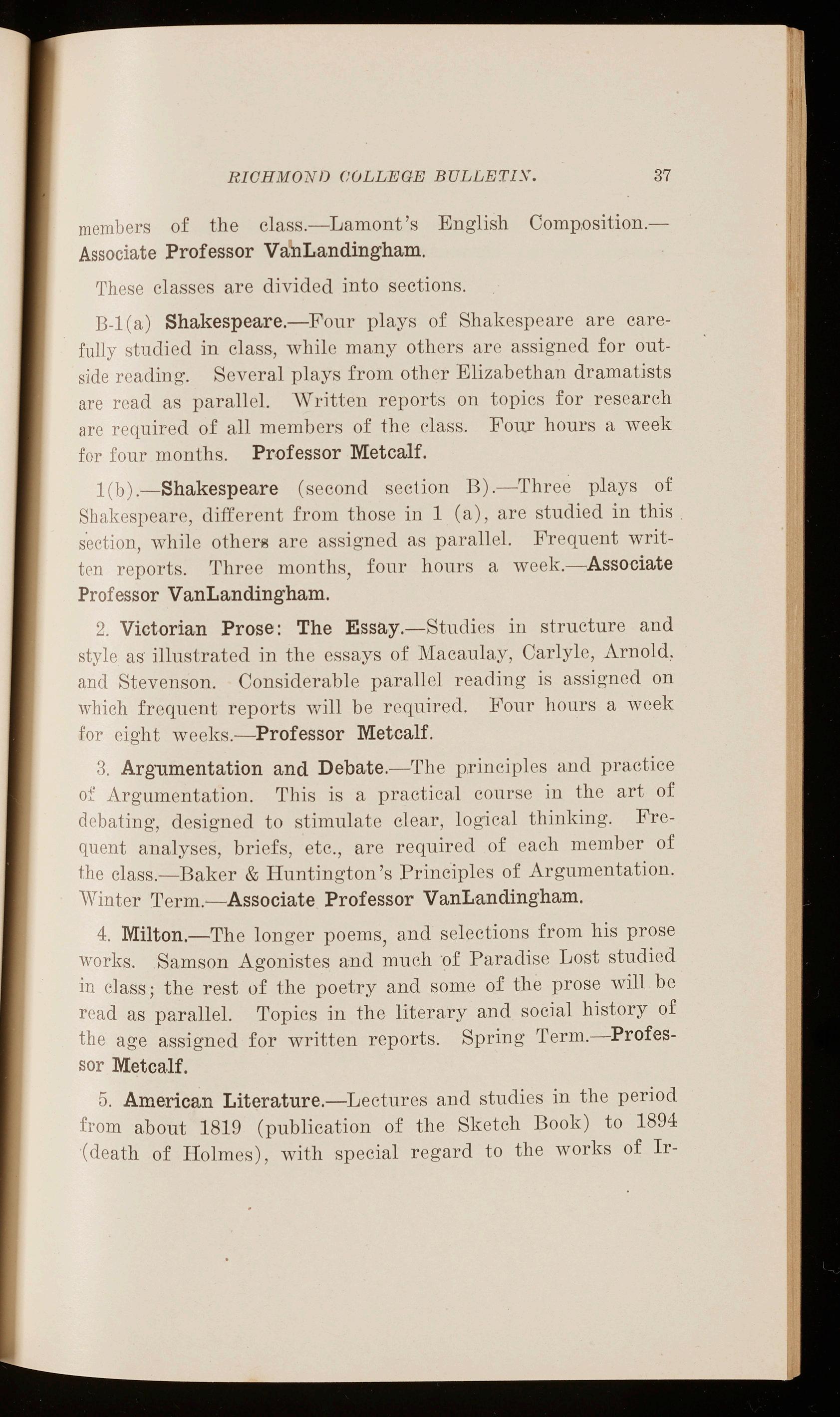
members of the class.-Lamont 's English Comp osition.Associate Professor VanLandingham.
'l'hese classes are divided into sections.
B-l(a ) Shakespeare.-Four plays of Shakespeare are carefully studied in class, while many others are assigned for outside re ading. Several plays from other Elizabethan dramatists are rea d as parallel. Written reports on topics for research are re quii-ed of all members of the class. Four hours a week for four months. Pr,ofessor Metcalf.
l(b) .-Shakespeare (second section B).-Three plays of Shake spearr, different from those in 1 (a), are studied in this . section, while otherg are assigned as parallel. Frequent writt rn r eports. Three months, four hours a week.-Associate Prof essor VanLandingham.
2. Victorian Prose: The Essay.-Studi es iu structure and style as illustrated in the essays of l\Iacaulay, Carlyle, Arnold . and Stevenson. Considerable parallel reading is assigned on which frequent reports will be reqnired. Four hours a week for eight weeks.-Professor Metcalf .
3. Argumentation and Debate, -The p,rinciplcs and practice of Argumentation . This is a practical course in the art of debating, designed to stimulate clear, logical thinking. Frequent analyses, briefs, etc., are required of each member of t he class.-Baker & Huntington's Principles of Argumentation. Winter 'l'erm.-Associate Professor VanLandingham.
4. Milton.-The longer poems, and selections from his prose works. Samson Agonistes and much of Paradise Lost studied in class; the rest of the poetry and some of the prose will be rea d as parallel. 'l'opics in the literary and social history of the age assigned for written reports. Spring Term.-Professor Metcalf.
5. American Literature.-L ectures and studies in the period fro m about 1819 (publication of the Sketch Book) to 1894 (d eath of Holmes), with special regard to the works of Ir-
38

RICHMOND COLLEGE BULLETIN.
ving, Webster, Hawthorn e, Poe, Emerson, Sidney Lani er, and Lowell.-Spring 'l'erm.-Associate Professor VanLandin gbam.
Students desiring full cred it (four points) for Eng lish B must take 1 (a) or 1 (b) , 2 or 3; 4 or 5 A credit of six points will be allowed for comp l etion of a ll five courses.
C-1.-Victorian Prose: The Novel.-A study of the d evelopment of prose fiction from about 1840 to 1900. Ext ensiv e readin g in the works of Thackeray, Dickens, Eliot, Meredith , and Hardy. Lectures; written reports. Fall Term, Tu esday, Thursday, Saturday at 1 :10.- Professor Metcalf.
2. Poetry of the Romantic Revival.-From the publicati on of the Lyrical Ballads (1798) to the death of Scott (1832). Special attention is given to Wordsworth, C(?leridge, Byron, Shelley, and Keats. Lectures; written reports. Winter Term. - Professor Metcalf .
3. Poetry of the Victorian Age.- Chief stress is laid on t he poetry of Browning and Tennyson, but some attention is given to the other poets of the period. Topies assigned for pra ctice in literary criticism. Lectures. In all these courses a l arge amount of reading is requir ed. Spring Term.-Associate Professor VanLandingham.
D-1. Anglo-Saxon Prose.-Old English Grammar and Rea der (Smith's), with collateral reading of sel ections from the pr ose literature. Fall Term , Monday , Wednesday, Friday at 1 :I O.Associate Professor VanLandingham.
2. Anglo-Saxon Poetry.-B eowulf (Wyatt's edition) r ead entire, and a few hundred lines cri ti ca lly studied. Para llel Reading and Reports. Winter Term.-Professor Metcalf .
3. Middle English.-S el ections from Middle English Lite rature ( 1200 to 1500). Emerson's Middle English Read er. Parallel Reading in Chaucer. Spring Term.-Professor Metcalf.
4. Chaucer.-A careful study of one or two of the Cant erbury Tal es, with wide reading in the others and in the short er poems. Spring Term.-Professor Metcalf ,
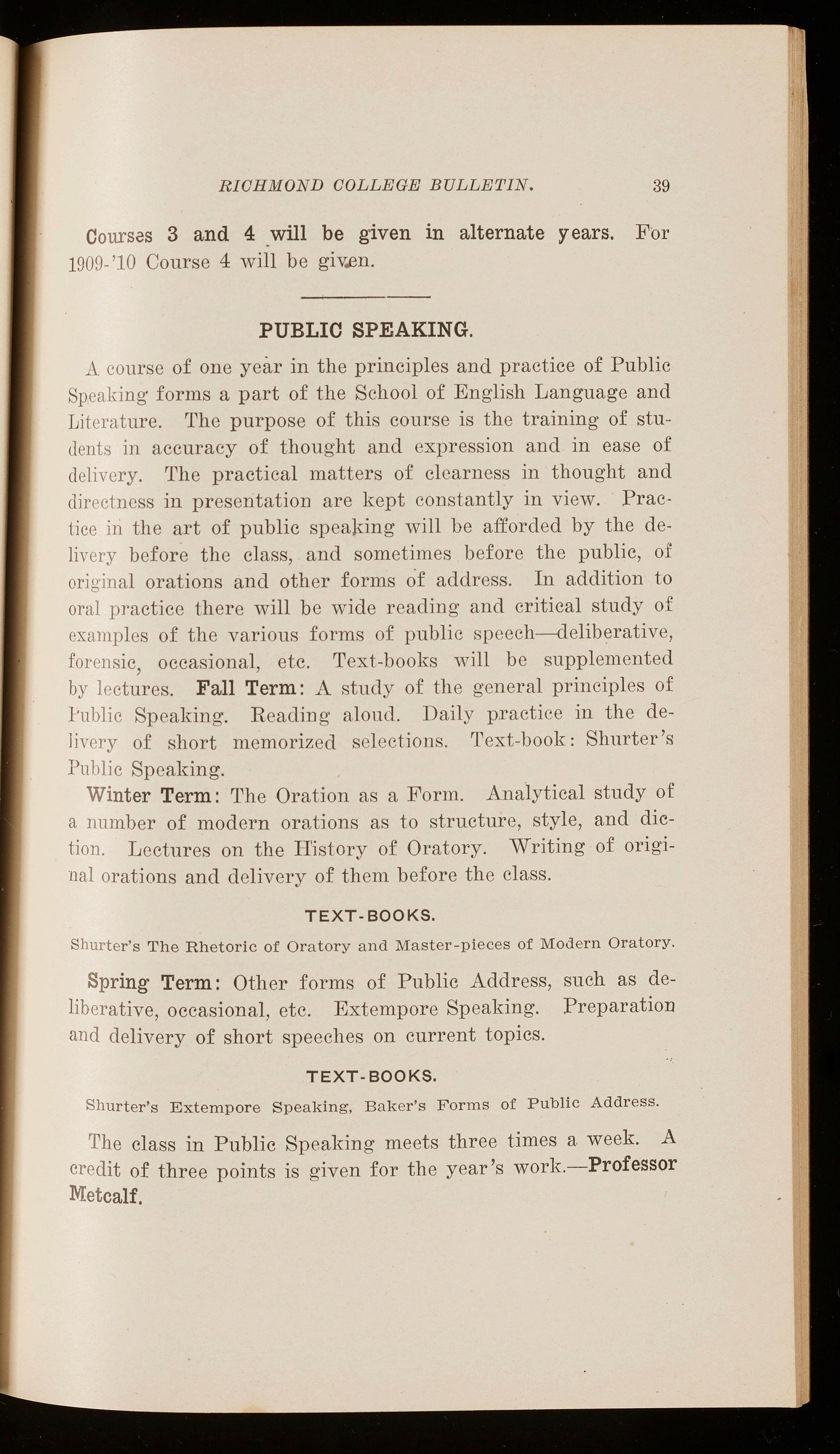
Courses 3 and 4 will be given in alternate years. For 1909-'10 Course 4 will be giv.en.
A course of one year in the principles and practice of Public Speaking forms a part of the School of English Language and Literat ure. The purpose of this course is the training of students in acc ura cy of thought and expression and in ease of deliver y . The practical matters of clearness in thought and directne ss in presentation are kept constantly in view. Practice in the art of public spealring will be afforded by the deliYery before the class, and sometimes before the public, or original orations and other forms of address. In addition to oral practice there will be wide r eading and critical study o-f' exampl es of the various forms of public speech-de liberativ e, forensic, occasional, etc. 'rexi-books will be supp l emented by lectures. FaJl Term: A study of the general principles of l"ublic Speaking. Reading aloud. Daily p ;racti ce in the deliYcry of short memorized sel ections. Text-book: Shurter 's Public Speaking.
Winter Term: The Oration as a Form. Analytical study of a number of modern orations as to structure, style, and diction. Lectures on the History of Oratory. Writing of original orations and delivery of them before the class.
TEXT-BOOKS.
Shurte r's The Rhetoric of Oratory and Master-pieces of Modern Oratory.
Spring Term: Other forms of Public Address, such as delibera tive, occasional, etc. Extempore Speaking. Preparation and delivery of short speeches on current topics.
TEXT-BOOKS.
Sh urter's Extempore Speaking, Baker's Forms of Public Address.
The class in Public Speaking meets three times a week. A credit of three points is given for the year's work-Professor Metcalf.

PROFESSOR GAINES.
The aim of the course of study in this department is to increase t h e siudent 's power of independ ent, honest inquir y, and to cultivate in him the habit of stating with exactness and clearness his convictions, and of giving logically his rea sons for them. 1'hroughout the entire course, and particularl y in the earlier part of it, the subjects are taught chiefly with reference to their importance and value as a means of general education. The needs of the many rath er than of the few arc kept constantly in mind. At the s_ametime a student who takes the entire course with a view of specializing in mathem atics will find that the course is sufficiently extensive and that it is presented in such a way as to reveal to him something of the power and elegance of the science and the magnitude of the field that lies out b efo re him , and to give him sufficient mast Pry of the subjects taught and particular l y of mathemat ical methods as will enable him to enter with profit upon graduate studies in mathematics.
The following outline will give a fair idea of the courses offered: As preparation for the first class one should h ave completed (1) Elementary Algebra to Quadratic Equation s (in a book of the grade of Went-worth 's Elementary Algebra , or Hall and Knight's Elementary Algebra, and (2) P l ane Geometry as given in any of the standard American texts.
Course A .-(a) Solid Geometry three times a week, F all Term (b) Plane Trigonometry three times a week, Winter and Spring Terms (c) Advanced Algebra twice a week through out the year.
TEXT-BOOKS.
Wentworth's So l id Geometry, Murray's P l ain Trigonometry, Haw k's Advanced Algebra.
Course B . - (a) Analytical Geometry, three times a week for for half -year. (b) Differential and Integral Ca l cu l us, thr ee a week for second half-year. (c) Theory of Equations and
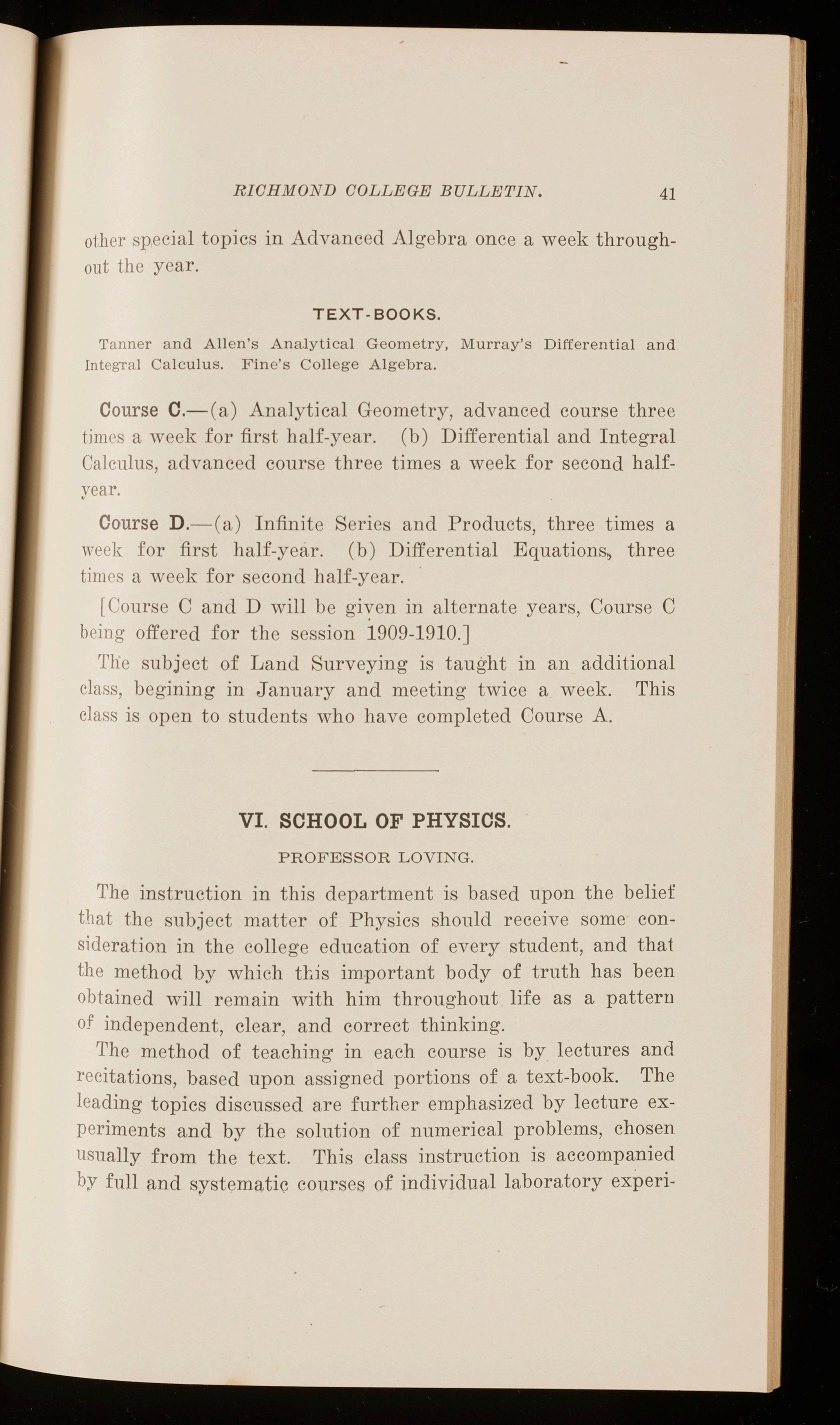
o1her specia l topics in Advan ced Alg ebra once a we ek throughout the ye ar.
Tanne r a nd All e n ' s Ana.I y tic a l G e om e tr y , Murray' s Differential and Integral Ca l culu s. Fin e ' s Coll ege Al ge bra.
Course C.- ( a ) Analytical Geom etry, advan ced course three times a w eek for first half-year . (b) Differential and Integral Calculu s, advanc ed cours e three times a week for second halfyear.
Course D.-( a ) Infinit e Seri es and Products, three times a week fo r first half-y ear. (b ) Diff er ential Equations., three tirnrs a w eek for second half-y ear.
[Cour se C and D will b e gi:7en in alternate years , Course C being offer ed for the session 1909-1910.J
The subj ect of Land Surv eying is taught in an additional class, b egining in January and meeting twic e a week. This class is op en to stud ents who hav e compl eted Course A.
Th e instruction in this department is based upon the belief that th e subj ect matter of Physics should receiv e some consideration in the coll ege education of every student , and that the method by which ttis important body of truth has been obta in ed will r emain with him throughout life as a pattern of independent, clear, and correct thinking.
Th e method of teaching in ea ch course is by l ectures and rec itations , bas ed upon assigned portions of a text-book. The leading topics discussed are further emphasized by lecture exper iments and by th e solution of numerical problems, chosen usually from the t ext. This class instruction is accompanied by full and systematic courses of individual laboratory experi-

RICHMOND COLLEGE BULLETIN.
ments, for which the rooms and outfit of Science Hall give ample facilities. The laboratory equipment is alread y good and will be markedly improved this y ear by a speci al ap. propriation.
Course A.-Elcm entary General Physics. This course covers in an elementary way the fundamental prin cipl es of Physics, including Mechanics, Properties of Matter, Heat, Sound, Light, Electricity and Magnetism, and it is offer ed for the benefit (1) of those who wish to acquire some knowl edge of the simpler phenomena of Physics as part of a liberal education and (2) of those who may take up the study of medicine or some related science. By the aid of abundant experiments and illustrations, both in the l ecture-room and in tho laboratory, the effort is made to combine in this cours e the freshness and attractiveness of an experimental and pra ctiC'a l treatment with the scientific method and exact discipline whirh may form the basis £or further scientific work. For admission to this class the student must have a knowledge of Algegra and Geometry, equivalent to the necessary preparation for l\fathematics A. Three lectures a week, two laborator y periods of two hours each.
Course B.-Advanc ed Physics , Mechanics, Heat, Sound, Light . This class is adapted to the needs (1) of thos e who wish to extend their knowledge of Physics as part of a general education; (2) of those who propose later to specializ e in some branch of Engineering; (3) of those who wish to fit th emselves £or the teaching of Physics in secondary schools. l\'Iuch stress is laid on the quantitive relations and hence in th e lectures, and in laboratory as well, free use is made of the student's mathematical attainments in the derivation and discussion of physical laws as expressed in mathematical formul ae; the graphiral representation of experime ntal data will als o be emphasized. The completion of the A courses in Physics and Mathematics is required for admission to this class. Three lectures a week and two laboratory periods of two hours each .

Course C.-Advanced Physics, Electricity and Magnetism. The nature of the work and the requirements for admission are the same as for Course B. Much attention will be given to to the subject of Electromagnetic Induction and its application in dynam os and motors . Other electrical appliances will be studied as far as the time will permit. This work will be very helpful to those who may later take up Electrical Engineering, er who prop ose to enter some line of business connected with the applicat ions of Electricity and Magnetism. Three lectures a week and two laboratory p eriods of two hours each.
'l'his course will not b e g iv en in 1909-10, but will be given in 1910-11.
TEXT-BOOKS.
Course A.-F ir s t course in Physics, Millikan & Gale; Laboratory Manual by the same authors.
Course B.-Text-book of Physics, Duff, (last edition). Laboratory experimen ts selected from Am es & Bliss, Mill er and oth ers
Course C.-B ook s to b e announced lat er .
PROFESSOR WINSTON
Astrono my, the oldest and the noblest of the sciences, has long been included in the curriculum of Richmond College. For many years it was a part of the Course in Physics, but recently it has been made an independ ent class. The course is brief an d elementary, but general and comprehensive. It includes a detailed study, and as far as possible, a practical and experimental study, of th e various classes of the heavenly bodies, with special attention to those of our own So l ar System. It seBks not ·only to give a summary of the accepted facts of Astr onomy, but to set forth clearly the scientific processes by which these facts have b een established. Due reference is made als o to recent advances in our knowledge, due to the improved instruments and methods of the present day.

In a word, the primary aim of th e course is to give such a knowledge of the facts, principles , and methods of Astronomy as every well-educated person should possess.
Students entering this class should have some fair acquaintr;,nces with the elements of Mathematics and of Physi cs. One lecture a week throughout the session will be given, with some written exercises, and some observational and laborator y work.
TEXT -BOO KS. Young's Lessons in Astronomy, with oth e rs for r e fer ence.
MR. BROWN
A course of four hours a week throughout the year. Its object is to develop the powers of imagination, judgm ent and taste in directions called for in engineering and natural sciences. 'l'he session's work will consist largely of drawing of letters, object drawing and application of lettering, such as dim ensions, titles and the making of working sketches. 'l'he studen ts also sketch mechanical subjects, such as details of machinery , apparatus, natural history specimens, etc. The course also includes study from the cast of ornament and of the human figure.
This course is offered to students who have completed Course A in Freehand. It is intended for those who are int erested in charcoal and crayon drawings, and who wish to le arn to illustrate. Much stress is laid on light and shade dra wing. Two periods of two hours each arc required throughou t the session.
For a student to enter this class, he must have complet ed the "Course A" Freehand Drawing, or its equivalent. This course

consistsof drawing-room exercises from three to four h ours a week for the second year, and includes introductory work in descriptive geometry, with applications, drawing instruments and their uses, geometrical construction, mechanical drawing from objects, lettering and dimensioning·. Faunce 's or Church's text-book is employed.
The instruction also includes drawing of simp l e machine details, bolts, nuiR, screws, pipe fittings, etc. Prob l ems in be lting, design of cams and quick return motions will be introduced.
In orde r to take this course, the student must have completed courses A and C in Drawing . 'l'he course consists of drawing-room exercises from four to six hours per week, its aimbeing to t each the proper way of making necessary dimensional drawings for use in practice, good shop systems being employed. The instru ction inc ludes the making of working detail an d assembly drawings of machinery from measurements. Students in this d epartment furnish their own drawing materials.
PROFESSOR BINGHAM.
The first floor and part of the basement of the Science Ha ll is c1eYote d to the work in Chemistry. There is a lecture-room with raise d seats in the form of a theatre, with seats for seventy students, a Junior Laboratory accommodating t hir ty-five students at one time, a Senior Laboratory accommodat ing · twelve st udents , a ba l ance room, four stock-rooms, a pr ivate laboratory, an office, and museum. 'r h e l aboratories a r e provided with the best appointments in hood, sink, water, and gas arra ngcmrnts. Each course extends through the session of nin e mont h s.

RICHMOND COLLEGE BULLETIN.
Inorganic Chemistry.
Course A.-I. The occurrence, preparation and prop ert ies of the elements and their compounds, together with th e fundamental laws of the science, are carefully considered. Reference is frequently made to the important applications of chemi. cal facts and laws to the industrial arts and the phenom ena of daily life. Three lectures a week.
TEXT-BOOK.
General Chemistry for Colleges, Smith; The Century C o.
II. Elementary inorganic preparations, simple quan tita tive analysis, and an introduction to systematic qualitative an alysis. Four hours a week.
TEXT-BOOKS.
Junio,r Course in Practical Chemistry, Jones; Macmillan Co mp any. Qualitative Chemical Analysis, Prescott and Johnson; D. van Nos trand Company.
Organic Chemistry.
Course B.-This course is primarily intended for tho se who intend to pursue graduate study in science or medicine .
I. The laboratory work will be a continuation of th e systematic qualitative detection of the commonly occurring metals and acid radicals, in salts, alloys, and minerals, be gun in Course A. The remainder of the time will be devoted t o simple organic preparations. Four hours a week.
TEXT-BOOKS.
Qualitative Chemical Analysis, Prescott an!l Johnson; D. van N ostrand Company. Laboratory Manual of Organic Chemistry, O r n dorff; D C. Heath & Co.
II. Lectures and quizzes upon the fundamental principl es of Organic Chemistry. Three hours a week. Given in 1908-1909,
TEXT-BOOK.
Organic Chernistr:v, Remsen; D. C. Heath & Co.

Quantit ative Analysis.
Course C.-This course will contain work necessary in the training of the technical chem ist, and is open to those who have completed Course A.
I. The laboratory work begun in Course A will be continued precisely as in Course B. The remainder of the time will be devoted to quantitative analysis of various salts, metals, ores, and commercia l or natural products. The allotment of work willbe made to suit the needs of the individual student. Seven hours a week.
TEXT-BOOK
Exe rC'i~es in Quantitativa Ch e mi s try , MorEe; Ginn & Co
II One hour a week will be devoted to a discussion of analytical methods, the working out of problems, the balancing of equations, and a brief study of industrial chemistry. Visits willbe made to industrial plants in the vicinity. To be given 1909-1910 .
TEXT-BOOK.
O utlines of Indu stria l Chemistry, Thorp; Macmillan Co. Geology.
Course D.-By the study of the ctynamic agencies now operating, by the structure of the rocks and the fossils contained in them , it will be shown how the past history of the earth is being r evealed. Two hours a week. To be given 1909-1910.
TEXT-BOOK.
Elements of Geology, Le Conte; Appleton & Co.
Theoretical Chemistry.
CourseE.----'-Twohours a week will be devoted to lectures and quizzes upon the eleIP-1:mtaryprinciples of physical chemi~-

RICHMOND COLLEGE BULLETIN.
try. Given in 1908-1909. This course is open to th ose who have completed Course A.
TEXT - BOOK .
Introduction to Phy s ical Ch e mistry, 'iValk e r; The :Macmill an Co.
'I'he purpose of the Sc:hool of Philosophy is to suppl y an introduction to philosophical learning, and to awak en in the minds of students such a degree of interest as ma y induce them to undertake more ad, ancecl labor. The discipl ines are divided into three cour cs, as follows:
Course A .-Psychology and Ethics. Attention is giYen to animal psychology, as the same may be related to hu man psychology. The psychology of the child is also si udi ed for the purpose of setting forth the development of mental li fe in infancy and ado l escence. Adult psychology receives mor e attention than any other portion of the subj ect. The sci ence of experimental psychology is likewise taught. and frequ ent written exercises are required_
Ethics is studied in the latter portion of the sessi on. ,rith special attention to the diff erent theories regarding th e moral standard, and to questions of moral life, both in iis in diYidual and socia l aspects.
TEXT - BOOKS .
Judd, Psychology; Kirkpatrick , Fundam e nt a ls of Child Stu dy; Witmer, Analytical Psycho l ogy; MacKenzi e, Manual of Ethics.
Course B .-Logic and the History of Philosophy. In this "Onrse Logic is fin:t treatec!. and C'Onsicleration is giv en to all t h r parts of l ogical cloctrine. Special attention is b estowed upon t h e sy ll ogism, with its variom; moods anc! figur es. The

doctrine of reduction is taught with care, as also that of co~ditionalarg um ents, fallacies and induction .
1'he History of Phi l osophy occupies the closing portion of the session. The course begins with the origin of philosophy amongthe Greeks, and follows its development down to our owntimes. The rise of the various theories, and their relations one to another, are pointed out, as also the relation of philosophy to life and the influence of phi l osophical theories upon the progress of history.
TEXT - BOOKS
Roger's St ud e nt ' s History of Philosophy; Bakew e ll ' s Source-Book in Ancient Ph il o sophy; Jevon's Lessons in Logic.
Course C.- Political Economy and Sociology. Political Economy is studied first in this course, and the leading doctrinesare carefully studied. Afterwards a number of problems in conneetion witl1 economic questions and conditions in the Vnited Sta t es are discussed.
In the second half of the session the class takes up the Science of Sociology and makes a review of its leading principles.
TEXT - BOOKS
Seager, In troduction to Economics; Gidding's El e ments of Sociology.
(Professor to be el e cted July, 1909.)
Hist ory is taught with the desire of presenting an ins i ght intothe p ast, so that the mind may be disciplined £or the judgment of t he present. History is regarded as one st r eam, with Rom e as a great reservoir, into whic h the best of Greece and the Orient was emptied, and from which, by many outlets, Europe has been supp li ed. Facts are studied to discover principlesand to explain social phenomena, and the method of in-

50 RICHMOND COLLEGE BULLETIN.
stn1ction is from cause to effect. History is vi ewed mor e espbcially from the standpoint of politics and economics, for history is properly the account of the evolution of social organization.
This school is divided into three classes, as follows:
Course A. (1) Mcdiawal History.-'l'he history of European civilization from the fall of Rome to the Renaissance will be treated, ·with special attention to the settlements of the barbarians within the Empire, the growth of the Papacy, the Holy Roman Empire, feudalism, the crusades, and the period of discovery.
(2) Modern History. - The leading facts in the develo pment of modern Europe .will be grouped around the R enaissan ce, the Reformation, and the French Revolution.
The aim of this course is primarily to ground the student in the method of historical study and to acquaint him with the proper use of documentary sources and. historical books. H ence it is of vital importance that, as far as practicable, Course A be taken prior to courses B and C.
Students entering Course A are expected to have studi ed a manual of History of the United States, Myers' Gen eral His· tory, and Montgomery's History of England, or the equival ent of these books.
Course B.-A rapid glance will be given to the political history of England, but more time will be consumed in tracin g thr growth of the English Constitution in its successive stages, from the Magna Charta to the '.Reform Bills of this century. The close connection between English and American ins titutions will be emphasized. In American history the perio d of colonization will be briefly summarized, after which the course will deal entirely with United States history. Much attent fon will be paid to the historical geography of our country.
Course 0.-This course treats chiefly the vital movement s of the nineteenth century, setting forth the results of experience as regards the structure of the State and seeking to explain the :5oci::tland political tendencies that enter into modern life . De-

5i
tailed study will be given to the Congress of Vienna, the unification of Italy, the founding of the German Empire, and the progress of democratic reform in England. A comparative study of the constitutions of France, Germany, Switzerland, Austria-Hungary, Great Britian and the United States will be inade. This class will be especially helpful to those who intend to study law.
Course A--(1) Emerton's Introduction to the Middle Ages, (Ginn.) Munro's History of th e Middl e Ages. (Appleton.) A Source-Book of Mediaeva l History, by Thatch e r and McNeal. (Scribners.) (2) Schw ill's Political History of Modern Europe. (Scribners.) Robinson's Readi ng s in European History. (Ginn.)
Course B.-Tout's Advanced History of Great Britain. (Longmans.) Kendall's Source-Book of English History. (Macmillan.) Bogart's Economic History of th e United Stat es. (Longmans.) MacDonald's Select Doc um en ts of Unit e d Stat es History. (Macmillan.)
Course C. -Wo odrow 'Wilson's The St a t e; The Development of Modern Euro pe, by Robinson and Beard; Andrrson's Constitutions and Documen ts of France, 1789-1901.
Th e metho d of in s truction places emphasis upon written reports on special top i cs assigned from tim e to time to members of the class.
The Biological Department occupies rooms in Science Hall, and is equipped with all modern conveniences. The laboratory i~ large, well heated and well ventilated. Since it is situated on the third floor, and has large windows facing the north, it could not be better lighted for microscopical work. The coursr. offered in 1909-10 will be general Biology, and instruction will be given by (a) Lectures and Texts and by (b) Laboratory Work.
(a) Lectures.-Three hours a week during the school year. The pur pose of the lectures is to give the student a knowledge
RICHMOND COLLEGE BULLETIN.
of the principles underlying the structure and physiology of living things by a study of the characteristies of living matter and a comparison of one type with another. Growth, de vAlopment, and reproduction, and comparative anatomy, will be especially noted. The course will embrace a comparative st udy of living things-animal and vegetable-and will begin with the simple microscopic organisms, as yeast plant and am oeba, and from these the student will be led to consider succe ssively higher types chosen from the animal and vegetable king doms, and typical mammal.
(b) Laboratory Work-Four hours a week will be required throughout the year. Each student will be assigned a tabl e on which is a microscope, reagents, instruments and all app ar atus necessary for biological work. Typical forms of life are stu died, and the order will be from the simpler to more complex organisms. The principles of the microscope, the handling, stain ing, mounting and sketching of specimens, and a comparison of one form with another, ar the chief features of the work. In Botany special attention will be paid to methods of coll ecting , preserving and classifying specimens.
TEXT ~BOOKS.
General Biology (Sedgwick & Wilson), Human Body (Martin) , Le ssons and Manual of Botany (Gray).
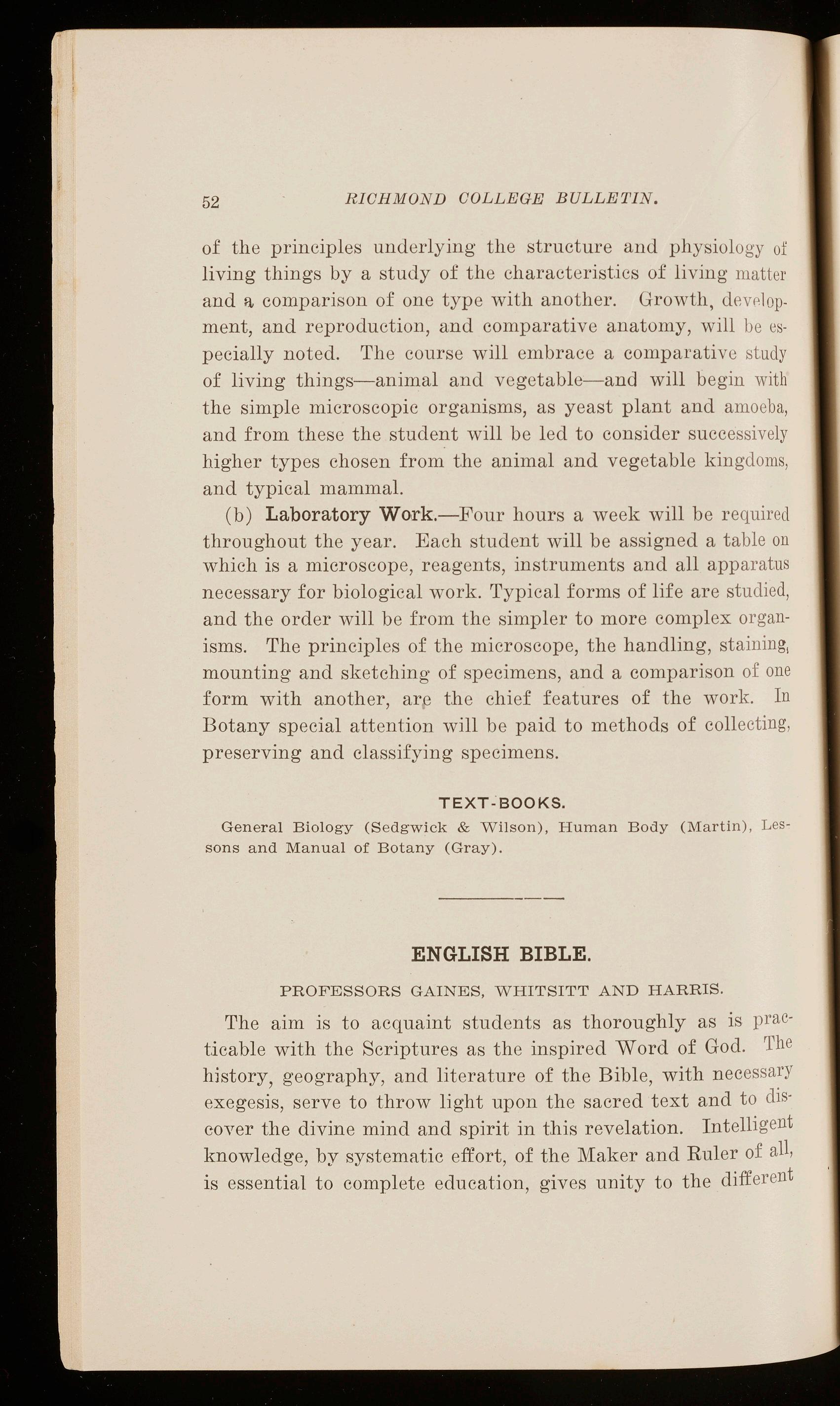
ENGLISH BIBLE.
PROFESSORS GAINES, WHITSITT AND HARRIS.
The aim is to acquaint students as thoroughly as is practicable with the Scriptures as the inspired Word of God. The history, geography, and literature of the Bible, with neces sary exegesis, serve to throw light upon the sacred text and to discover the divine mind and spirit in this revelation. Intellig ent knowledge, by systematic effort, of the Maker and Ruler of all, is essential to complete educa tion, gives unity to the differ ent

<lcpartmc nts of human le?,rning, and is due to Him ''who Jightcth cYery man that cometh into t h e world." 'l'he courses are adapte d to students of all grad es, with no reference to any par ticula r profession in view. rrhey ar c fr ee to all matriculat es of the Coll eg e. rrhere will b e thr ee courses of study-one in the Gospels, on e in th e A cts and Epistl es , and one in '' Old Testament Ch a ract ers.'' Th ese cours es will b e conducted by Professors Gaines, Whitsitt and Harris in the order named. Each class will r ecite once a week at an hour to be announced at the organization of the class. A credit of one point will be alloweu on eavh of th e three courses: provided, however, that no student shall be cr edit ed in any year with mor e than one point. It is forthrr provid ed tlrnt a credit on Bible work shall not be included in th e fifte en r equir ecl points of the English-philosophic-a l grou p .
MR. DUNLAP.
MR. OZLIN.
Carefully arranged cours es in Physical Culture are offered fr ee of cost to every matriculate of the College. Two classes are give n daily exercises in th e gymnasium , and are instructed in the principl es of hygiene. All stud ents are urged to join one of th e class es. Each stud ent , on entering a class, is given a physi cal examination, in order that any lack of development may be noted and the proper exercise prescribed. At the close of the s ession's work the measurements are again taken, and, on tho basis of attendance and physical improvement combined, eer tifica tcs are awarded.
Hot and cokl baths are provided in rcrorns adjuining the gymnasium. which are kept open , withont ehargc, six days :in the Wrek. In the dressing-room ar c lockers , which may be rented hy stnd ents at :fifty cents each. The spacious campus affords ampl e opportunity for recreative exercise. Grounds are laid

RICHMOND COLLEGE BULLETIN.
out for foot-ball, base-ball, basket-ball, track athletics, and ten. nis. The College recognizes the intelligent care of the body as essential to intellectual power, and encourages every beneficent form of physical exercise.
These Lectures are provided for by '' The Thomas l\Iuseum Lecture Endowment" of $10,000, donated by his family in memory of the late President of the corporation, James Thomas, Jr. 'l'hey are delivered annually by eminent men of our own and foreign countries on Science, Philosophy, Art or Literature, and by special provision are open to the public without charge. The following distinguished scholar s have de~ighted large audiences and greatly stimulated lit erar y and scientific research:
Charles A. Young, Ph. D., of Princeton; IL Newell l\Iartin, Ph. D., of Johns Hopkins University; W. T. Harris, LL. D., United States Commissioner of Education; President D. C. Gilman, of Johns Hopkins University; Robert Y. 'l'yrrell, Univer· sit.y of Dublin, Ireland; Horace H. Furness, Ph. D., LL. D., of Philadelphia; Professor C. T. Winchester, A. M., of W 'csleyan University; Albion W. Small, Ph. D., of Chicago Universit y; G. Stanley Hall, Ph. D., LL. D., President of Clark University; James Henry Breasted, Ph. D., of Chicago University; President Woodrow "\iVilson,Ph. D., LL. D., of Princeton University; President Benjamin Ide Wheeler, Ph. D., LL. D., of the University of Califormia; Hamilton Wright Mabie, LL. D., of New York; Sir Robert Ball, of Oxford; Henry Van Dyke, LL. D., of Princeton; Mr. Lorado Taft, of Chicago; Profe ssor Arlo Bates, of the Massachusetts Institute of Technol ogyi Professor John B. Clarke, LL. D., of Columbia Univers ity; Professor Josiah Royce, LL. D., of Harvard University; Professor vV. P. Trent, Ph. D., of Columbia University; Profe ssor
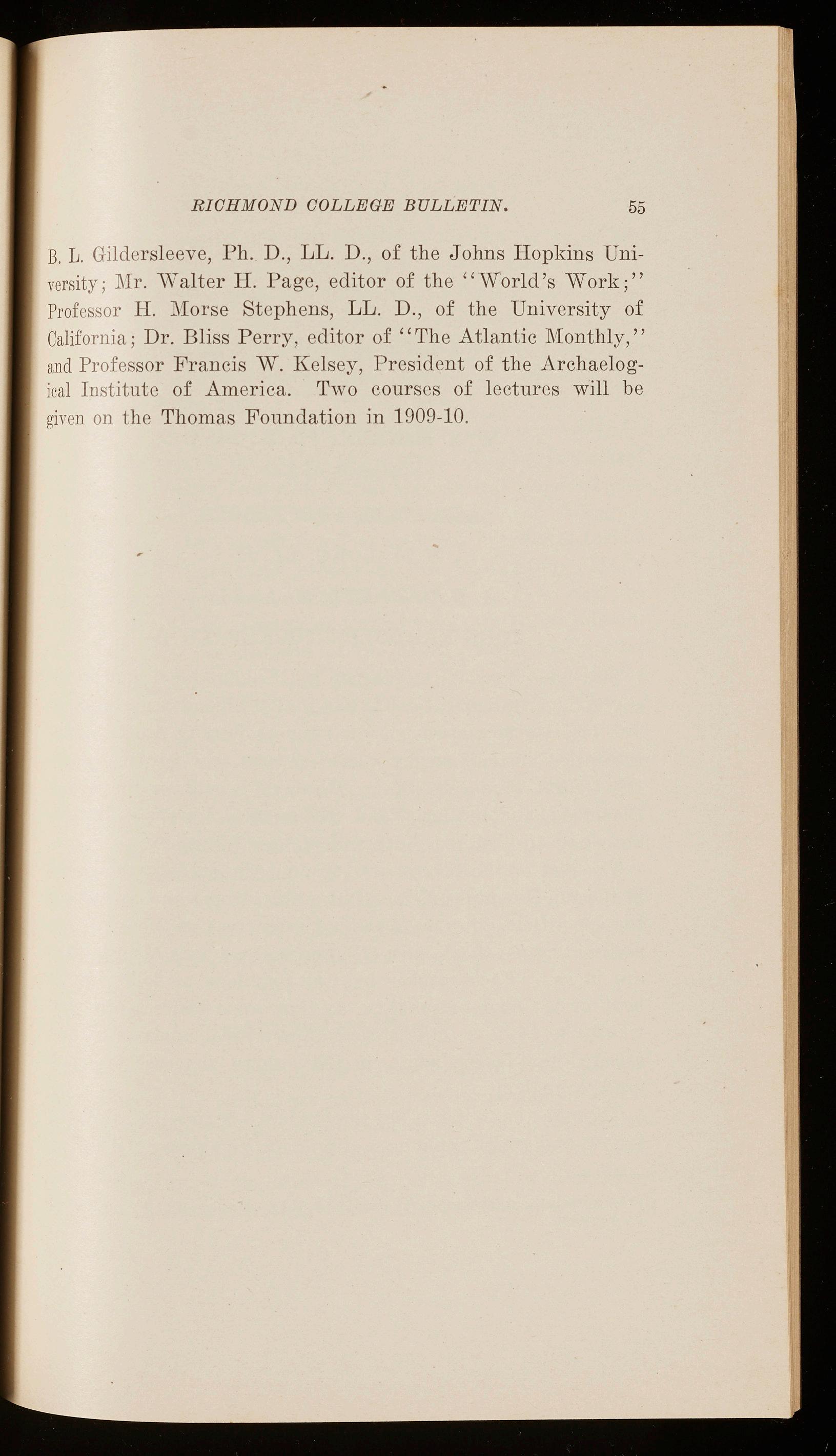
B.L. Gilder sleeve, Ph. D., LL. D., of the Johns Hopkins Unirersity; l\Ir. walter H. Page, editor of the "World's Work;" Professor II l\Iorse Stephens, LL. D., of the University of California ; Dr. Bliss Perry , editor of '' The Atlantic Monthly,'' and Professo r Francis W. Kelsey, President of the Archaelogical Instit ute of America. Two courses of lectures will be gircn on the Thomas Fonndation in 1909-10
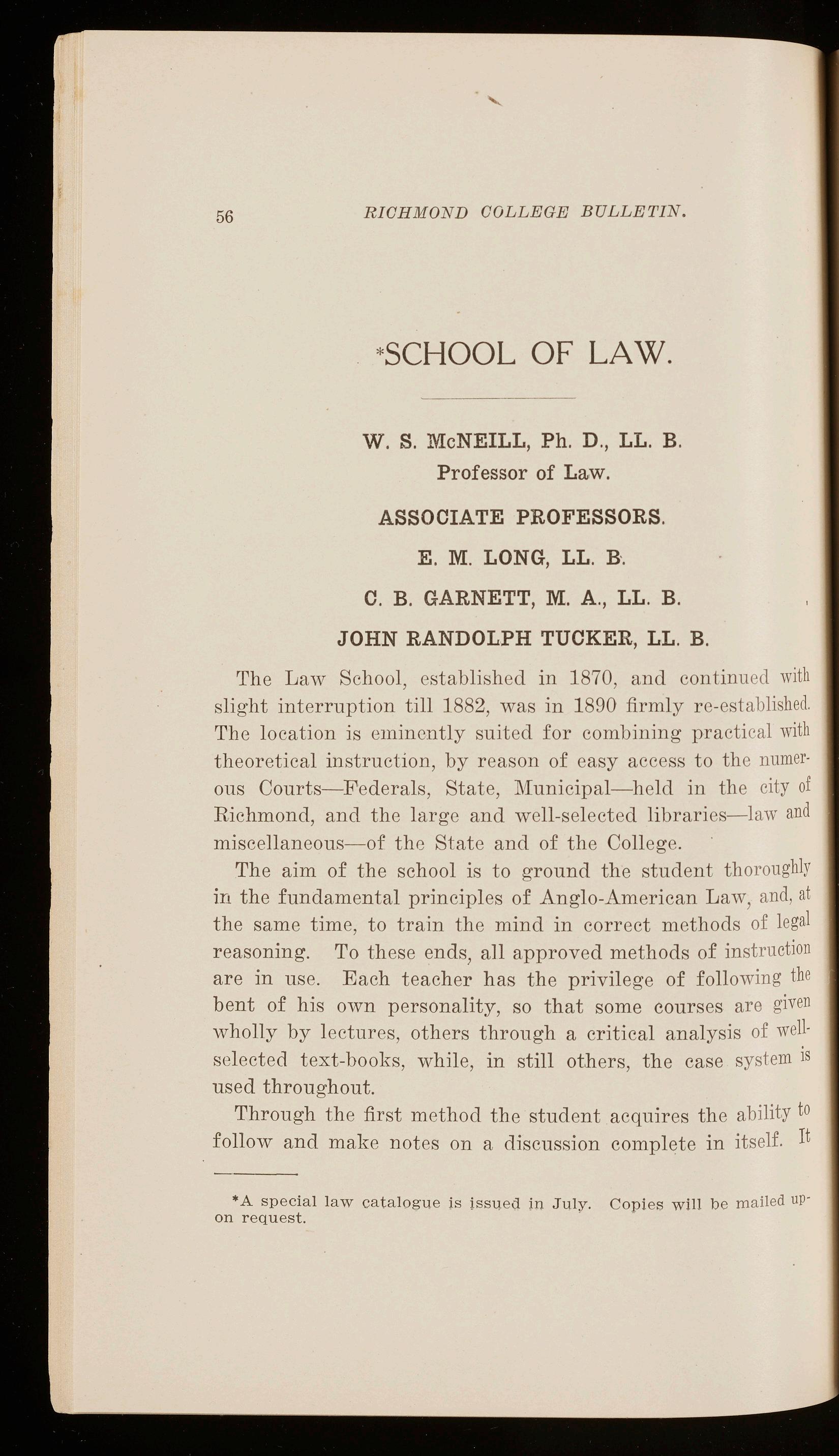
W. S. McNEILL, Ph.D., LL. B. Professor of Law.
C. B. GARNETT, M. A., LL . B.
JOHN RANDOLPH TUCKER, LL. B.
The Law School, established in 1870, and continued with slig ht interruption till 1882, was in 1890 firmly re-est ablished The lo cation is eminently suited for combining practi cal iYith theoretical instruction, by reason of easy access to the numerous Courts-Federals, State, Municipal-held in th e city of Richmond, and the large and well-selected libraries-l aw and miscellaneous-of the State and of the College.
The aim of the school is to ground the student tho roughly in the fundamental principles of Anglo-American Law , and, at the same time, to train the mind in correct methods of legal reasoning. To these ends, all approved methods of in struction are in use. Each teacher has the privilege of following the bent of his own personality, so that some courses are given wholly by lectures, others through a critical analysis of wellselected text-books, while, in still others, the case system is used throughout.
Through the first method the student acquires the ability to follow and make notes on a discussion complete in itself. It
• A special la w catalogue is jss1.1ed in July. Copies will be mailed up· on request. ·

is of first -rate importance for the practicing lawyer to be apt in analyzing a legal exposition while it is being delivered. By means of the second method, the student is thoroughly drilled in mastering the deductions of eminent text-writers. 'l'o these are added the criticisms of the instructor and also statutory changes and cases which have appeared since the publication of the text.
1'he pr imary purpose of the third method is to develop independent analysis on the part of the student. To that end actual decisions arc taken from the official reports and collected into convenient book form. The cases are classified according to subject-matter, and so arranged as to bring out the historical growth of the particular branch of law in question. Headnotes of the reports are omitted in the case book, so that the student ha s nothing to work on except the facts, the arguments of counsel, and the decision of the court. From this matter the stude nt must find ·what principle of law was actually decided. In this he will be aided by cases, similar, but varying in facts, put to him in class by the instructor and fellowstudcnts. 'l'hus the b;:,ginner soon learns that he must base his position on sound legal reasoning and careful discrimination , or give it up as untenable. It is believed that the rapid cross-firing of class -room argument is a valuable stimulus to careful ye t quid-: thinking. By these methods of instruction the stude nt having traced the life of the law, is enabled to appreciate its reason, and is in position readily to classify and select th e correct principles that underlie any contested right.
There are two classes in the School. Regular attendance, satisfactory daily recitations and written examinations in the subjects of each class are require for graduation. No student will be permitted to enter the Senior Class who has not completed satisfactori ly the work of the Junior Class, or its equivalent. N o stuclrnt may take the work of both cla sses in one
yrar. Each app li cant for admission must give evidence of fair general edl'tcation.
The courses, divided according to classes, are as follows: Junior Class.
1. Personal Property, including Wills and Administrat i on, Bailm e nts and Carriers.
2. Domestic Relations.
3. Criminal Law.
4. Contracts.
5. Torts.
6. Negotiable Instruments.
7. Constitutional Law .

Senior Class.
l Rea l Property.
2. Sales.
3. Corporations
4 Pl ea ding and Practi c0
5. Evidence.
6. Equity.
7. Bankruptcy
8. Suretyship.
Se t tlement, Col onies, States and Union. Teutonic customs, their modified reproductions, and the evolution of the Constitution. Form and distribution of powers of govern ment. Checks and balances 111administration, and in relation of State to Federa l Government. Limitation of legis l ature and extension of judicial po,vcr. Implied powers. Regulations of commerce. Police power Protection of rights and guarant ees of liberty, equality and property. Jury tria l , habeas corpus, expost facto l aws, due process of law and obligations of contract. 'l'erritories. Amendments.
Cooley's Principles of Constitutional Law.
One ho u r a week.
The effort is made to make t h is course a practical one. The su b j ects of study embrace the form of a w ill , capacity to make a will, alteration and revocation of wills, and other rel ated

topics; appointment and qualifications of executors and administr ators, th eir powers, duties and liabilities; matters of probate, an d other kindred subjects.
TEXT-BOOK.
To J:>e announced .
This course cov ers the principles of law applicable to the marriage r elation; separation and divorce; parent and child; guardia n and ward; infants and persons under disability; master and servant.
TEXT-BOOK.
Tiffany's Persons and Domestic Relatlon,s; l e ctur e s and sel e ct e d cases, Virginia Cod e citations.
Two hours a week , first half year.
In t his course a brief effort is made to dissociate tortious " wrong s" from breaches of contract, and from crimes. Then is discussed in detail the fundamental nature of any Tortwhich involves a study of proximate cause, of when the illegal conduct of the plaintiff may bar his action , of the essence of negligence, of the standard and degrees of care, of contributory and imputed negligence.
The r emainder of the time is devoted to an analysis of the more important specific Torts-e. g., the duty of land-owners to tra v elers upon the highway, to trepassers, to licensees, to invite cl persons. Further, the general liability for fire or explosives , for in:inries caused by animals, for deceit, for defamation , for malicious prosecution , and for influencing the condnct of third persons.
'l'l1e latter topic leads to the troublesome subject of "labor li1ig-::ition." now so warmly contested in the co11rts. The his-

torical study of selected cases lends itself with strikin g force to this br anch of the law.
TEXT-BOOK.
Ames' and Smith's Cas e s on th e Law of Torts. 2 Vols. and Sup ple ment. Five hours a week during the wiI1ter term.
The general principles of bailments arc first examin ed, and the application of those principles to the subject of carr iers is then closely studied.
TEXT-BOOK.
Goddard's Cases 011 Bai l mo!lts and Carriers.
This course purposes to disclose the familiar princip ks involved in common-law crimes. To that encl, the student is first acquainted with the sources , then mnch time is spent in forming a notion of the nature of any crime as exhihitrd in the combination of an act and an intent.
Then follows a study of the parties to a crime-e. g accessories, principals in the various degrees, and agents. Whereupon are consiclrrrd the different ddences-0. g. , publi c ancl domestic authority, prevention of fe lony , protection of the person, of other prrsons and of property.
The remaining consideration of substantive criminal l aw is devoted to the leading sprcific crimes-e. g., those again st the prrson (assault and battery. rape, homi cid e), and those a gainst property (larceny, embezzlement ancl false pretenses).
TEXT-BOOK.
Beale's Caf.es 011 Criminal Law (fir 0 -t edition).
Five hours a week during the winter term.

This course includes a cons id er ation of the origin and d evelopment of the Law Merchant; the formal and essential requirements of negotiable in struments - e. g , promissory notes, bills of exchange ( or drafts) and checks; their issuance, indorsemrn t and transfer, presentment and acceptance; t:he pi·otest t h ereof, notice of di shonor , and the nature of the duties and liabilities of the respective parties thereto.
Pr act ical exe r cises in the class-room, and numerous exhibits, assist the stude nt in app lying the rules and principles of the text to ac tual sit u ations.
TEXT-BOOK .
Huffcu t on Negotiable Instruments; l ectures a n d sel e cted cases
Two hours a week first half year.
The importance of tl1is subject as a legal mind builder, if for no other reason, necessitates its elimination from the general subject of personal property ri ghts. Roughly , the cours e may he divided into three parts -(1) the formation, (2) the operation, and (3) the discharge of a contract. Under the first are worked out mutual conse nt , or offer and acceptance, th e nature of form and conside ration , the capacity of parties, reality of consrn t , and the l ega lity of the object.
The second part has to ao with the privity and assignment of contrac ts. as also joint obligations. Under discharge of contracts are conside r ed r escission, rel ease , accord and satisfaction, ar bitration and award, repudiation.
TEXT-BOOK.
Huffcut & Woodruff; Cases on Con t ract (s econd ed ition). F or R e ference -A mmon , B i shop, Clark, Harriman, Metcalf, Ansan. Pollock.
F ivr ho urs a week , spring term.
Complaints, parbes, jurisdiction, form and institutio n of suit. Issues, pleadings and trial, exceptions, instructions, ju dgment, its arrest and suspension. Writs of error, and per fection of record for appellate review. Executions forthcomin g and delivery bonds. Mandamus, prohibition, quo warranto , habeas corpus, common -law practice and statutory modi fications Forms and practical examples.
TEXT-BOOK. to b e announced.

Three hours a week.
This course begins with an introductory study of th e nature of real property and an examination of the feudal syst em, so far as it has affected the law of r eal property. Th e rights arising from the ownership of land are thoroughly d eveloped by a study of the text and selected cases. Emphasis is placed on the fact that the law is an expression of the will of human society, and changes to meet its needs; and an attempt is made to enable the student not merely to appreciate the hi storical development of a doctrine, but, al so: from practical examples to learn the human need calling for the change. Th e course embr~ces the nature and origin of real property, the th eory of estates, their classification and development, the equitable ownership of land, the rights of enjoyment incident to ownership, the right to dispose of land not based on ownersh ip, the transfer of rights in land, both inter vivos and by ·will, and the subject of liens.
TEXT -BOO KS.
'l'iffany on Real Property, 2 Vo l s.
Twohours a week.
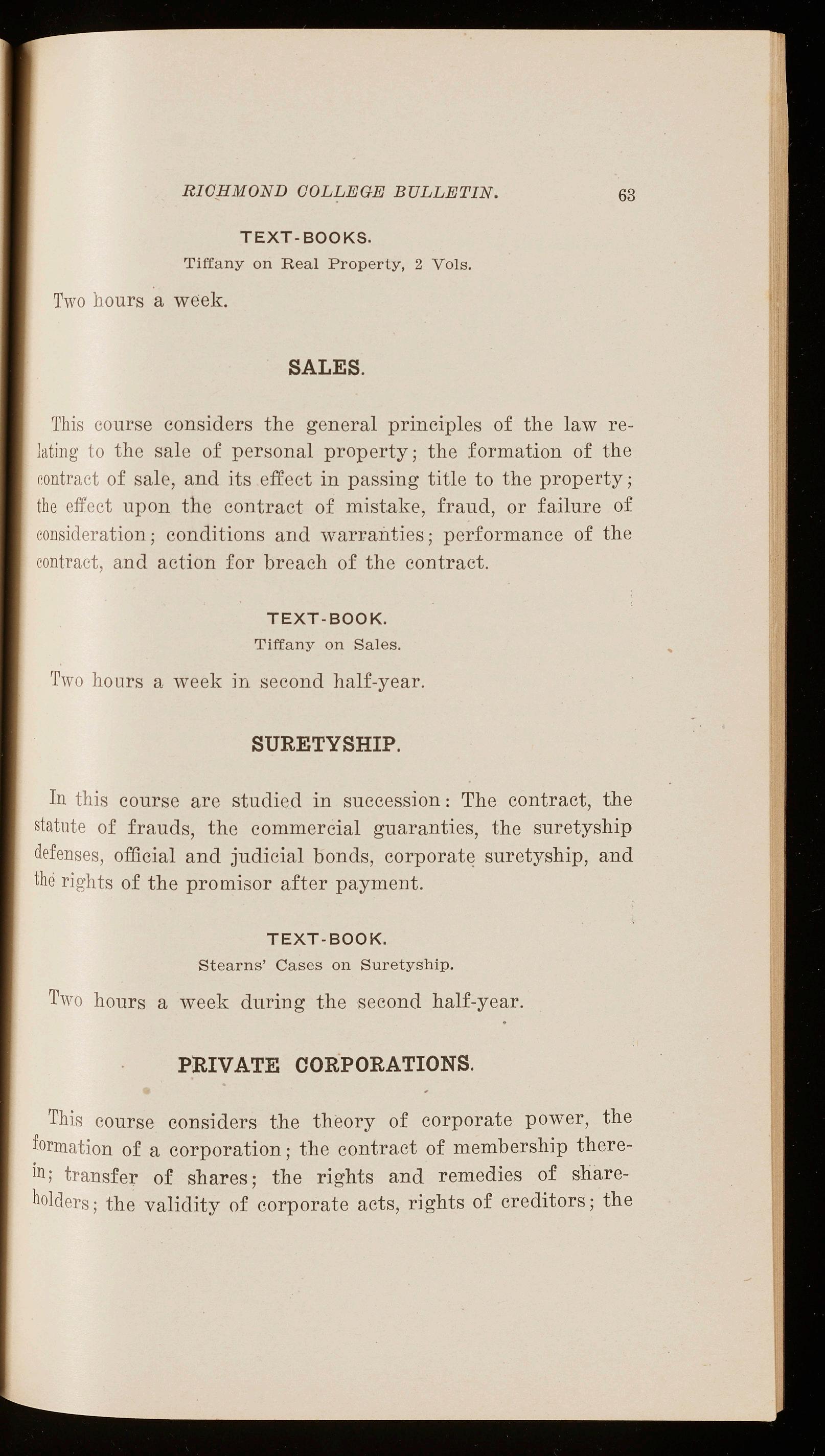
This course considers the general principles of the law relating to the sa l e of personal property; the formation of the r.ontractof sale, and its effect in passing title to the property; the effect upon the contract of mistake, fraud, or failure of considera tion; condit i ons and warranties; performance of the contract, and action for breach of the contract.
TEXT-BOOK.
Tiff a ny on Sa l es.
Two hours a week in second half-year
In this course are studi ed in succession : The contract, th e statnte of frauds, the commercia l guaranties, the suretyship defenses, official and judi cia l bonds, corporate suretyship, and theri ght s of the promisor after payment.
TEXT-BOOK
Stearns' Cases on Suretyship.
Two hours a week during the second half-year.
'rhis course considers the th eory of corpo rate power , the formation of a corporation; the con tra ct of membership therein; transfe r of shares; the rights and remedies of shareholders; the validity of corporate acts, rights of cre ditors ; the
COLLEGE BULLlJTIN.
consolidation of corporations, and their insolvency an d disso. lution, etc.
The Virginia '' act concerning corporations'' is specially treated. Practical ex ercises are given in the drawin g of charters, by-laws, · etc., and in the organization of corp ora tions.
TEXT-BOOK.
Elliott on Privat e Corporations ( ~d ed .); the instructor' s pr inted Eotes; l ec tures and selected cases.
Two hours a week.

In this course a study is made of selected cases upo n Equity Jurisdiction decided throughout the common-law worl d. The essential nature of e quity jurisdiction is th e first and final object of inquiry.
'1 1 0 this end are studied in detail the specific p erfor mance of contracts, the extent and limitations of eq uity jurisdi ction in reference thereto, and the legal consequences flowin g therefrom Further, the effect of the Statute of Frauds, and of the plaintiff's defauit as a bar to reli ef. The doctrine of mu tu ality of equitable relief is folly considered. Then attention is turned to equity jurisdiction with reference to obligat ions independent of contract. For that purpose are studi ed the specific reparation and prevention of Torts in waste, trespass, disturbance of easements, abatement of nuisances , and the rights of monopoly; patents, copyrights, and miscellan eous exclusive franch_ies.
TEXT-BOOK.
Ames' Cases in Equity Jurisdiction. Vol. I., Parts I- VI. For Reference.-Merwin, Bispham , Bigelow, Pomeroy, Van Zil e, Hea rd· Beach.
Three hours a week; fall and winter terms.

This course consiclcrs the cleve lopment of the Law of Evidence ; the subject of Judicial N otiec; questions of l aw as distinguished from qu estions of fact; pr esumptions, and the '' burdenof proof;'' admissions ancl confessions; opinion and hearsay CYidcnce; witnesses, and their examinations; writings, proofof handwritings, etc.
The ai m of 1.his course is to be thoroughly pract i cal, and to this Cll(l the student is req uircd to app l y the princip l es uf t h e subjectto a variety of facts ancl situations likely to arise in the trial of' a case
TEXT - BOOK .
McKelvey on Evidence; l ectu r es, and selected cases.
For Reference .-Greenleaf and \Vigrnor e on Evidence.
Two hours a week second half-y ea r
First, a brief review is made of all the stat u tes of bankruptcy in England and the Un ited States, showing the gradua l evolution fro m insolvency to bankruptcy conceptions.
'l1hen the American act of 1898, with subsequent amendments, is taken up in detail. The various provisions are work, ed out in the light of actual decision, with especial reference to thr respect ive jurisdictions of the United States and t h e seYeral States, what are acts of baukruptcy, what property passes to the 1rustee, who may be a bankrupt, how he is protected, exempted and cli schargrd.
TEXT - BOOK
Williston's Cases on Bankruptcy.
For Reference.-Brandenburg, Eastman, Collier, Lov e land.
Thrcr hours a week; spring term.

The Faculty reserves the right to rearrange subjects between classes, and to change text-books, as may be deemed beneficial to the school.
Every student is expected to attend all sessions of the cla ss of which he is a member, and to be prepared, whenever call ed upon, to recite upon the matter assigned. A record of such attendance and class recitation is kept, and is taken into consideration in awarding prizes and diplomas.
Students are advised personally to take notes of all lectures, and carefu lly to study the authorities · and important cases, to which frequent reference is made during the course of i nstruction. Such investigations may be made either in the law library of the school, or in the Supreme Court Library, to which students have full access.
The Professional Degree of Bachelor of Laws (LL. B.) is conferred by the Trustees on r ecommendation from the Faculty. This degree can not be given either in course or as an honorary degree.
For Bachelor of Laws is required graduation on all subjects included in the Law School, with proficiency in general education.
Students who complete th e required ·work in any subject are awarded certificates of proficiency in that subject, and are not required to study the subject again in order to win the degree of Bachelor of Laws.
All candidates for degrees are expected to present themselves at the closing exercises of the College Commencement, at which time degrees are conferred. It is the custom of the graduating class to wear the Oxford cap and gown on this occasion.
Fees in Junior Class.

Fees in Senior Class.
Matriculation ...................................
The matriculation fee, the contingent fee and half of the tuition fee are payable at entrance. The second half of tuition te e is payable in Febrnai-y. No honors are announced until all fees are paid in full.
*LAW CLASS SCHEDULE, 1909-1910.
Day<' .9 to 10 A. M. 10 to 11 A. M. 1\fonday .... Domestic Relations (1) .... Sales (II) Equity (II) ............ ... Criminal Law
Tuesday .... Domestic Relations (I) ..... Sales (II) Equity (II) ............... Criminal Law (I)
Wednesday.Equity (II) . . . . . . . . . . . Criminal Law (I) 'l'hursday ... Criminal Law (I) ......... Criminal Law( (I)
Friday .... Personal Propert? (I) .. . Constitutional Law (I) Pleading and Practice (II) Real Property (II)
Saturday ... Personal Property (I) ..... Constitutional Law (I) Pleading and Practice (II). Real Propei-ty (II)
*Subjects included in the Junior year are marked (I). and those in the Senior year are marked (II) In the l atter part of the session, the subject o,f Negotiable Instruments (I), will be taught at th e hours assigned above to Domestic Relations (I). The subject of Sales (II), will be followed at the same hours by Corporations (II). The hours assigned in the schedule to Criminal Law (I) will be given to Torts (I), in the Winter Term, and to Contracts (I) in the Spring Term. In the Spring Term Bankruptcy (II) takes the place of Equity (II). Evidence (II) will be given the second half year. All other subiects are taught throughout the year at the hours named in the schedule,

CHARLES H. RYLAND, D. D., LIBRARIAN
The Library of the College contains 15,000 volumes, and, as a department, is one of the best-equipped in the College. It is catalogued according to the Dewey System, and is up-to-date in every essential feature. The hall in which it is located is an exceptionally fine room, one hundred by forty feet, with an elevation of eighteen feet. The alcoves are quiet, well light ed, steam heated and have good ventilation. To utility and beauty is added the inspiration of Art. Paintings and sculpture throw a charm over the whole. While the literary treasures of the College are provid ed with such an attractiv_e home, they are not withdrawn from the student. No part of the College is more freely open to the student body. No fee is charged. Appreciation of the advantages offered and propri ety of conduct are the only requirements for th e free u se, during the entire day , of the hall and its bounties. The Librarian and his assistants are constantly in attendance to give h elp in any line of research or reading. The use of the Dictionary Catalogue is carefully explained. In a word, the aim of the management is to afford agreeable educational pastim e for students at leisure, and to promote by the b est m et hods and amplest resources scientific res earc h and critical study for those who need to pursue lines of investigation. - Encyclo' paedias, lexicons, and a full lin e of other reference books and student helps are at hand in open cases, while reading tables , supplied with the best current literature, American and foreign, are acc ess ible at all hours.
The Catalogue shows a supply of the best authors, selected with special r eference to class work and a generous culture. The books may not only be freely consulted in the hall, but arf' loaned to those who desire longer time for research. During

the past session nearly 5,000 volumes were loaned to students. covering a wide range of general literature-poetry, fiction, history, biography, science, philosophy and religion.
Under the direction of the Library Committee, in consultation with the Faculty, new books are constantly added, and in all purchases special reference is had to the needs of the student. Vi7hat the College can not furnish, the
readily supplies This great treasure-house of books is open to our students, and is freely drawn upon. The kindness and courtesy of the official s of the State Library are h ereby acknowlrclgecl. Every year morr cl early demoml,rates the excellent advantages our students possess in their proxmity to this sp l endid library, so admirably managed £or the public good.
The College Library Hall is freely supplied with the best current literature. There are upon the tables thirty monthlies and quarterlies and ten weeklirs and the best dailies.
The College Library and Reading Room are not only sc1entific and litrrary in their equipment, but contribute freely to the religions life of the College. Six religious monthlies and quarterlirs. with twelve of the best weeklies, are laid every clay before the student. A fine line of books on the
70
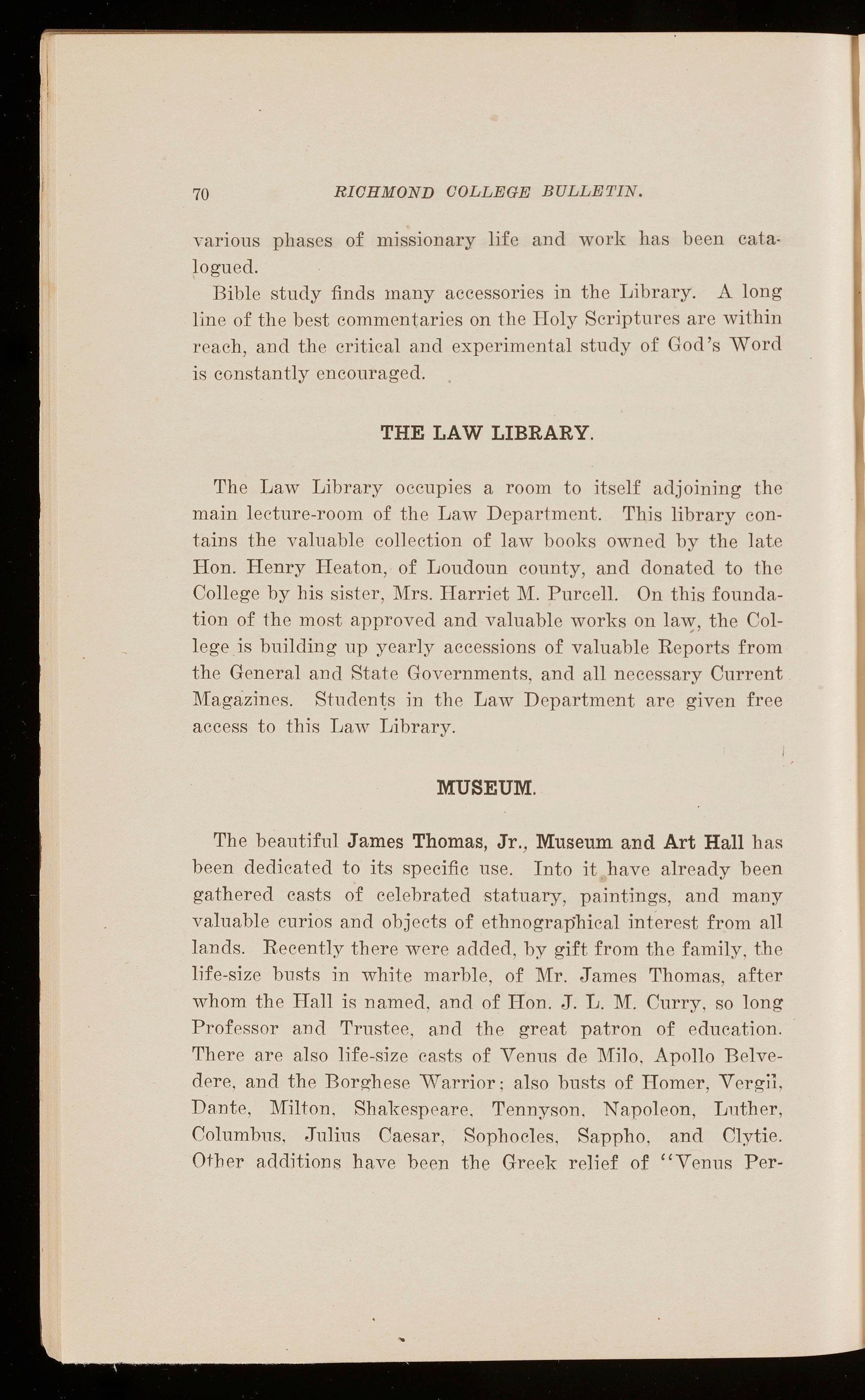
RICHMOND COLLEGE BULLETIN.
var10us phases of missionary li fe and work has been catalogu ed.
Bible stu dy finds many accessories in the Library. A lon g lin e of the best commentaries on the Holy Scriptur es are within reach, and th e critica l and exper im ental study of God's Word is constantly enco ur aged.
Th e Law Library occupies a room to itself adjo ining the main l ecture -ro om of th e Law Department. This library contains the va lu ab l e coll ect ion of l aw books owned by the l ate Hon. H en r y Heaton , of Loudoun coun ty, and donated to the Coll ege by his sister, Mrs. Harriet l\'L Purcell. On this foundation of th e most approved and valuable works on law , the Coll ege is building up year l y accessio ns of valuable Reports from the General and State Governments, and all n ecessa ry Current Magazines. Studen~s in the Law Departm ent are given free access to this Law Library.
The beautiful James Thomas, Jr. , Museum and Art Hall has been dedicated to its spec ific use. Into it h ave alr eady been gathered casts of cel ebrated statuary, paintings, and many va lu ab l e curio s and objects of et hn ograp hi cal interest from all l a nds. Recently there were added, by gift from the family, the life-siz e bu sts in white marble, of Mr. James Thomas , after whom th e Hall is named , and of Hon. J. L. M. Curry, so long Professor and Tru stee, and the great patron of edu cat ion . There are also li fe-size casts of Venus de Milo. Apollo Belvedere. and the Borghese ·warrior; also busts of Homer, V erg ii.. Dante, Milton , Shakesprare. T en nyson . Napoleon, Lnth er , Columbus. Juliu s Caesar. Sophocles. Sappho. and Clytie. Otber additions have bern th e Greek relief of "Venus P er-

· RIOHMOND COLLEGE BULLETIN. 71
suading Helen to Follow Paris," Thorwaldsen 's "A pollo and the Muses,'" and a large oil painting. "Paul and Virginia," by Mrs. Emilie Lasar, of Portland, l\Iainc. By a suitable arrangement of cases, there is an attractive display of rare curiosities from our own and foreign land s, the gifts of trustees, alumni, and generous friends. Rev. Hugh P. McCormick, of Porto Rico, and l\frs. W. E. Hatcher, of Richmond, ha,ve filled cases that are of exceptional value. A valuable collection has also been received from Rev. R. E. Chambers, of Chi na, and from Rev. ·w. l\IcS. Buchanan, of Japan. Girts of statuary, paintings, photographs, and objects of artistic or Listorical interest are gladly received. Among recent gifts are a fine portrait of l\'Ir. Edwin '\¥ ortham, long a trustee and the treasurer of the College, presented by his son; a portrait of C. H. Ryland, D. D., presented by the Trustees of the College; a portrait of Tiberius Gracchus Jones D. D., presented by members of his family, and a picture presented by the class of 1909. The Librarian is curator , and contributions sho uld be forwarded to him.

T,vo literary societies, k.no,vn as the l\Iu Sigma Rho and Ph il ol ogian, are mai~tained by the students, 11-ndare recognized as agencies of great value in schola5ti<: training. Thl>y are provided with elegant ha ll s, where they hold week l y meetings for declamation, debate and other literary exercises . Besides the joint oratorical contest held in the spring, each soc i ety arranges for at least one public debate during the sess 10n. 'rl1e two societies unite in publishing '' 1'he l\Iessenge r , '' a monthly magazine of about seventy-five pages . A generous rivalry is maintained between the two organizat i ons by the joint offer of an orator's medal and a writer's medal, and among the ind ividual members by the offer in each society of a me d a l for dec l amation or improvement in debate, and for the best debater. The medalists for 1909 were as fo ll ows:
PHILOLOGIAN SOCIETY
Bes t Debater's Medal .... ........................... J. G. BARBE, Va.
Best Reader's Meda l ......... J. G. BARBE, Va
Improvement in Debate ............. , S. A CALDWELL, La.
Joint Writers Medal J. F. GULICK, Va.
MU SIGMA RHO SOCIETY .
Best Debater's Medal . ................... . J. B. PETERS, Va.
Declaimer's Meda l , ........ HENRY P01¥ELL, Va.
Joint Orator's Medal ........................ RUSSELL G. SMITH, Va.
The literary societies ho l d membership in the Virginia State intercu ll eg i ate Ora t orica l Association, wh ich i s composed of t h e socie t ies of the l ea d ing coll eges and univers it ies of V ir gin i a. The I ntercollegiate Debate of 1909 was with Rando l p h -Macon

RICHMOND COLLEGE BULLETIN. 73
College, and the silver cup was won by representati vcs of H,ichmond College.
During the season of 1895-'96 the Richmond College Law Association was organized by students of the School of Law for the discussion of literary and legal questions. Meeting& arc held once a week.
'l'h c students maintain an a ct iv c Young l\Ien 's Christian Association , whose object i:,;to promote the spiritual and moral welfare of th e College and to do religious work in the city . The Association has charge of a ll prayer-meetings in College and its members conc1uct services or teach Bible classes at the City Hospital. the Confederate Soldiers' Home, the Locomotive ·works, the Home for Incurables, and at several mission stations in the suburbs. A pleasant feature of the work in College is the arrangement made for meeting n ew students upon their arrival, and showing them many needful courtesies.
Connected with the Association is a flourishing Missionary Society, which meets once a week for study of the habits, customs, prevailing religions and geography of foreign countries. The Society owns an independ ent library.
Th e Y. J\'I. C. A. has excellent rooms exclusively for i\s own use.
Outdoor sports are fostered and encouraged at Richmond College. Details of management are entrusted to the Athletic Association, composed of students and professors, but the Pr esi dent and Faculty exercise general contro l. The annual

74' RICHMOND COLLEGE BULLETIN.
Field Day contests are admirable incentives to physical culture.
The following regulations governing Athletics have been adopted by the Faculty:
1. The President of the College has general oversight and control of field and track athletics, an~l is authorized to forbid any f eatures il'l.1.hcse exercises whi ch en dang er the health or morals of the participants.
2. Only matriculat ed students are eligible to play on a College team in any public contest. The Faculty reserves th e right to remove from the t eam at any time any member who may neglect his class duti es, or prove hims elf m any way unworthy.
3. Memb ers of College t ea ms must maintain ari average of 80 per cent. in thr ee r egu lar classes , and may not fall below 70 per cent. in any one of the three classes. Wh enever any memb er of a team fails to maintain th e required average, he is notified of the fact in writing by the Presid en t of th e College, and this notic e dismisses him from th e team or t eams of which he is a m ember. Th e dismissal b ecomes effective seven days, including day of noti ce, from the dat e of official notification, and the student receiving noti ce may not again represent the College on an athletic t ea m until h e has made thP r equired average in his classes and has b een formally reinstated.
4. Each team is allowed four trips from College, provided that these four trips do not involve being away from College more than six school days. All proposed games must hav0 the approval of the Presid ent of the College before engagements are . made.
5. No Stud ent und er twenty-one y ears of age is permitted to become a m emb er of a regular team , except upon written

RICHMOND COLLEGE BULLETIN. 75
perm1ss1on from his parent or guardian, addressed to the President 0£ the College.
6. Athletic teams are permitted to engage in contests away from Richmond only with teams from other institutions of learning.
The Alumni 0£ the College have long been organized into a Society, which holds annual meetings to renew old associations, maintain a close connection with Alma Mater, and further the cause 0£ education and letters. For several years the custom has been to have an annual banquet on Tuesday of commencement week. The officers 0£ the Society are:
COL. THOMAS BRANCH McADAMS, Richmond, Va ........ President. REV. "IV. W. EDWARDS, Burts, Va ................ First Vice-President. DR. LIVIUS LANKFORD, Norfolk, Va ........... Second Vice-President. H. L. SCHMELZ, ESQ., Hampton, Va Third Vice-President. PROF. W. A. HARRIS, PH. D , Richmon(!, Va .............. Secretary. J. AUBREY SAUNDERS, ESQ., Richmond, Va .............. Treasurer.
Degree men are members of the Society without election, and all former students are eligible for election. The annual foe is $1.00.
In May, 1898, there was organized in Louisville a Chapter 0£ the General Society 0£ Alumni, which is known as the "Kentucky Association 0£ Richmond College Alumni." The Kentucky Association holds annual meetings in 1\fay. The present officers arc: Dr. S. E. -woody. Louisville, president; Dr.,¥. 0. Carver, Louisville, secretary and treasurer.
In February 1899 the alumni resident in Norfolk, Va., ancl ' ' vicinity organized a "Norfolk Chapter of Richmond College Alumni." The chapter holds annual meetings in February. The present officers are: S. T. Dickinson, Esq., Norfolk, presi-

76 RICHMOND COLLEGE BULLETIN.
dent; C. vV. Coleman, Esq., Churchland, secretary and treasurer.
In April, 1903, there was or ganizecl in Newport News, Va a "Peninsula Chapter of Richmond College Alumni." Ti1e Chapter will hold annual meetings. The president is George A. Schmelz, Esq., of Newport News.
During the session of 1905- '06 alumni chapters were organized in Richmond, Baltimore, Lync:hburg and Roanoke, The President of the College will be glad to correspond with a lumni who desire to form local associations.

Instruction is conveyed by the use of approved text -books, supplemented by oral explanations and additions, in some cases by more formal lectures, and in most of the classes by exercises to be written and carefully corrected. In every class in the schools of liberal arts the student is questioned on the assigned portion of the text or .the previous lecture. An account of the value of these recitations and exercises is kept by the professor, and the average standing for each month is calculated and entered of record for reference in determining his right to any of the honors of the institution. A student who, for any reason, is unprepared for recitation, or absent from class as many as three times in any month, is required to stand a special examination.
To the parent or guardian is sent, monthly, a transcript of this record of class-standing, ·with a statement of the absences of the student from his classes, and such other information as may be deemed important. By prompt and judicious attention on the part of those to whom they are addressed, these reports may be made of great value in promoting improvement and sustaining a just discipline.
Besides the dai ly questioning, there are held in every class three general examinations conducted in writing. These examinations are held at the close of the fall, winter and spring terms. All examinations are limited to three hours. Recitations are suspended during the examination per iod.
The answers furnished by each student to the examination

questions are carefully valued, and this valuation is equitably combined with the average of his class standing. If the mark of a student, as thus ascertained, amounts to eighty per centum, he is ranked in the '' first division'' ; if to less than this, but not less than fifty per centum, in the '' second division''; ii' to less than fifty, in the '' third division.'' If, however, the average class or examination standing for any term falls below 70 per cent. the student can not be ranked in the first division without taking a second time the work on which he failed. Only those students who attain rank in the first division, at all three examinations, are entitled to points in the estimates for degrees.
Certificates of "Distinction" are awarded to students who attain the first division at all examinations in any class, and their names are published or announced in the closing exercises of the session.
Students who fail to obtain certificates of distinction at the · regular examinations, or for any reason do not stand these examinations, have no right to pass to the next higher class in a department. Special examinations may be granted only by a vote of the Faculty. All special examinations for entrance to higher . classes must take place within the ten days beginning with the Tuesday preceding the opening of the College session.
Certificates of "Proficiency" are conferred on students in the School of Law who attain the first division at all examinations in complete subjects.
Diplomas are conferred on those who attain to th .e first division in the full course taught in each school or department, to-wit: Latin Language and Literature, Greek Language and Literature, French Language and Literature, German Language and Literature, Spanish Language and Literature , Eng·lish Language, English Literature, Mathematics, Physics, Chemistry, Philosophy and History.
I .. The Tanner Medal.-Founded by Colonel William E. Tanner, of Richmond, Va., in honor of his parents, John F. and
RICHMOND COLLEGE BULLETIN.
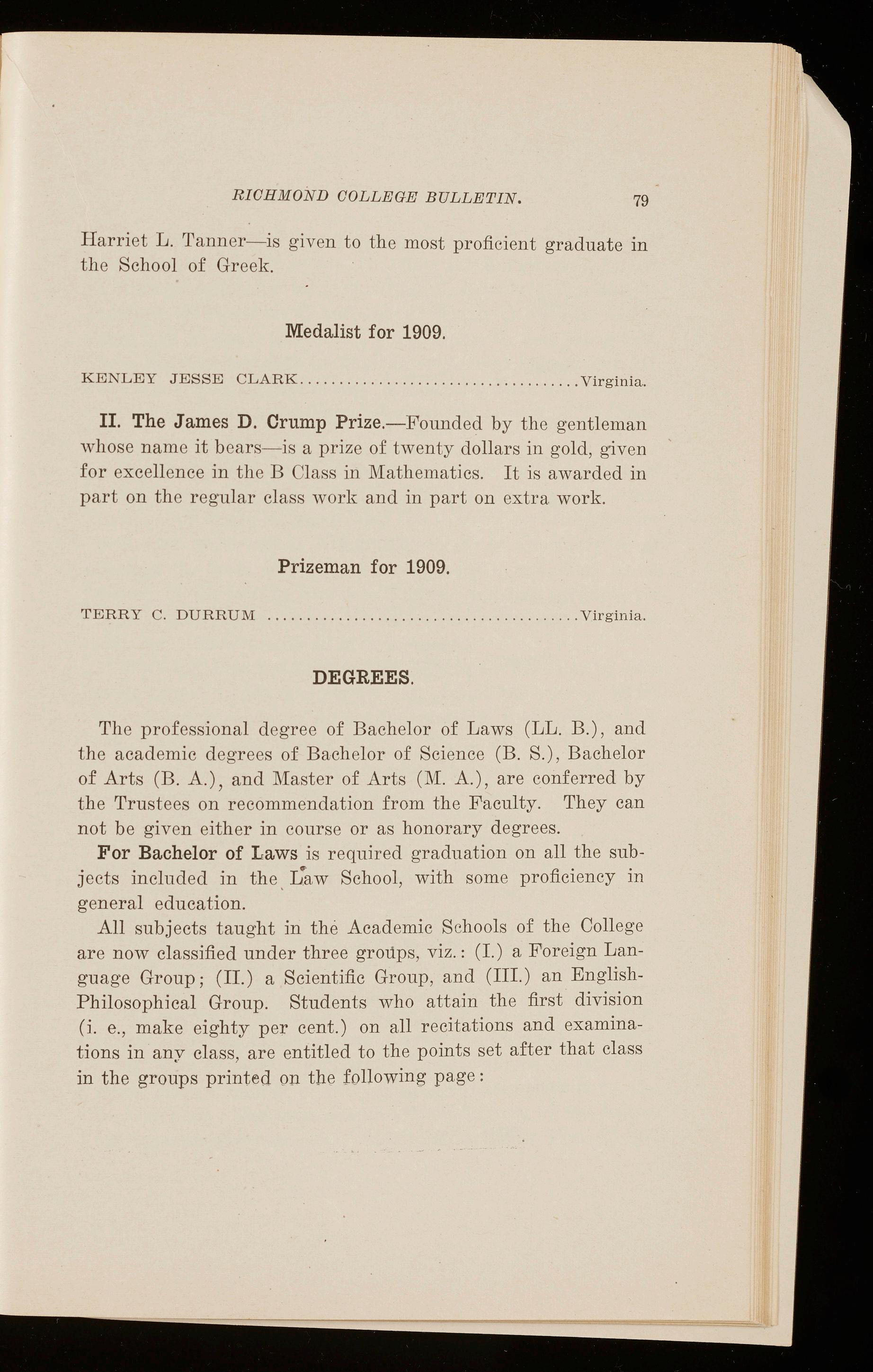
79
H arriet L. Tanner - is giv en to the most profi cient graduate in the School of Greek.
Medalist for 1909.
KENLEY JESSE CLARK .... .
. Virginia.
II. The James D. Crump Prize .-Founded by the gent leman whose name it bears - is a prize of twenty dollars in gold, given for exce ll ence in the B Class in Mathematics. H is awarded in part on the r egular class work and in part on extra work.
Prizeman for 1909.
TERRY C. DURRUM
Virgini a
Th e professional d egree of Bache lor of Laws (LL. B.), and t h e academic degre es of Bac h elor of Sci ence (B. S.) , Bache lor of Arts (B. A.), and ]\faster of Arts (M.A.), are conferred by the Trustees on recommendation from the Facu lty. They can n ot be given eit h er in course or as honorary degrees. For Bachelor of Laws is required graduation on all the sub - jects included in the Law School , with some proficiency in genera l education.
All subjects taught in t h e Academic Schools of the Coll ege are now class ified under three groups , viz.: (I.) a Fore ign Lan - gu age Gro up; (II. ) a Scient ific Group, and (III .) an English - Ph ilosophi cal Group. St u dents who attain the first division (i. e., make eigh ty per cent .) on all recitations and exam ina- t ions in any class, are entit led to the points set after that cl ass in th e gro ups p rinted on the foll owing page :


For Bachelor of S cience is required a tota l seventy points. Of this total, sixteen points, including ihe A courses in French and German, must come from Group I.; thirty -eight points, in- cluding l\Iathematics B and the A Course in Physics, Chem- istry and Biology, must come from Group II., and ten points, including the A course in English, must come from Group III. 'l'he remaining six points may be made up from any or all of the groups. Not more than six points may be counted in Draw- in!:!'.
F or Bachelor of Arts is required a total of seventy points, of "·hich twenty-four points, including one diploma and either Latin A or Greek A, must come from Group I.; fifteen points, including l\Iathcmatics A and Physics A, or Chemistry A, or Biology A, from Group II.; fifteen points, including the B course, or the B (II.) course in English, and not including the Bible course, from Group III. The remaining sixteen points may come from any or all of the groups.
The candidate for Bachelor of Science or Bachelor of Arts must submi L to the Faculty by l\Iay 1st of the year in which he expects to graduate, an ·oration or essay, composed by him- self, which he shall deliver in public at ihe close of the session, if so directed. To these papers must be appended a list of au- thorities consulted by the writer.
Candidates for any of the degrees mentioned above are re- quired to submit to the Faculty eight months before Commence- ment a written application for the degree sought, together with a statement of class-work already accomplished, and that which remains unfinished.
The applicant for the degree of Master of Arts must pre- viously have met all requirements for a B. A. degree. In addi- tion to this, he must obtain from the Faculty, at the beginning of the session in which he expects to take the lVf. A. degree, formal approval of his course of study, which shall constitute a full year of work. This course must embrace at l east two senior classes, neither of which sha ll have been offered for the B. A. degree. The most advanced class in each of the follow- ing departments counts as a senior: Latin, Greek, French, Ger-
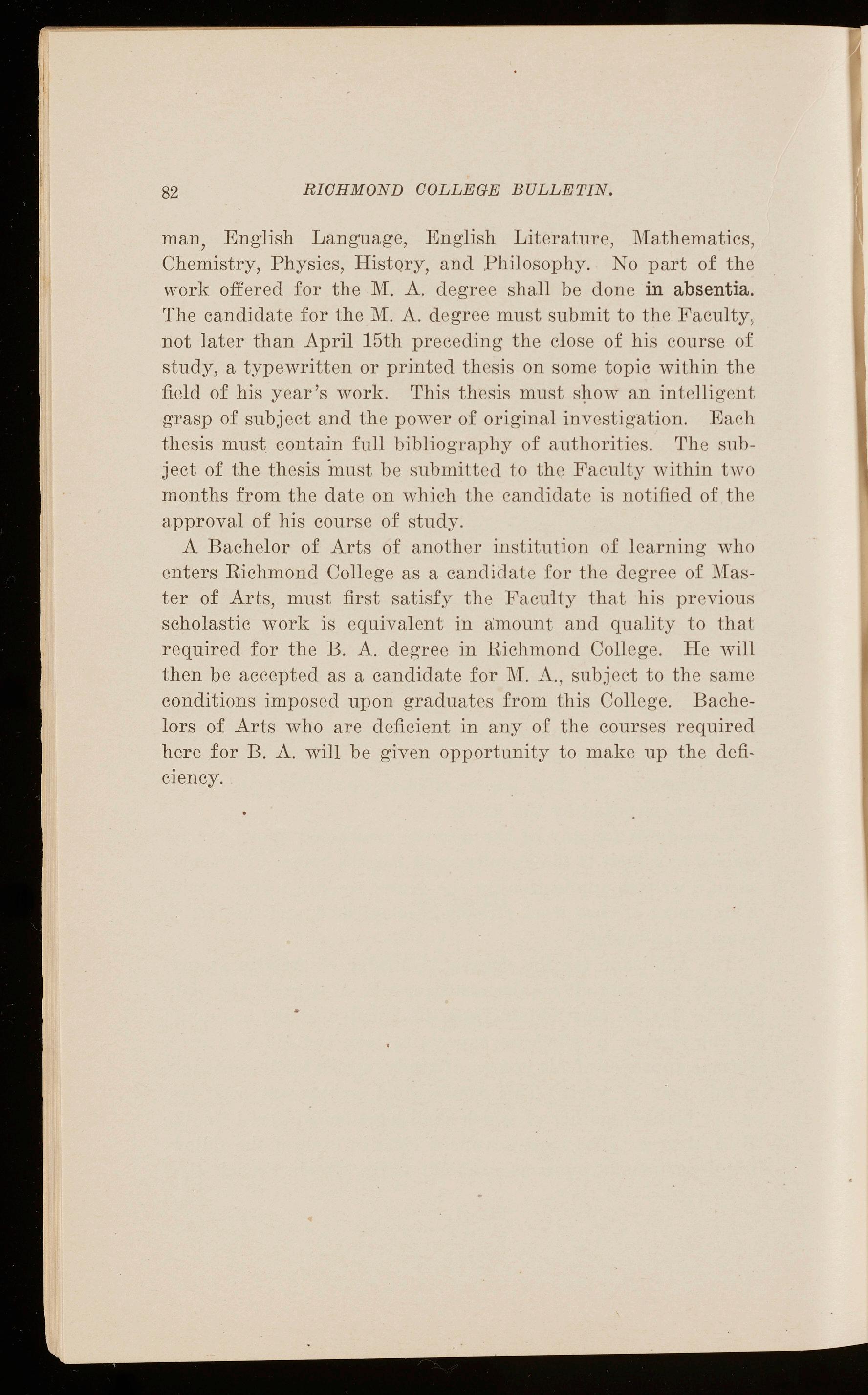
man, English Language, English Literature, Mathematics, Chemistry, Physics, History, and Philosophy. No part of the work offered for the l\lL A. degree shall be done in absentia. The candidate for the M. A. degree must submit to the Faculty , not lat er than April 15th preceding the close of his course of study, a typewritten or printed thesis on some topic within the field of his year's work. This thesis must s"µow an intelligent grasp of subject and the po~Yer of original investigation. Each thesis must _ contain full bib lio graphy of authorities. The subject of the thesis inust be submitted to the Faculty within two months from the date on which the candidate is notified of the approval of his course of study.
A Bachelor of Arts of another institution of l earning who enters Richmond College as a candidate for the degree of Master of Arts, must first satisfy the Faculty that his previom; scholastic work is equiva lent in amount and quality to that required for the B. A. degree in Richmond College. He will then be accepted as a candidate for U. A., subject to the same conditions imposed upon graduates from this College. Bachelors of Arts who are deficient in any of the courses required here for B. A. will be given opportunity to make up the deficiency.
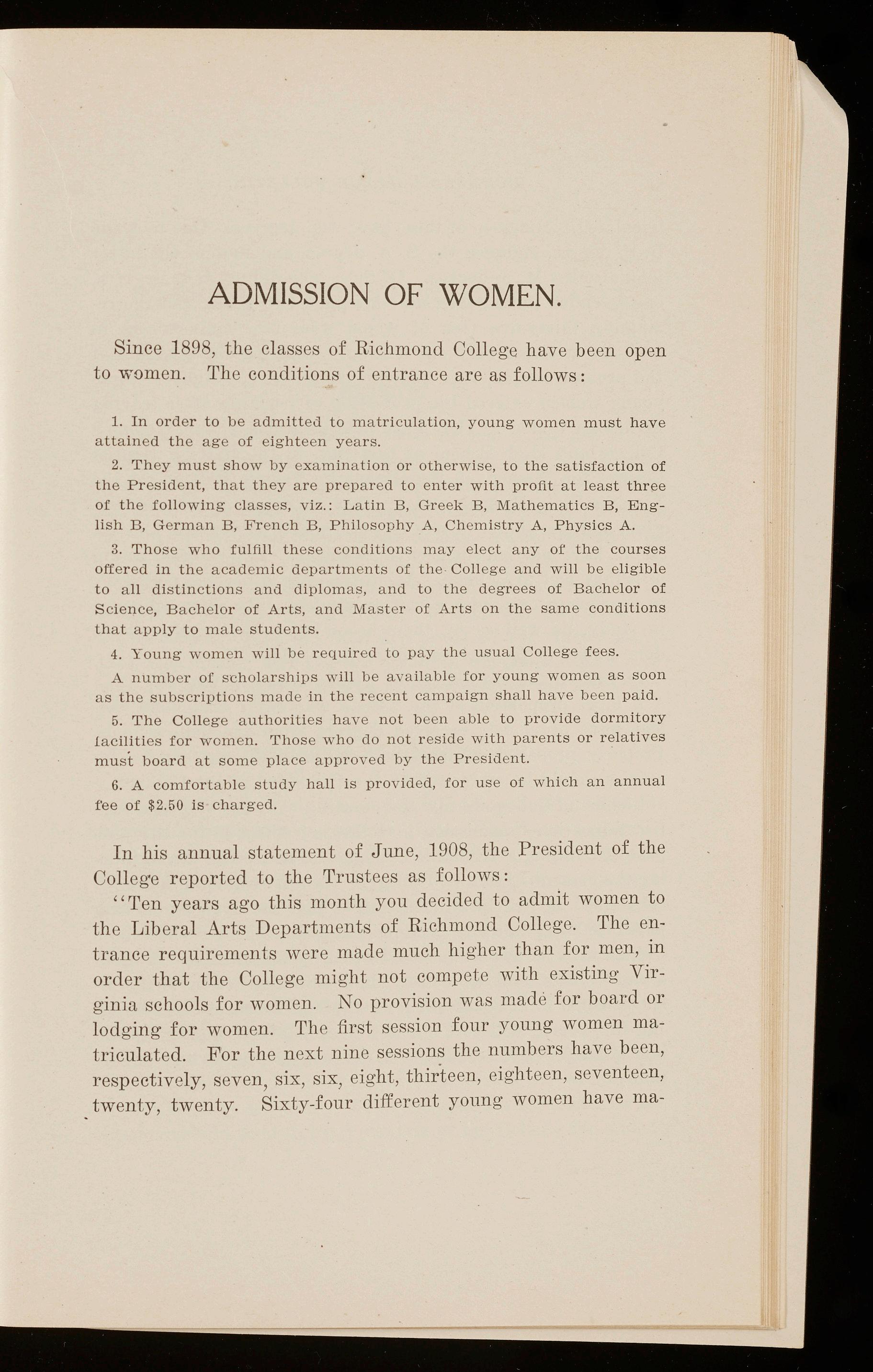
Since 1898, the classes of Richmond College have been open to women. 'l'he conditions of entrance are as follows:
1. In order to be admitted to matriculation, young women must have attained the age of eighteen years.
2. '.rhey must show by examination or otherwise, to the satisfaction of the President, that they are prepared to enter with profit at l east three of the following classes, viz.: Latin B, Greek B, Mathematics B, English B, German B, French B, Philosophy A, Chemistry A, Physics A.
3. Those who fulfill these conditions may e lect any of the courses offered in the academic departments of the - College and will be elig ible to a ll distinctions and diplomas, and to the degrees of Bachelor of Science, Bachelor of Arts, and Master of Arts on the same conditions that apply Lo male students.
4. Young women will be required to pay the usual College fees.
A number of scholarships will be ayai!able for young women as soon as the subscriptions made in the recent campaign shall have been paid.
5. The College authorities have not been able to provide dormitory iacilities for women. Those who do not reside with parents or relatives must board at some place approYed by the President.
6. A comfortable study hall is provided, for use of which an annual fee of $2.50 is charged.
In his annual statement of June, 1908, the President of the Colleg·e r eported to the Trustees as follows :
'' Ten years ago this month you decided to admit women to the Liberal Arts Departments of Richmond College. The entrance requir ements were made much hi gher than for men, in order that the College might not compete with existing Virginia schools for women. No provision was made for board or lodging for women. The first session four young women matriculated. For the next nine sessions the numbers have been , respectiv ,,ly seven six six ei2:ht, thirteen, eighteen, seventeen, "' ' ' ' ' '-' twenty, twenty. Sixty-four different young women have ma-
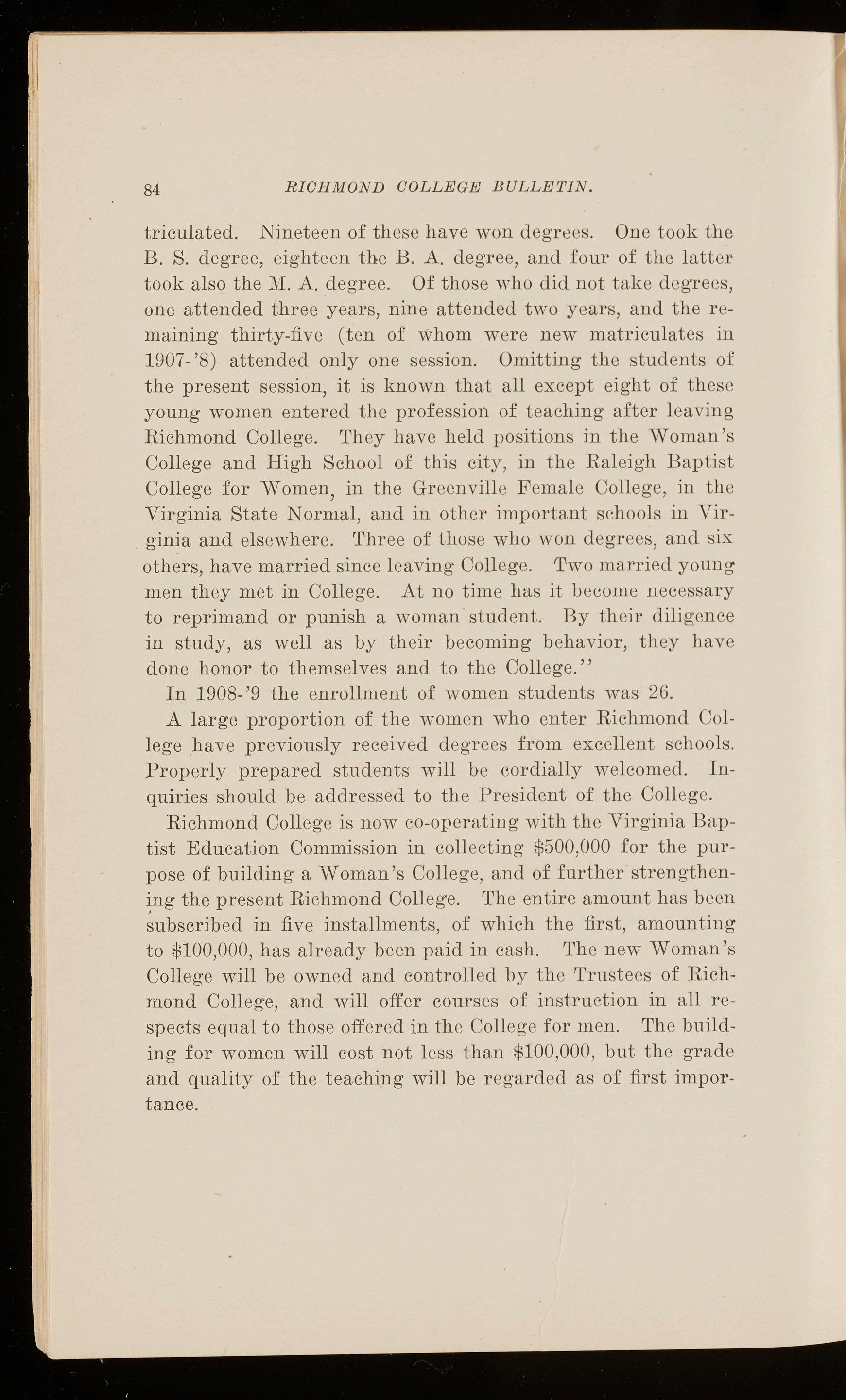
triculated. Nineteen of these have won clegr0es. One took the B. S. degree, eighteen the B. A. degree, and four of the latt er took also the l\I. A. degree. Of those ·who did not take degrees, one attended three years, nine attended two years, and the remaining thirty-five (ten of whom were new matriculates in 1907- '8) attended only one session. Omitting the students of the present session, it is known that all except eight of these young women entered the profession of teaching after l eaving Richmond College. They have held positions in the ·woman's College and High School of this city, in the Raleigh Baptist College for Women, in the Greenville Female College, in th e Virginia State Normal, and in other important schools in Virginia and elsewhere. 'rhree of those who won degrees, and six others, hav e married since leaving College. Two married young men they met in College. At no time has it become necessary to reprimand or punish a woman student. By their diligence in study, as well as by their becoming behavior, they have done honor to themselves and to the College."
In 1908- '9 the enrollment of women students was 26.
A large proportion of the women who enter Richmond College have previously received degrees from exce ll ent schools. Properly prepared students will be cordially welcomed. Inquiries should be addressed to the President of the College.
Richmond College is now co-operating with the Virginia Baptist Education Commission in collecting $500,000 for the purpose of building a Woman's College, and of further strengthening the present Richmond College. The entire amount has been ;ubscribed in five installments, of which the first, amounting to $100,000, has already been paid in cash. The new "\Voman 's College will be owned and controlled by the Trustees of Richmond College, and will offer courses of instruction in all respects equa l to those offered in the College for men. The building for women will cost not less than $100,000, but the grade and quality of the teaching will be regarded as of first importance.

'l'he session opens on the Thursday nearest to the 22d of Sep- tember, and continues thirty-eight weeks. The next session, therefore, will open September 23, 1909, and will close J unc 15, 1910. Exercises arc suspended for one week at Christmas and on two separate days in the Spring-Easter l\fonday and '· Field Day' '-for competitive out-of -door sports. Students are advised to be present at the opening of the session. This applies particularly to students who enter the low er classes. Students who are prepared for classes higher than the low est, and can not enter in September, may enter with advantage at the opening of the winter or spring terms.
In September, 1906, Richmond College put into effect the minimum entrance requirements of the '' Southern Association of Colleges and Preparatory Schools.'' These requirements as then adopted, amounting to the completion of a three-year High School course, will continue in force through the session of 1909- '10. At their annua l meeting in June, 1909, the 'l'rus- tees of the College approved the fourteen Carnegie units as a new standard of entrance, and voted that on and after Septem- ber 22, 1910, these fourteen units should be the entrance re- quirements of Richmond College.
The entrance requirements for 1910-'11 are given below: For the session of 1909- '10, however, students will be required t<, present only ten units. In every case the applicant for ad- mission should send to the President of the College for a blank

certificate of admission and have the question of entrance definitely settled before he leaves home.
For admission to Richmond College the general conditions are as follows :
I. The student must be at least fifteen years of age; for most students a minimum of sixteen years is advised.
II. The applicant for admission should present a certificate of honorable dismissal from the last school attended, or other sufficient evidence of good character.
III. He must give proof of adequate preparation to profit by the work offered in college classes. This preparation may be established by:
1. A written examination.
2. A certificate from an accredited preparatory school.
3. Faculty permission to register as a special student.
The requirements for admission are stated in units. A unit is the equivalent of five recitation periods a week during a full school year of a preparatory school above the grammar grade.
For admission to full standing as candidate for a degree fourteen units are required, of which six are specified and eight are optional.
The specifie,,l units are as follows: English, 3. Mathematics, 2. History, 1.
For the eight optional units the candidate may offer any of the work listed as acceptable for entrance, provided that not more than two additional units are offered in History.
For admission to conditional standing as a candidate for a ckgree, ten units are required, with the condition that the re-
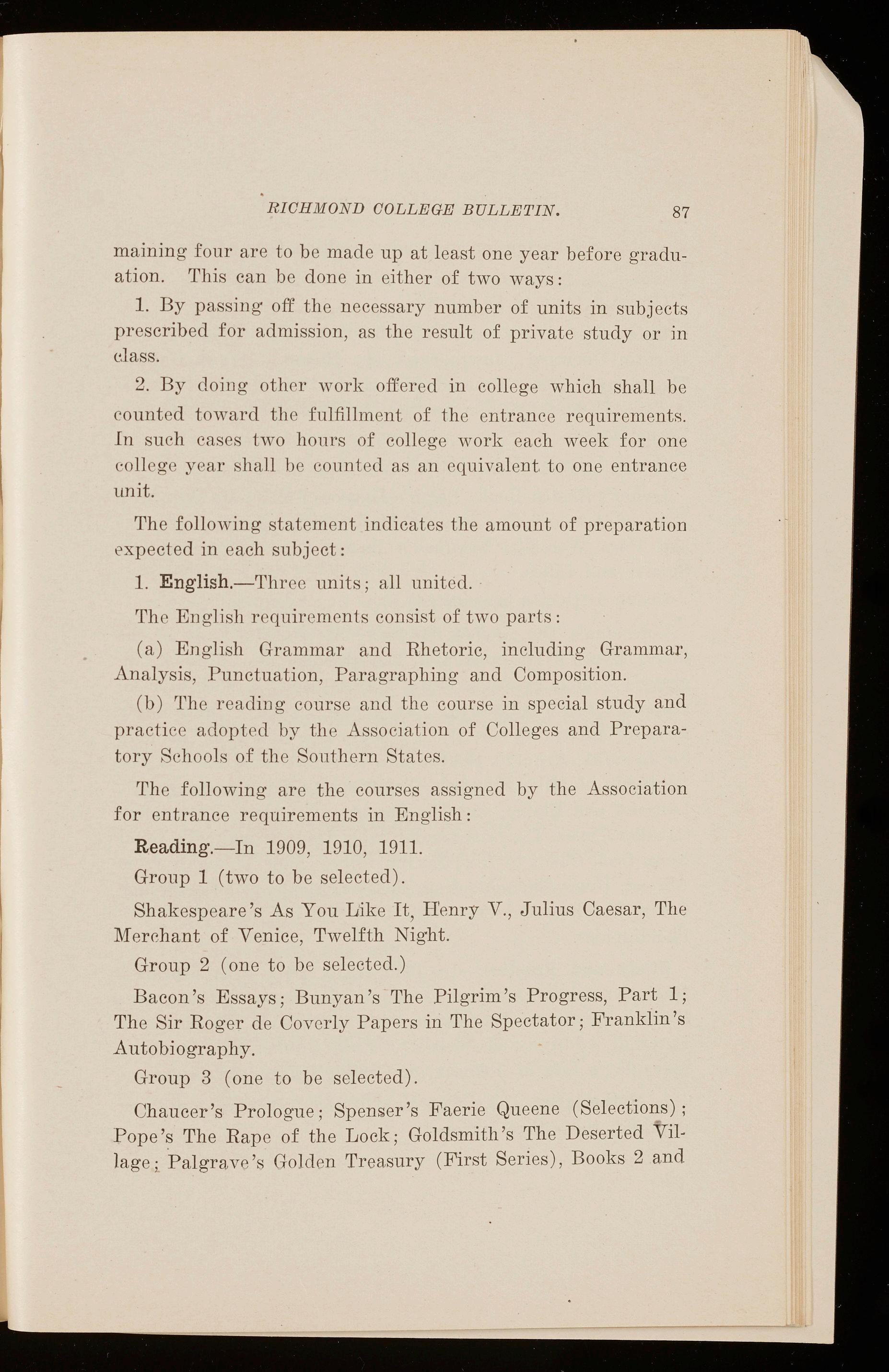
87
maining four are to be made up at least one year before graduation. This can be done in either of two ways:
1. By passing· off the necessary number of units in subjects prescribed for admission, as the result of private study or in class.
2. By doing othrl' work offered in college which shall be counted toward the fulfillment of the entrance requirements. In such cases two hon rs of college work each week for one college year shall be counted as an equivalent to one entrance unit.
The follo"·ing statement indicates the amount of preparation expected in each subject:
1. En g li sh . - Thrcc units; all united.
The English requirements consist of two parts:
(a) English Grammar and Rhetoric, including Grammar, Analysis, Punctuation, Paragraphing and Composition.
(b) rrhe reading course and the course in special study and pract i ce adopted by the Association of Colleges and Preparatory Schools of the Sonthern States.
The following are the courses assigned by the Association for entrance requirements in English:
Readin g.-In 1909, 1910, 1911.
Group 1 (two to be selected).
Shakespeare's As You Like It, Henry V., Julius Caesar, The Merchant of Venice, Twelfth Night.
Group 2 ( one to be sel ected.)
Bacon's Essays; Bunyan's The Pilgrim's Progress, Part 1; The Sir Roger de Coverly Papers in The Spectator; Franklin's Autobiography.
Group 3 ( one to be selected).
Ch aucer's Prologue; Spemier's Faerie Queene (Selections); Pope's The Rape of the Lock; Goldsmith's The Deserted Village; Palgrave 's Golclrn Treasury (First Series), Books 2 and

88
RICHMOND COLLEGE BULLE'l.'JN, 3, with special attention to Dryden, Collins, Gray, Cowper and Burns.
Group 4 (two to be selected).
Goldsmith's The Vicar of Wakefield; Scott's Ivanhoe; Scott's Quentin Durward; Hawthorne's The House of Seven Gables; Thackeray's Henry Esmond; l\Irs. Oaskell 's Cranford; Dickens' A 'l'ale of Two Cities; George Eliot's Silas l\Iarner; Blackmore 's Lorna Doone.
Group 5 (two to be selected).
Irving's Sketch Book; Lamb's Essays of Elia; De Quincey's Joan of Arc and 'rhe English l\Iail Coach ; Carlyle's Heroes and Hero "\Vorship ; Emerson's Essays (Selected) ; Ruskin's Sesame and Lilies.
Group 6 (two to be selected).
Coleridge's The .Ancient l\'Iariner; Scott's The Lady of the Lake; Byron's l\Iazeppa and The Prisoner of Chillon; Palgrave's Golden Treasury (First Series), Book 4, with especia l attention to ,~rordsworth, Keats and Shelley; l\'Iacaulay 's Lays of .Ancient Rome; Poe's Poems; Lowell's The Vision of Sir Launfal; .Arnold's Sohrab and Rustum; Longfellow's The Courtship of l\'Iiles Standish; Tennyson's Gareth and Lynette, Lancelot and Elaine, and The Passing of Arthur; Browning's Cavalier Tunes, The Lost Leader, How They Brought the Good News from Ghent to A.ix; Evelyn Hope, Home Thoughts .from Abroad, Home Thoughts from the Sea, Incident of the French Camp, The Boy and the Angel, One Word More, Herve Riel, Pheidippides.
Study and Practice.-In 1909, 1910, 1911-Shakespeare 's Macbeth; Milton's Lycidas. Comus, L'.Allegro and 11Penseroso; Burke's Speech on Conciliation with .America, or "\Vashington 's Farewell .Address and Webster's First Bunker Hill Oration; Macaulay's Life of Johnson, or Carlyle's Essay on Burns.
2. Mathematics.-Th e first two of the following units are reqftired, the others optional:

RICHMOND COLLEGE BULLETIN.
(a) Algebra to Quadratics, one unit.
(b) Plane Geometry, one unit.
(c) Advanced A lgebra through progressions, one -half unit.
(
cl) Solid Geometry, one-half unit.
(
e) Trigonometry, one-half unit.
3. His t ory.-One unit required; the others optional.
(a) Ancient history, one unit.
(b) Medieval and modern European history, one unit.
(c) Eng l ish history, one unit.
(d) American history, one unit.
4. L at in .-Four uni.ts, optional.
(a) Grammar and composition, one unit.
(b) Caesar, four books, one unit.
(c) Cicero, six orations, one unit.
(d) Vergil, two books, and Nepos, the first ten Lives; or an amount equivalent to the whole of these in either V ergil or N epos, one unit.
5. Gree k -Two units, o-ptional.
(a) Gr ammar and composition, one unit.
(b) Xenophon's Anabasis, four books, one unit.
6. Modern Language s .-Seven units; optional.
(a) French: Elementary, one unit.
Advanced, two units.
(b) German: E l ementary, one unit.
Advanced, two units.
( c) Spanish, one unit .
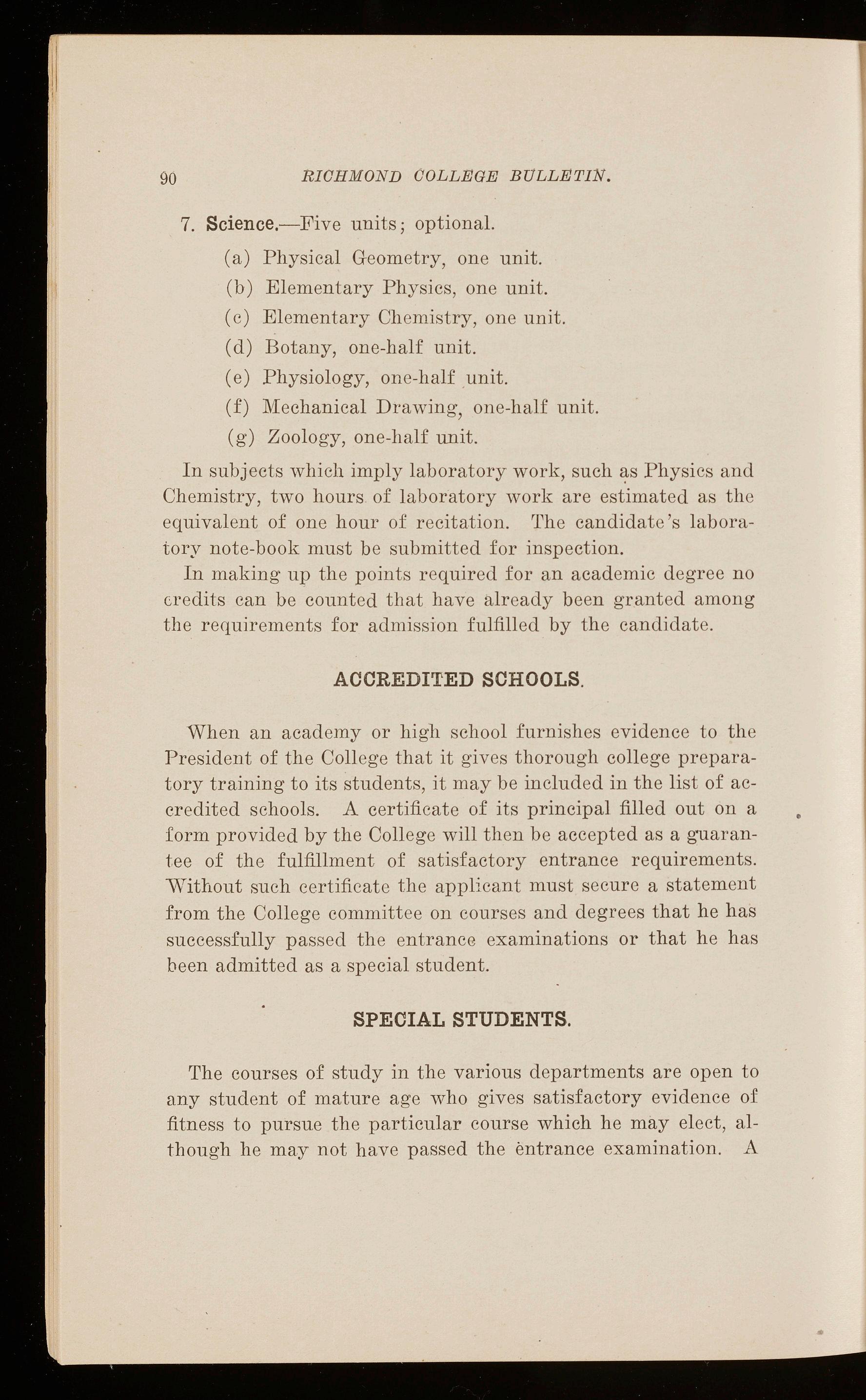
7. Science.-Five units; optional.
(a) Physical Geometry, one unit.
(b) Elementary Physics, one unit.
(
c) Elementary Chemistry, one unit.
(
d) Botany, one-half unit.
(
e) Physiology, one-half unit.
(f) Mechanical Drawing, one-half unit.
(g) Zoology, one-half unit.
In subjects which imply laboratory work, such ~s Physics and Chemistry, two hours of laboratory work are estimated as the equivalent of one hour of recitation. 'l'he candidate's laboratory note-book must be submitted for inspection.
In making up the points required for an academic degree no credits can be counted that have already been granted among the requirements for admission fulfilled by the candidate.
When an academy or high school furnishes evidence to the President of the College that it gives thorough college preparatory training to its students, it may be included in the list of accredited schools. A certificate of its principal filled out on a form provided by the College will then be accepted as a g·uarantee of the fulfillment of satisfactory entrance requirements. "'\Vithout such certificate the applicant must secure a statement from the College committee on courses and degrees that he has successfully passed the entrance examinations or that he has been admitted as a special student.
The courses of study in the various departments are open to any student of mature age who gives satisfactory evidence of fitness to pursue the particular course which he may elect, although he may not have passed the entrance examination. A

Rpecial student may become a candidate for a degree only by satisfying the regular requirements for admission. To be recommended for a degree he must have been registei·ed as a candidate for that degree at least one session.
Entrance examinations will be held at the College on the last two days of the session, and on the two days immediately preceding the opening of the new session. Similar examinations will also be held in the principal cities of Virginia, and at other places, so far as suitable arrangements can be made. Application for the holding of such an examination should be made to the President of the College not less than four weeks previous to the time at which the examination is desired .
Advanced Standing at Entrance.-Students who, by reason of their work elsewhere, are prepared to enter classes higher than the lowest, will be admitted to any advanced class by p:issing such special examination as may satisfy the professor in charge. When the work of the advanced class shall have been completed, full credit v.:ill be given for the work of the lower class or classes.
Law Students are at present exempt from entrance examinations, if tliey take only law classes.
The Presidrnt of the College will gladly furnish any special information that may seem needful concerning entrance.
The system of schools allows the selection by every student of surh studies as will be most valuable in qualifying him for his future pursuit; but while allowing such selection, the College holds that the man is more than the occupation, and will always encourage a regular and complete course. To this end, the right is reserved to prescribe the studies of any who may be found unprepared for classes higher than the "A" courses
92

in Latin, English and Mathematics, and also to limit the number of studies for which any student may matriculate. A committee of the Faculty will assist the President in matriculating students, and will carefully advise every new student as to his course of study. Students will not be matriculated for more than four regular classes without special permission of the Faculty. The term "regular" includes all classes that meet three times a week, or oftener.
Every student is expected to attend at least three schools, and to adhere throughout the session to the studies selected on his matriculation. Students who desire ~o pursue special studies in one or more schools should communicate with the President.
Students are assigned to the several classes in a school according to 1heir apparent attainments; but the professor in charge of a department will, at any time, transfer a student i.o a higher or lower class in that department when. in his judgment, such a change becomes desi!able.
In order that students in selecting their classes may see how conrsPs of study leading · to a collep:e deg·ree are made up, there are given below several typiral four year courses. The completion of any one of these courses entitles the successful student to the degree named. Other classes might, of course, have been selected instead of those mentioned. The courses outlined are simply for illustration , and are selected from among scores of other admirable tickets of stmly.
I. Course Leading to B. A. Degree.
Session " " "
1909-10-Latin A, Math. A, English A, History A. 19] 0-11-Latin B, German A, Physics A. English B. 1911-12-Latin C, German B, French A, Chemistry A. 1912-13-Freneh B, Biology, History C, English C.
II. Course Leading to B. A. Degree.
Session 1909-10-Latin A, l\Tath. A, English A, History A. " 1910-11-Latin B, l\Tath. B, Eng ·lish B, German A. " 19Jl-12-Latin C, Physics A, English C, French A. " 19] 2-13-French B, Chemistry A, History C, Philoso-

Session " " "
Session " " " phy A.
III. Course Leading to B. A. Degree.
1909-JO-Latin A, Greek Introcl., l\Iath. A., English A. 19J0-11-Latin B, Greek A, M:ath. B, English B. 1911-1~-Latin C, Greek B, l\Iath. C, History A. 1912-13-Greek C, English C, Physics A, Philosophy A.
IV. Course Leading to B. S. Degree.
1909-10-French A, M:ath. A, English A, History A. 1910-11-E'rcnch B, Physics A, l\'Iath. B, English B. 1911-12-German A, Math. C, Physics B, Chemistry A. ] 912-13-German B, Math. D, Chemistry B, Biology.
PRELIMINARY PROFESSIONAL STUDIES.
Attention is invited to the wide range of studies now offered in Richmond College. Here the student ·who looks forward to professional study in engineering, law, medicine may obtain not only general training, but will also have opportunity to make special preparation for his future work. The law student will find his special needs mot in the subjects treated in the schools of English, History and Philosophy. Similarly the prospective student of medicine will find that the work in biology, chemistry, psychology and physics has afforded him direct preparation for his profession. By the introduction of

mechanical and free-hand drawing, and by the extension of the cours es in physics, chemistry and mathematics, the College is in position to prepare students for advanced standing in the best technical universities.
Every applicant for admission, upon arriving at the College, must report promptly to the President. If he has been a student at any other college, ho should present satisfactory evidence of general good conduct while there. If he comes from an academy or high school, it is desirable that he should bring a certificate from the principal showing what studies he has pursued and what progress he has made.
When the question of preparation for College has been settled affirmatively, and the applicant has duly subscribed to tht> regulations, he will receive a permit to matriculate, and , upoP presentation of this to the Treasurer of the College ancl payment of th e reqnirrd fres , his name will he placed on the rolls Students ·who clelay their matriculation long er than forty-eight hours after obtaining a permit will be charged a11 rxtra fee of $2 00.
For statement concerning the matriculation of women, see special announcement on '' Admission of Women.''
Matriculation.-Including entrance fee, use of public rooms, attendance, and all college privileg es, $20 .00. This fee must be paid at entrance, is not subject to deduction, nor in any case refunded. Students entering after the fall term pay threefourths of this fee. 'rhose who enter for the spring term pay only half of the fee.
Tuition.-In academic schools, $70.00. Tuition has been :fixed at $•70.00, regardless of the number of classes or schools
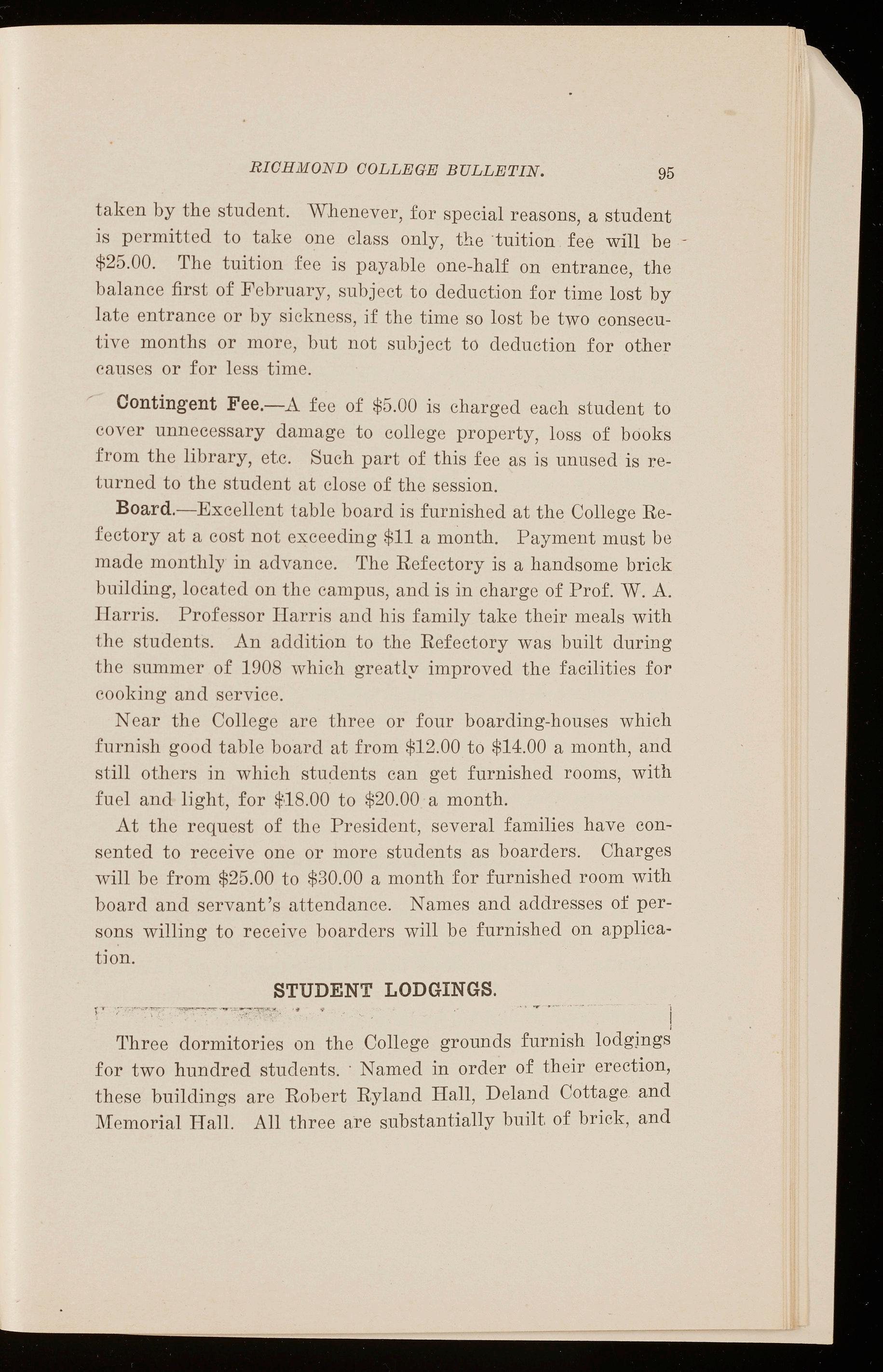
95 taken by the student. Whenever, for special reasons, a student is permitted to take one class only, the tuition fee will be $25.00. The tuition fee is payable one-half on entrance, the balance first of February, subject to deduction for time lost by late entrance or by sickness, if the time so lost be two consecutive months or more, but not subject to deduction for otlier rauscs or for less time.
Contingent Fee.-.A fee of $5.00 is charged each student to cover unnecessary damage to college property, loss of books from the library, etc. Such part of this fee as is unused is returned to the student at close of the session.
Board.-Excellcnt table board is furnished at the College Refectory at a cost not exceeding $11 a month. Payment must be made monthly in advance. The Refectory is a handsome brick building, located on the campus, and is in charge of Prof. W. A. Harris. Professor Harris and his family take their meals with 1hc students. An addition to the Refectory was built during the summer of 1908 which greatly improved the facilities for cooking and service.
N car the College arc three or four boarding-houses which furnish good table board at from $12.00 to $14.00 a month, and still others in which students can get furnished rooms, with fuel and light, for $-18.00 to $20.00 a month.
At the request of the President, several families have consented to receive one or more students as boarders. Charges ,,·ill be from $25.00 to $30.00 a month for furnished room with board and servant's attendance. Names and addresses of persons willing to receive boarders will be furnished on application.
'l'hree dormitories on the College grounds furnish lodgings for two hundred students. · Named in order of their erection, these buildings are Robert Ryland Hall, Deland Cottage and Memorial Hall. All three are substantially built of brick, and
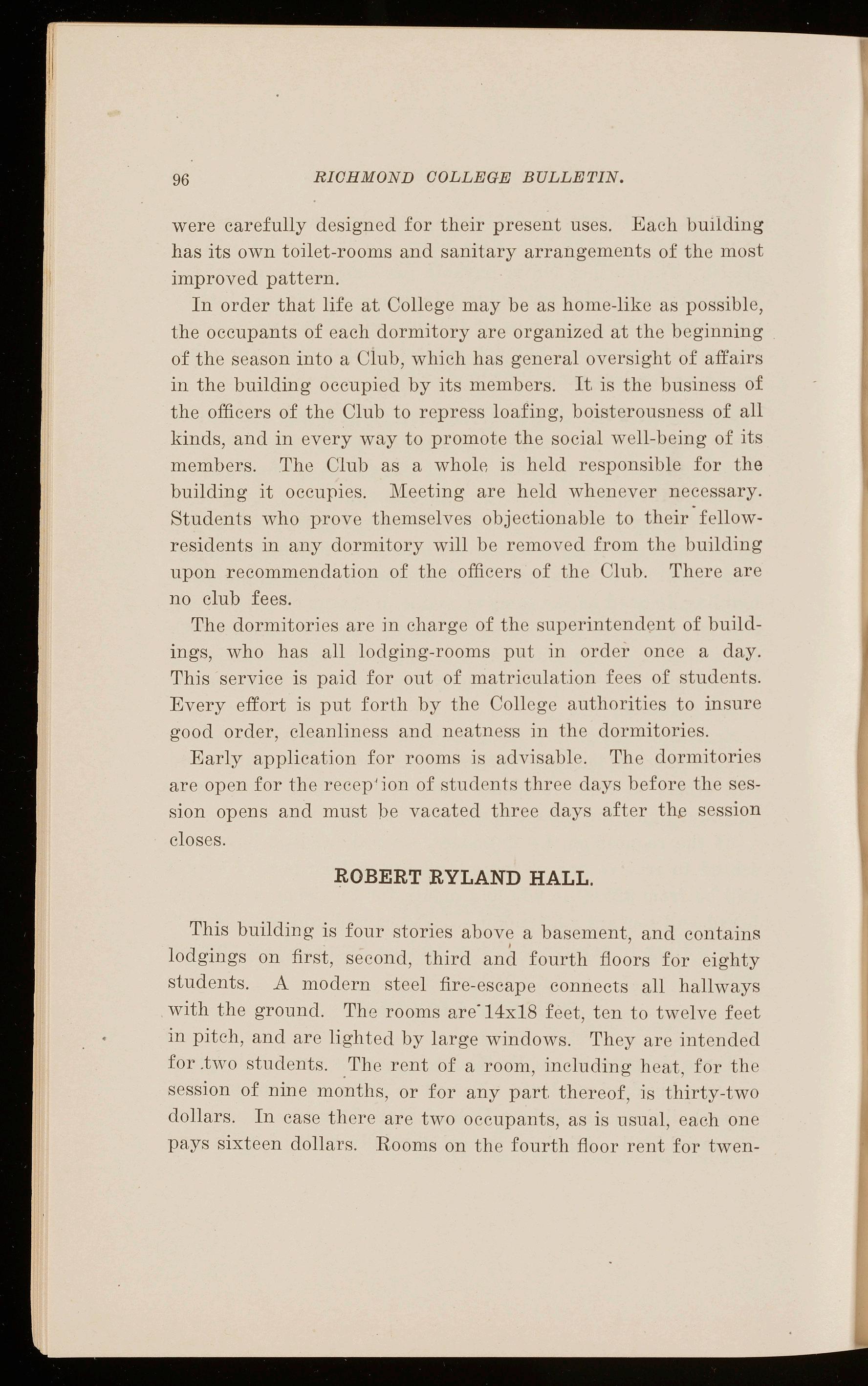
were carefu lly designed for their present uses. Each building has its own toilet-rooms and sanitary arrangements of the most improved pattern.
In order that life at College may be as home-like as possible, the occupants of each dormitory are organized at the beginning of the season into a Club, which h as general oversight of affairs in the building occupied by its members. It is the business of the officers of the Club to repress loafing, boisterousness of all kinds, and in every way to promote the social well-being of its m embers. The Club as a wholr. is held responsible for the building it occupies. Meeting are held whenever necessary. Students who prove themselves objectionable to their· fellowresidents in any dormitory will be removed from the building upon recommendation of the officers of the Club. There are no club fees.
The dormitories are in charge of the superintendent of buildings , who has all lodging-rooms put in order once a day. This service is paid for out of matriculation fees of students. Every effort is put forth by the College authorities to insure good order, cleanliness and neatness in the dormitories.
Early application for rooms is advisab l e. The dormitories are open for the reeep' ion of students three days before the session opens and must be vacated three days after th .e session closes.
This building is four stories above a basement and contains ' ' lodgings on first, second, third and fourth floors for eig hty students. A modern steel fire-escape connects all hallways ·with the ground. The rooms are-14x18 feet, ten to twelve feet in pitch, and are light ed by large windows. They are int ended for .two students. The rent of a room, including heat , for the session of nine months, or for any part thereof, is thirty-two dollars. In case there are two occupants, as is usual, eac h one pays sixteen dollars. Rooms on the fourth floor rent for twen-
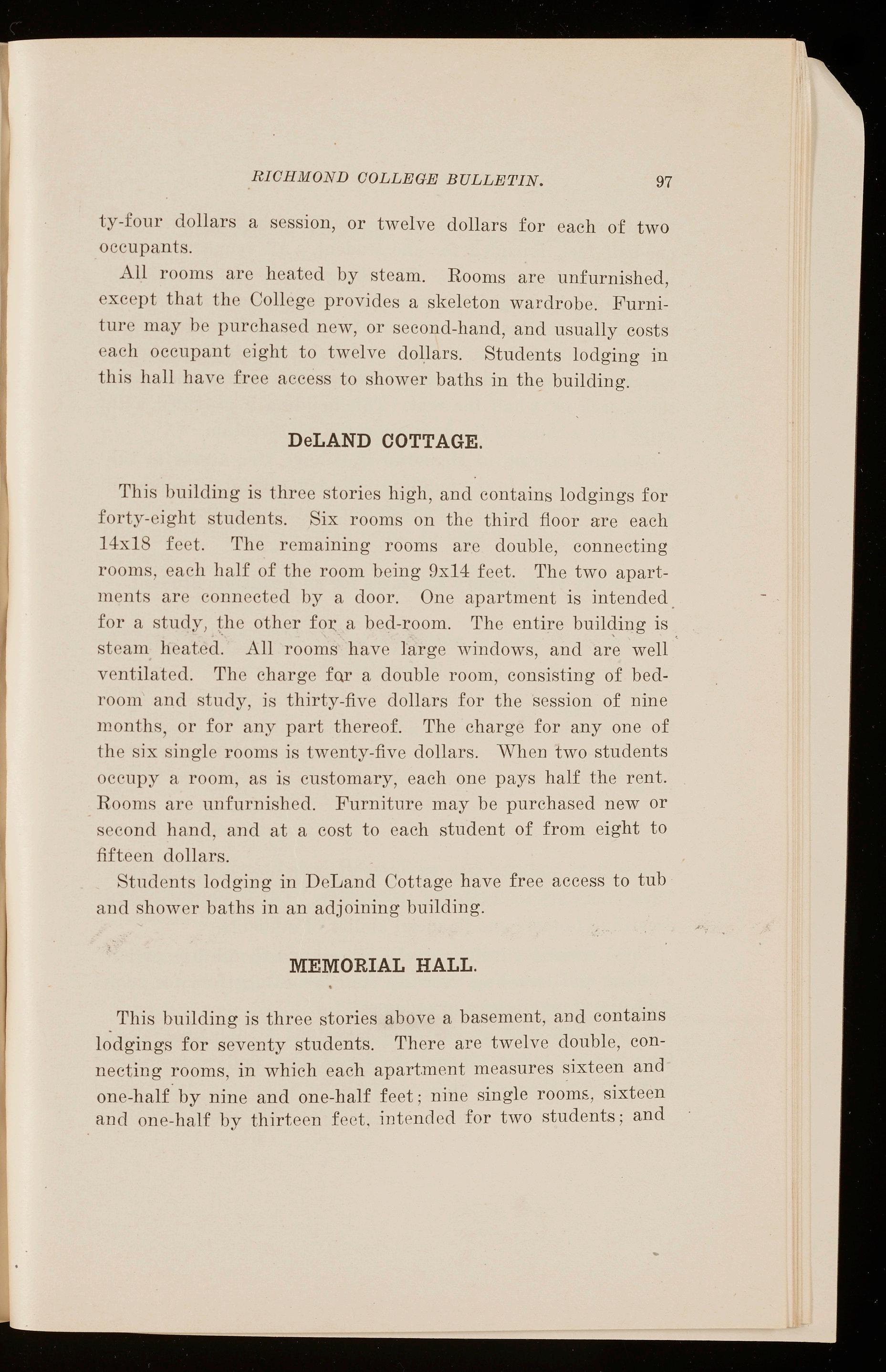
ty-four dollars a session, or twelve dollars for each of two occupants.
All rooms are heated by steam. Rooms are unfurnished, except that the College provides a skeleton wardrobe. Furniture may be purchased new, or second-hand, and usually costs each occupant eight to twelve dollars. Students lodging in this hall have free access to shower baths in the building.
This building is three stories high , and contains lodgings for forty-eight students Six rooms 011 the third floor arc each l+xlS feet. The remaining rooms are double, connecting rooms , each half of the room being 9x14 feet. The two apartments are connected by a door. One apartment is intended . for a study, the other fo~ a bed-room. The ent ir e buil~ing is steam heated. All rooms have larg e windows, and are well ventilated. The charge for a double room, consisting of bedroom and study, is thirty-five dollars .for the session of nine months, or for any part thereof. The charge for any one of the six single rooms is twenty-five dollars. vVhen two students occupy a room, as is customary, each one pays half the rent. Rooms are unfurnished. Furniture may be purchased new or srcond hand , and at a cost to eac h student of from eight to fifteen dollars.
Students lodging in DeLand Cottage hav e fr ee access to tub and shower baths in an adjoining building.
This building is thr ee stories above a basement , and conta ins l~dgings for seventy students. There are twelve double, connectina rooms in which eac h apartment measures s ixt een and b ' one-half ·by nine and one-half feet; nine single rooms., sixteen and one-half by thirteen fret. intend Pd for two students; and
twenty-eight single rooms, sixteen and one-half by nine and one-half feet, in~endcd for one student. All rooms and hallways arc heated by steam. The charge for rooms includes all expense for heating. The rent of a double room for session o:i' nine months, or for any part thereof, is forty dollars; for single room for two students, tJ1irty-two dollars; for single room for one student, twenty-five dollars. "\Vhcn two students occupy a room, each pays half the rent. This building is provided with ample fire escapes of the most approved construction.
Students lodging in l\Iemorial Hall have free access to tub and shower baths in the building. Students who take rooms in a dormitory must pay full amount of rent in advance.
Summary of Necessary Expenses for an Academic Student.
Economical Estimate.

It will be noticed that the first three items arc invariable. Th ese items arc the same for all students. Other expenses vary according to taste and financial ability of students.
These estimates include every necessary expenditure except clothing and traveling expenses . and laboratory fees for such students as take laboratory classes.
Scholarship students, or candidates for the ministry, since they pay no tuition, should deduct seventy dollars from the totals given above.
Summary of Expenses for a Law Student.
Economical Estimate.
F e e ............
20 oo C onting e nt F ee
in Junior Law ..
lights, laundry and incidentals ..
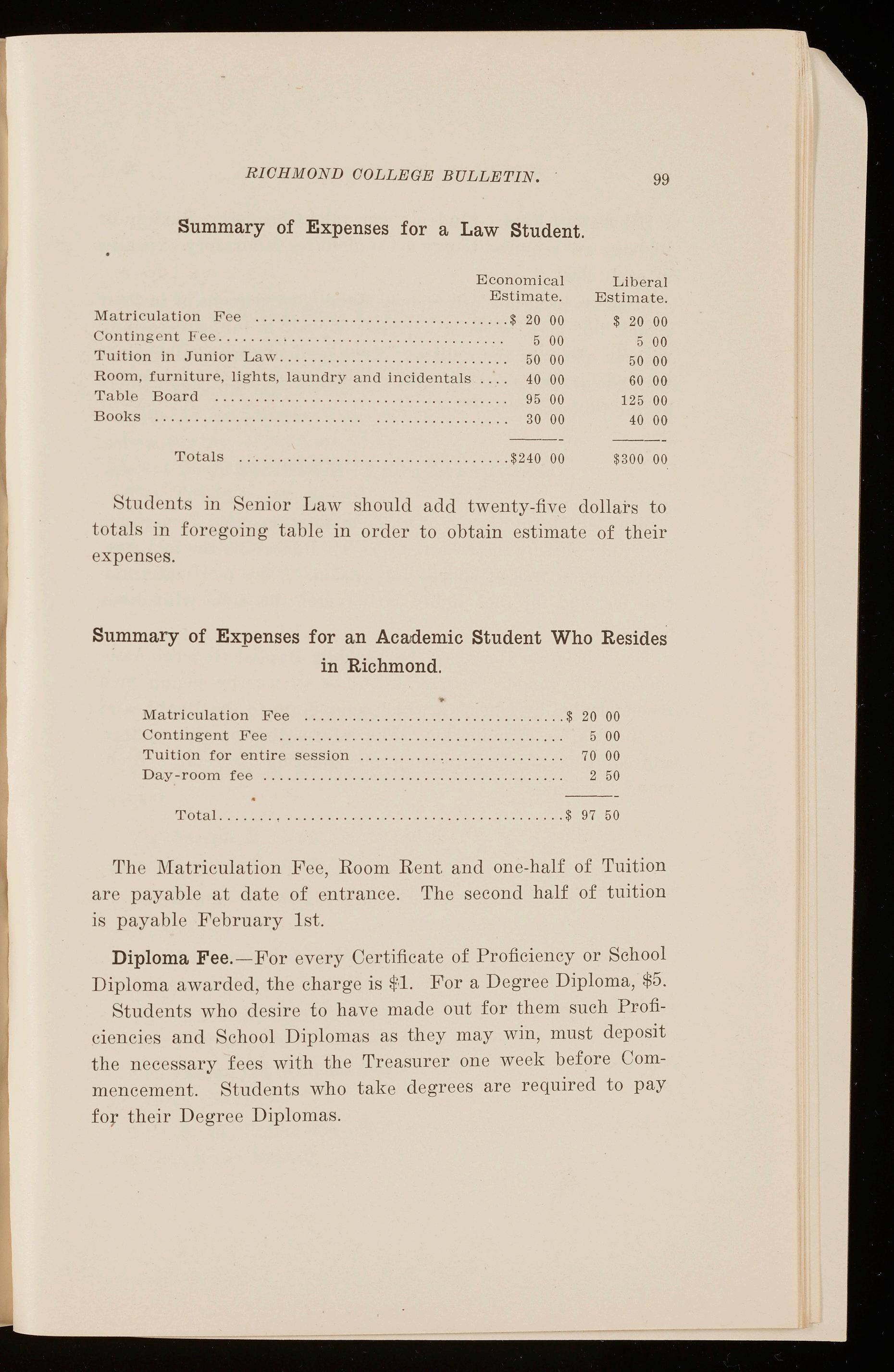
Stud ents in S enior Law should add twenty-five dollai·s to totals in foregoing table in order to obtain estimate of their expenses.
Summary of Expenses for an Academic Student Who Resides in Richmond.
The Matriculation Fee, Room Rent and one-half of Tuition are payable at date of entrance. The second half of tuition is payable February 1st.
Diploma Fee.-For ev ery Certificate of Proficiency or School Diploma awarded, the charge is ~1. For a Degree Diploma, $5. Students who desire to have made out for them such Proficiencies and School Diplomas as they may win, must deposit the necessary fees with the Treasurer one week before Commencement Students who take degrees are required to pay for their Degree Diplomas.

Laboratory Fees .-Students who take Chemistry, Biology or Physics, are required to pay a fee of $5 for laboratory expens~s in each class.
Students need not keep money about their persons or in their rooms, but may, without expense, deposit it for safe-keeping with an officer of the College . Some students open an account with one of the city banks, and 1.his p l an is strong ly commended by the College authorities.
Ministers of the Gospel of all denominations, and young men duly approved by their churches as candidates for the ministry, are admitted free of charge for tuit i on. They pay matriculation fee, and for fuel, lights, board , etc ., the same with other students.
The Ed u cation Board of the Virginia Baptist General Association wi ll render further assistance to worthy young men recommended by churches which contribute to the Board, and accepted after examination. For information on t h is matter. address Hon. J. T. E ll yson, Cor responding Secretary, Richmond, Virginia .
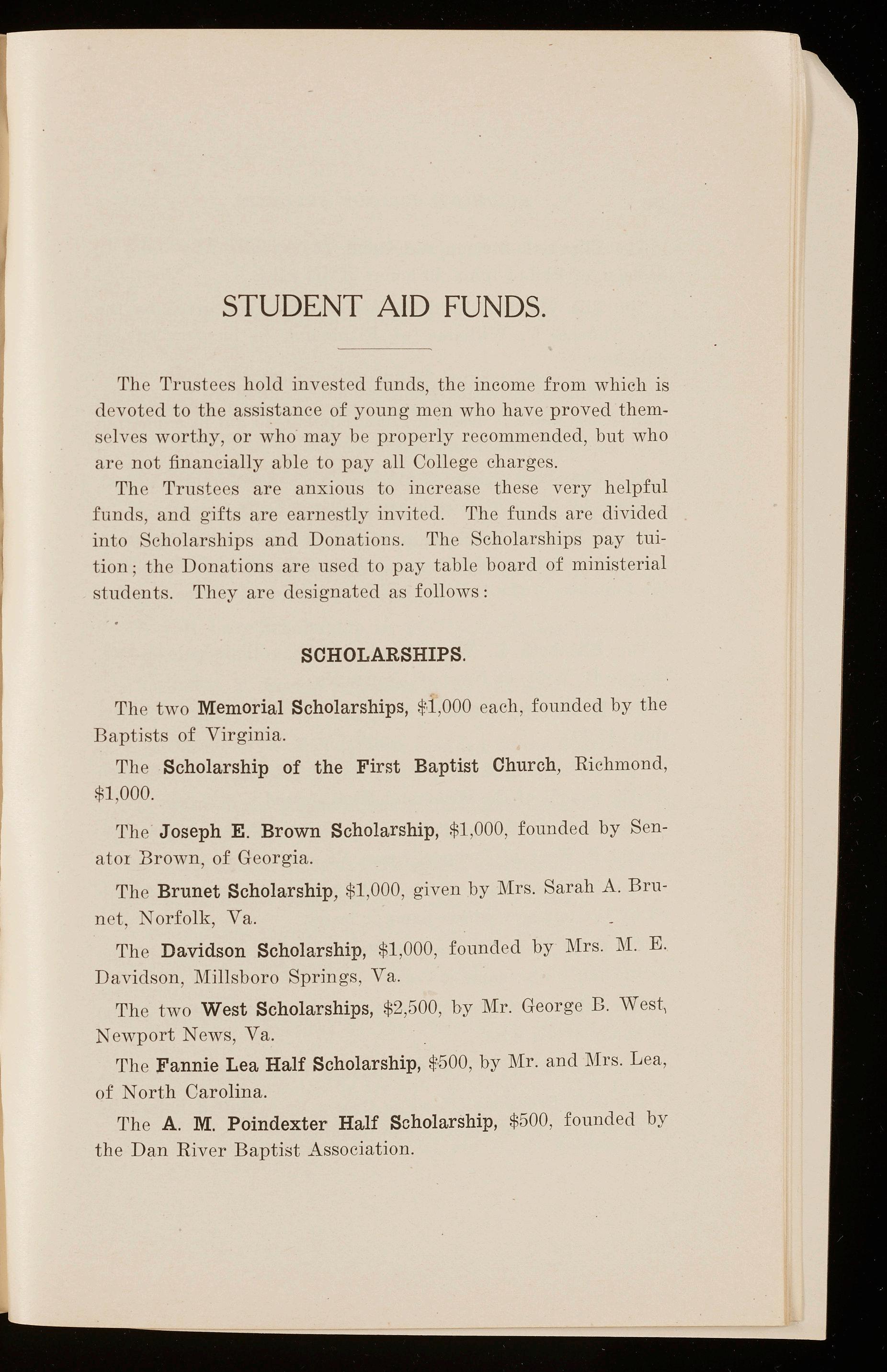
The Trustees ho l d invested funds, the income from which is devoted to the assistance of young men who have proved themselves worthy, or who may be properly recommended, but who are not financ i a ll y able to pay all College charges.
The Trustees are anxious to increase these very helpful funds, and gifts are earnestly invited. The funds are divided into Scho l arships and Donations . The Sch olarships pay tuition; the Donations are used to pay table board of ministerial students. They are designated as follows:
The two Memorial Schol arship s, $',1,000each, founded by the Baptists of Virginia.
The Scholarship of the Fi rst Baptist Church, Richmond, $1,000.
The Joseph E. Brown Sch ol arship, $1,000, founded by Senator Brown, of Georgia.
The Brunet Scholarship , $1,000, given by Mrs. Sarah A. Brunet, Norfo l k, Va.
Th e Davidson Schol arship, $1,000, founded by Mrs. lVI. E. Davidson, Mi ll sboro Springs, Va.
The two West Schola rships, $2,500, by Mr. George B. West, Nevvport News, Va.
T h e Fannie Lea Half Scholarship, $'·500,by Mr. and l\Irs. Lea, of North Caro lin a.
The A . M. Poindexter Half Scholarship, $500, founded by the Dan River Baptist Association.
102

RICHMOND COLLEGE BULLETIN.
The Elizabeth Stetson Aid Fund, $5,000, giv en by John B. Stetson, of Phi l ade lphia, in honor of his wife.
'The Ella Williams Students Aid Fund, $5,000 given by t lw late Thomas. C. "\¥illiam s, of Richmond , in m emory of his daughter.
Th e William Hawkins Fund , $2,000 , founded by th e gentleman whose name it b ea rs , a Philade lphi an , to aid in ed u cat ing godly, studious, deserving young m en
The Chambers Sisson (Cu lp eper, Va. ) Scholarship, $1,000, founded by the gentlemen whose name it bears.
The J . B. Jeter Scholarship , *',1,200, bequest of ~Irs. l\Iary C. Jeter , in memory of h er husband , R ev. J.B. Jet er, D . D. , one of th e founders of the College , and long president of th e corporation.
Th e Elizabeth R. West Fund, $2,000, esta blish ed by l\Ir. George B. "\Vest, of Newport News, Va.
Th e H . Evelina Walker (King and Qu een count y) Scholarship , $1 ,200.
The Gustavus Milhiser (Richmond) Scholarship , $1 ,000, used for the benefit of the Richmond High School.
The Sarah B. Watson Scholarship, of $1,000, found e d by l\Ir. George B. "\¥est , of Newport News, Va .
Th e A. E . Dickinson (Richmond) Scholarship, $1,000, founded by the minister whose name it bears.
The N. W . Bowe '( Richmond) Scholarship, established by th e gen tl eman whose name it bears.
The John T . Griffin (Ch ur chland , Va. ) Scholarship, $1,500 in honor of his wife.
Th e Court Street Church Scholarship, Portsmouth , Va. $ 1,000.
The C. C. Broaddus (Bo ,vling Green, Va. ), Half Scholarship, $500, in memory of hi s ·wife and dau ght er.
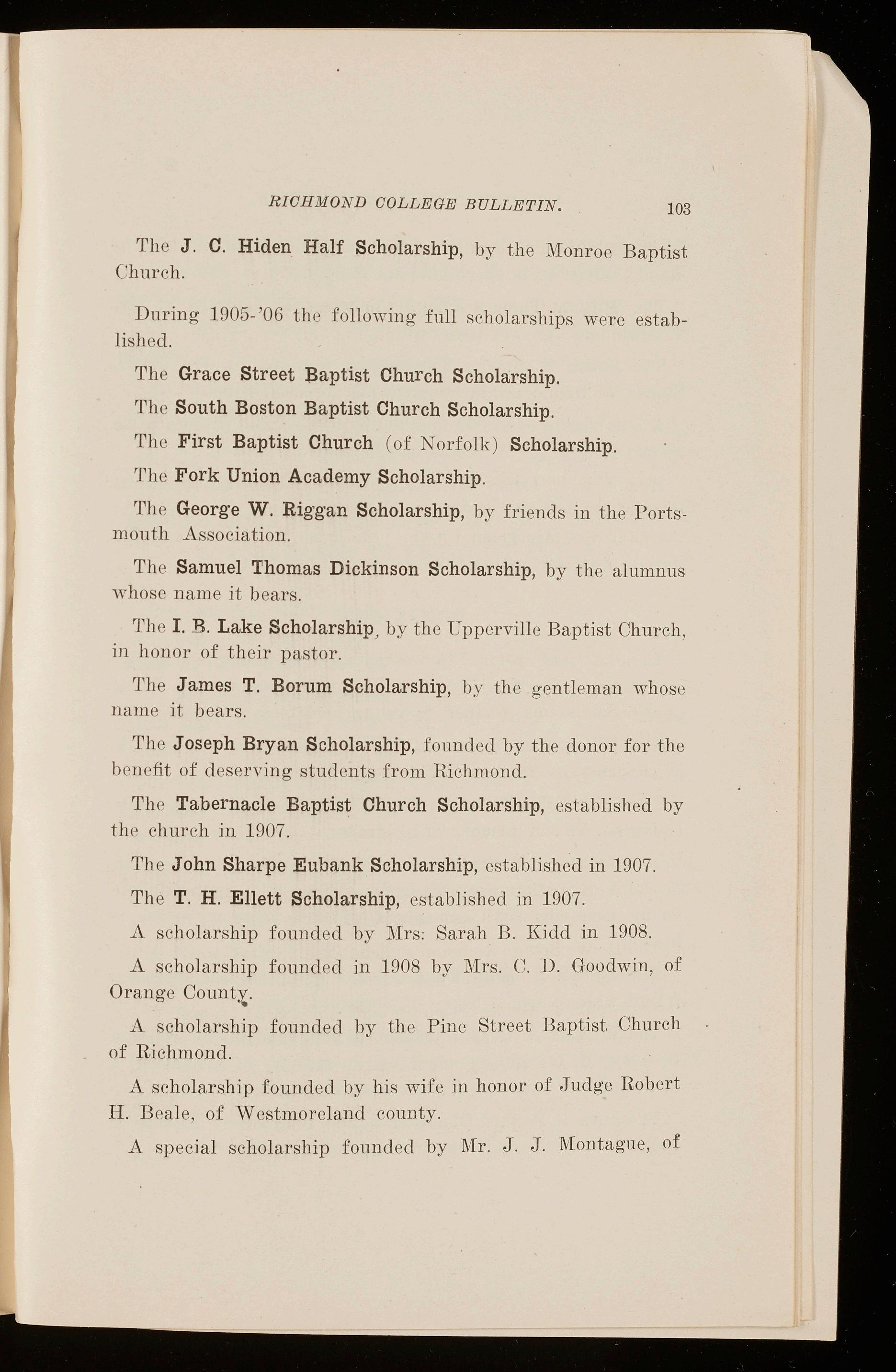
RICHMOND COLLEGE BULLETIN. 103
'rhe J. C. Riden Half Scholarship, by the Monroe Baptist Churc h.
During 1905- '06 the following full scholarships were establish ed.
The Grace Street Baptist Church Scholarship.
The South Boston Baptist Church Scholarship.
The First Baptist Church (of Norfolk) Scholarship.
The Fork Union Academy Scholarship .
The George W. Riggan Scholarship, by friends in the Portsmouth Association.
The Samuel Thomas Dickinson Scholarship, by the alumnus whose name it bears.
The I. B. Lake Scholarship , by the Upperville Baptist Churc h. in honor of their pastor.
The James T. Borum Scholarship, by the gentleman whosr, name it bears.
Th e Joseph Bryan Scholarship, founded by the donor for the brnefit of deserving students from Richmond.
Th e Tabernacle Baptist Church Scholarship, es tablish ed by the church in 1907.
The John Sharpe Eubank Scholarship, established in 1907.
The T. H. Ellett Scholarship, established in 1907.
A scholarship founded by l\Irs: Sarah B. Kidd in J 908.
A scholarship founded in 1908 by Mrs. C. D. Goodwin, of Orange Count~.
A scholarship founded by the Pine Street Baptist Church of Richmond.
A scholarship founded by his wife in honor of Judge Robert I-I. Beale, of W estmore land county.
A special scholarship founded by Mr. J. J. Montague, of
104

Richmond, to be used at the option of the donor either in Richmond College or in the Richmond Academy.
'l'he William Thomas Hudgins Scholarship , founded by )Ir. T. Archiba ld Cary, of Richmond.
'!.'he Susan E . Starke Scholarship, founded by )Ir. E. D. Starke, of Ri chmond, in honor of his deceased wife.
A scholarship of $1,000 founded by a lady who prefers to be known simply as '' A Fri end of Christian Education . ''
Hon. J. L. l\f. Curry transf er red to th e College his copyright int erest in two books, '' "\iVilliamEwart Gladstone'' ancl '' Southern States of American Union," the same to b e held and the income used for scholarship purposes.
The donations are used to pay the board of young men studying for the gospel ministry of the Baptist denomination. Their application is not confined to young men from Virginia.
The Woolverton Donation, $1,000, founded by Ueorge .A. "\iVoolverton, of Albany, N. Y.
'l'he John Tabb Donation, $1,200 found ed by Thomas Tabb Hampton, Va., in memory of his father .
The Mathew T. Yates Donation, $,1,300, given by the R ev. Dr. l\I. T. Yates , 1\Iissionary, Shanghai, China, "to h elp educatP young men who shall continue to prea ch after my voice u, hushed.''
The Joseph B. Hoyt Fund, $5,000, given by the d ecease d friend whose name it b ea rs, of Stamford, Conn.
The William A. Gray Donation, $1,200, founded by William B. Gray, M D., of Richmond, Va., in memory of his father, a d istinguish ed Chr isti an physician of Fluvanna county.
The Lulie L. Pollard Donation, $2,500, founded by Th omas F. Pollard , of Ri chmond , Va. , in honor of his wife.

RICHMOND COLLEGE BULLETIN. 105
The Mattie Schmelz Donation, $] ,000, founded by Henry L. and George A. Schm eh, of Hampton, Va. , in m emory of Mrs. H en ry L. Schme lz .
Th e W. T. Clark (Prince Edward county, Va.) Donation, $1,000.
All these donations haY e conditions attached, which are filed with the bonds, for the guidance of the Trust ees.
Scholarships estab lish ed in Richmond College during the t·ampaign for the Woman's College and Endowment Fund shall be us ed under the following regulations:
1. A scho l ars h ip becomes available for use when not less than one thousand dollars has been paid into the College tr eas ury.
2. Scholarships established since January 1, 1908, are open to eith er mal e or female students, unless the donor specifies a sex limitation.
3. A scholarship pays the annual tuition fee of the holder. This fee is at pr esent seventy dollars, which is therefore the pres ent annual value of a scho l arship.
4. Recipients of scholarships must meet the usual entrance requir ements that are demanded of students who pay tuition.
5. Donors of scho l arships who wish to nominate students to receive the benefit of their scho l arships are informed that it is th e rul e of the Coll ege to make its appointments for one year at a time, and then to repeat the appointment as often as may b e ne e dful and desirable.

6. Donors of scholarships. are requested to nominate beneficiaries by July 1 preceding the opening of the session when th e scholarship is to be used, and to notify the President of the Coll ege of the nomination. If the donor has reported no nomination by September 1, the College will appoint a beneficiary for the current session.
7. It is sometimes desirable to divide a scholarship and to appoint two persons to enjoy the bcmfits of a half-scholarship eneh. In snch case the holder of a half-scholarship pays half of the seventy dollar tuition fee , or $17.50 for each half session.
8. Reports of students' class and examination standing are mailed at regu l ar int erva ls to parents or guardians, and a trans c·ript of a beneficiary's report will be mailed to tlw rlonor of a scho larship provided request is made at the President's offiee.
The committee in charge has general instructi, 111s,in making its award of all Aid Funds, to give the preference:
I. To applicants al ready at College, who hav e maintained a good standing, both in character and study.
II. To other fully prepared applicants who shall present satisfactory testimonials from the school last attended, or from other persons who have had opportunity to judge, certifying to their health, attainments, habits of study and moral character.
III. To those of either class who give reasonable assurance that they will complete a course of study leading to one of the degr ees of the College.
The recipi ents of aid are expected to prove, as students, not on l y above censure in a ll respects, but actively helpfu l to th1· Coll ege by examp l e and by ea rnest work.

The awards will be, at all times, subject to revision by the Trustees, who reserve the right to withdraw the privilege at any time on account of neglect of duty, serious misconduct, or failure to maintain an average standing of at least eighty per c·t ' nt. in th rce schools.
These Aid Funds are awarded annually by a committee of the Trustees , which meets the first week in July. Applications for aid should be made to thr President of the Colle~e. who will st'nd blank forms to be filled up and returned.

Math., B. Greek, A . History, C. Math., B. Gre e k, A. 1 spanish, B. 9:50 Math., A . Physics , A . Phil., A. I Math., A. Physics , A. Ph il. , A. French, B. 10:40 E ngli sh, A. Math., A. Phil., C. Gree k, C . Chem., A. Spanish, A. English , A. Math., A. Phil., I.:. Latin, C. Phys i cs, B. Span i sh, A. _______ ___.__ ________ E n g lish, A-_ ifJ H C)
8:40 9:00
SATURDAY ................. . Math., B. \ Math., A. Phil., A. Fr e nch B Astronomy. I Math. , A . Physics, A Phil., A. French, B. Math., A. Physics, A. Ph il. , A. French, B . IPhil., C. Latin, B . Math., A. Phil., C . Greek, c. Chem., A. Spanish, A . English, A. Math., A . Phil., B. Latin, C. Physics. B. Spanish, A. Engl i sh, A. Math., A. Phil.; C:,., Gree1.c, ·-· Chem., A. Spanish, A. -I Phil. , B~ Latin, C. Physics, B. NOTES. I. Some of the smaller c lass es ma y be moved to suit si:,ecial cases. 11 :30 English, A. Lati n , B. Greek, B. History, B. Eng_, B. English, A . Greek, B. History, B. German, B. Eng,, B. Physics, C. English, A. Latin, B. History, B. German, B. Eng., B English, A Greek, B. History, B. Germa n, B. Physics, C. English, A. Latin. B . History, B. German, B. Eng. , B . I Greek, B. Physics, C. 12:20 1 :10 2:00 Greek, Introd. l Latin, A. French, A. German, A. History, A. English, D , English, B (I). Biology, I Greek , Introd . l Latin , A . Fl'E , nch, A. G e rm.an, A History, A. English, C. Chem., B. Geology. Pub. Speaking IGreek, In trod. ILatin, A. French, A. German 1 A. History, A . 1 English, D, English, B (I)· Biology, Pub. Speaki ng. I Greek, Introd. I Fr e nch, A. Latin , A. History, A. German, A. Chem., B. English, C. English, B (Jl. G e ology. Pub. Speaking_ Gr ee k, In trod. 1 Latin , A. French, A. \ Germ.an, A. History, A. English, D. English, B (I). B i ology . \ chem., C. \ Englis~~II. Four hou rs a we e k add i tio n a l will b e assigned by the Instru cto r in Biology for l aboratory work. III. In Chemistry A l aboratory hours are 9 :50 to 11 : 30, Tu esdays and Thursdays In Ch e mistry B laboratory hours are 11 : 30 to 1:10 , Tu esdays and Thursdays. St u dents who can not arrange th e ir laboratory work at these hours are p e rm itted to work in th e afternoon between 3 a nd 5. Laboratory hours in other Chem i stry classes wil l b e assign e d at th e opening of the sess i on .
MOND AY .................. . . T UESDAY .... . ........ . ..... . ui ri1
WEDNESDAY ............... . I Math., C. ri1 Gree k , A. History, C. ri1 Span i sh 1 B. ..:I
THURSDAY z IMath , B. 0 H Greek, A. E-< Spanish. B. 0 > µ] p Math., C. Greek, A.
FRIDAY .............. . ...... . History, C. Spanish, B .
IV. Physics A will be divided into two s e ctions f,o r laboratory wor k . one section m eet ing Mondays and Wednesdays 9 to 10 :40 A. M., and th e o · ther sect i on 3 to 5 P. M. on the same clav s . La J,nrato r Y hours for Physics B will be assigned after th e opening of the sess i o n. S tud ents may wor k in the laborator y Saturday aforenoons.
V. Mathematics C and Greek C will each m ee t on Saturdays at a n h,our to b e selected.
VI. Classes in Drawing m eet Tu e sdays and Thursdays 3 to 5 p. M.
VII. Bible c l asses will me e t at hours to be announced.

In Septembe r, 1902, the Trustees of Richmond College estab li shed Richmond Academy, a secondary school for boys. Th e two buildingsone conta ining a l arge study hall and e ight class-rooms, and the other th<' primary schoo l-are l ocated two squares south of the Co ll ege on Lombardy Street a nd Park Avenue The buildings are new, fitted up With s in g l e desks and modern equ ipm ent. ln 1908-'09 the e nr o llm en t was 178'
Th e co ur se of s tudy in th e Academy begins with simp l e l essons in Eng li sh and e nds with studies in Latin, Greek , English, Mathematics, History, French, German and Science that fit boys to enter the classes of R ichmond College or other institutions of like grade. The fees are $50 in th e lower school and $75 in th e upper school.
The Faculty of the Academy in 1908-'09 cons i sted of the following:
WILLIAM LOFTIN PRINCE, Dean.
INSTRUCTORS.
H. A. VAN LANDINGHAM, M. A . (Harvard Unive r sity ) ENGLISH.
E . S . LIGON, M. A ., (Richmond College.)
MATHEMATICS AND GERi\JAN.
WILLIAM L. PRINCE , B. A ., (Ri c hmond Co ll ege.)
MATHEMATICS AND ENGLISH.
H. B. HANDY, M. A ., (Richmond College.)
LATIN AND FRENCH.
110 RICHMOND COLLEGE BULLETIN.
FRANK Z. BROWN , S . B . E . E ., (Virginia Military Institute and Massachus e tts Inst. of Tech.)
DRAWING AND SCIENCE.
THOMAS J . MOORE , B . A. , (Richmond College.)
MATHEMATICS AND ENGLISH
S . C. BLACKISTON , B. A. , CWilliam and Mary College.) PRIMARY SCHOOL.
0 . L. BOWEN , B . A ., PHYSICAL CULTURE.
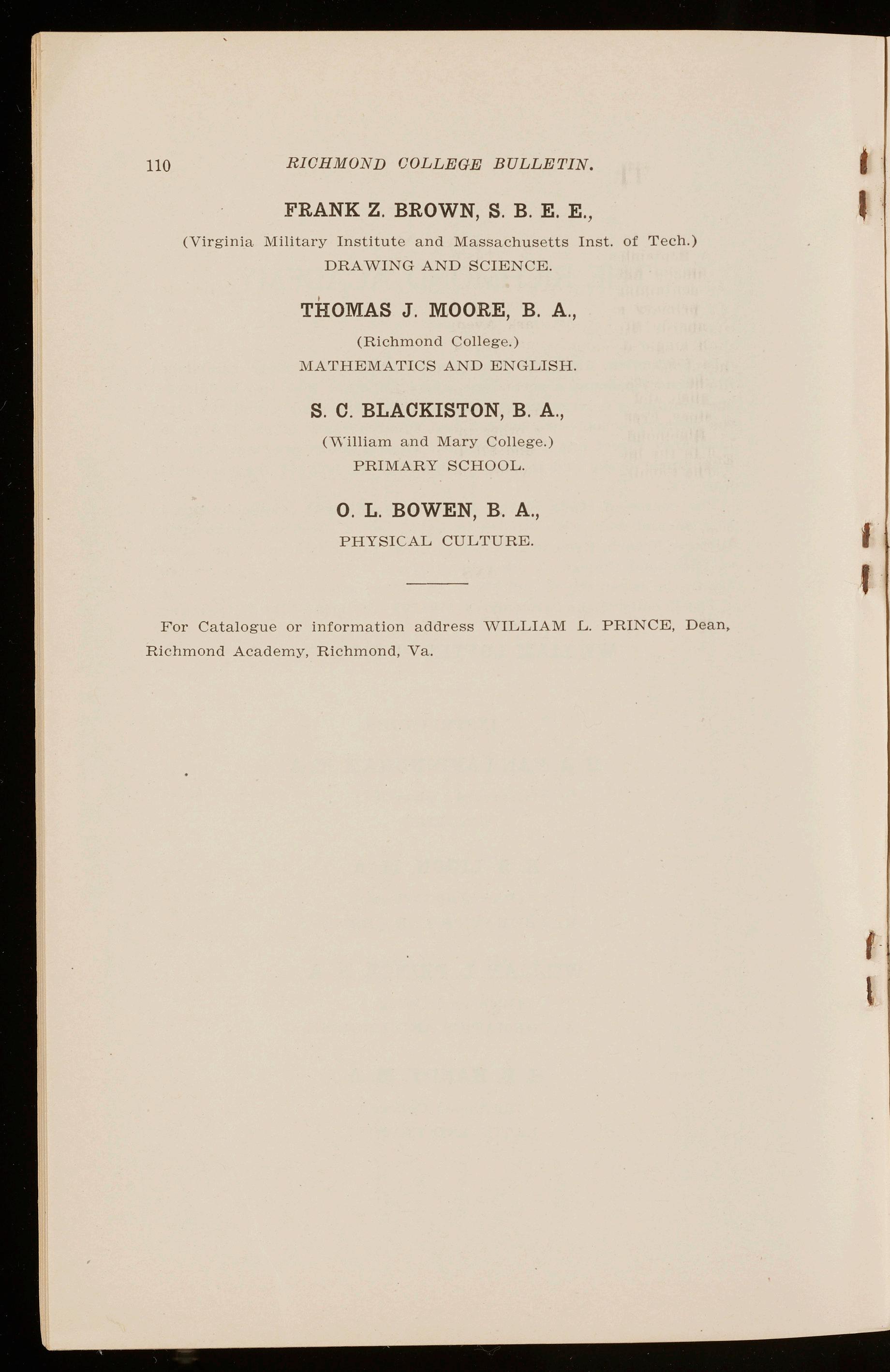
For Catalogue or inform a tion address WILLIAM L. PRINCE, Dean, Richmond Academy, Richmond, Va.
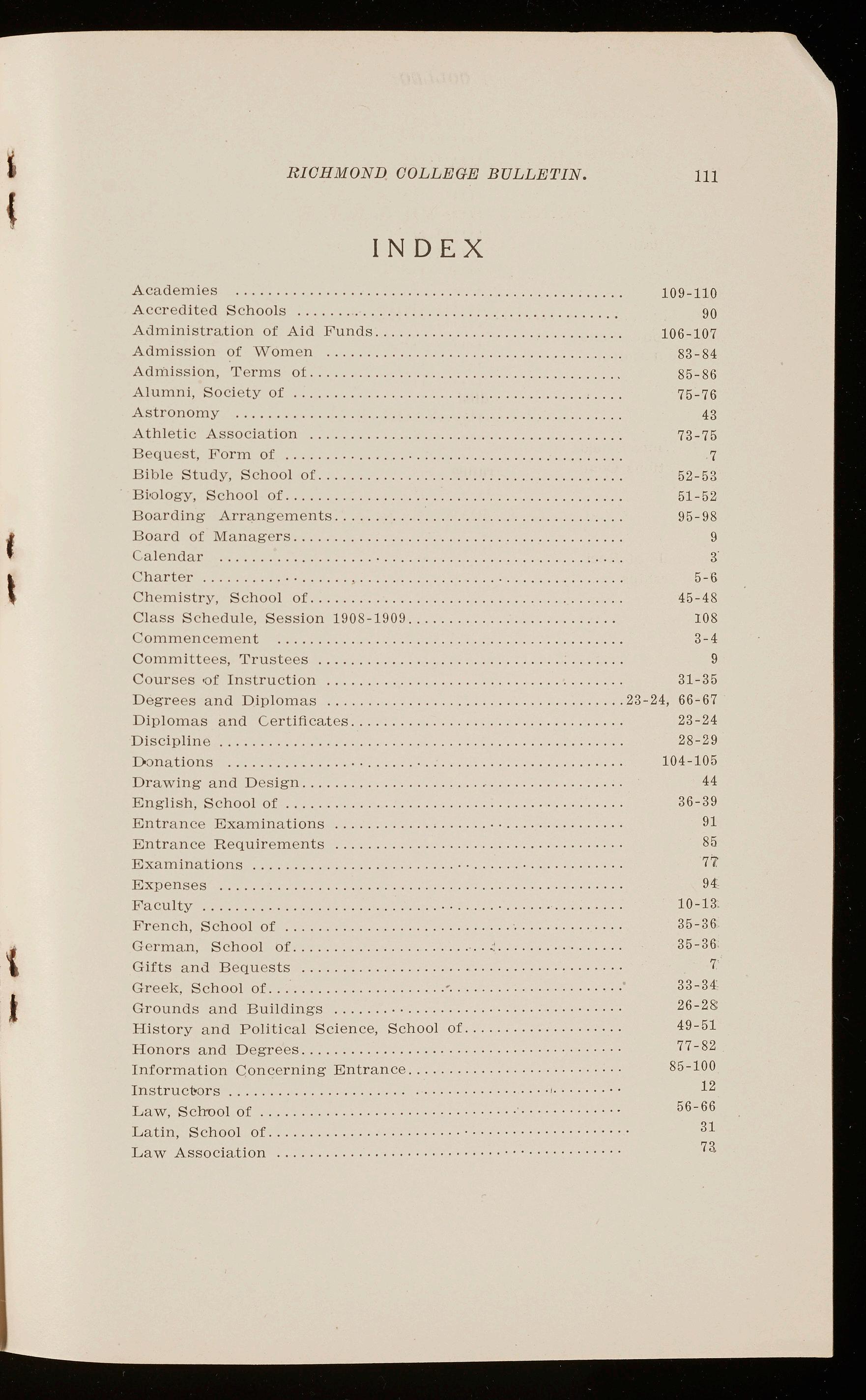
Academies ..... . Accredited Schools ..
Administration of Aid Funds . .. ...................
Admission of Women
Admission, 'l'erms of ..... .. .... . ..... ...
Alumni, Society of .............
Astronomy .. . ......... ..
Athletic Association Bequest, Form of . Bible Study, School of .... Bi•ology, School of Boarding Arrangements Board of Managers .. Calendar .......... . Charter
Ch0mistry, School of ......................... Class
Courses •of Instruction
Degrees and Diplomas .......
Diplomas and Ce rtifi cates .......... Discipline .......
Donations .... .. ...................
Drawing and Design ....
English, School of .................... Entrance Examinations
Entrance Requirements Examinations
Expenses ......
Faculty ..
Frenc h , School of ........
Gcrma.n, School of .
G ift s and Bequests ..
Greek, School of.
Grounds and B uildin gs .......
History a nd Political Science, School of Honors and Degrees
Information Concerning Entrance
Lavv, Sclrool of
Latin, School
Law

Lectures, Thomas ........ ..
Library
Lodgings ........................................
Mathematics, School of .................................. Matriculation
and Candidates
Organization
Philosophy, School of Physical Culture, School of .... .................. Physics, School of
Preliminary Professional Studies
Public Speaking .. ,.................
Reading Room ..................................
Recitation, Sch e dule of Regulations Ooncern ing Entrance .
